BLOG
Find out the hottest updates on what is going on in today's tech and IT compass.

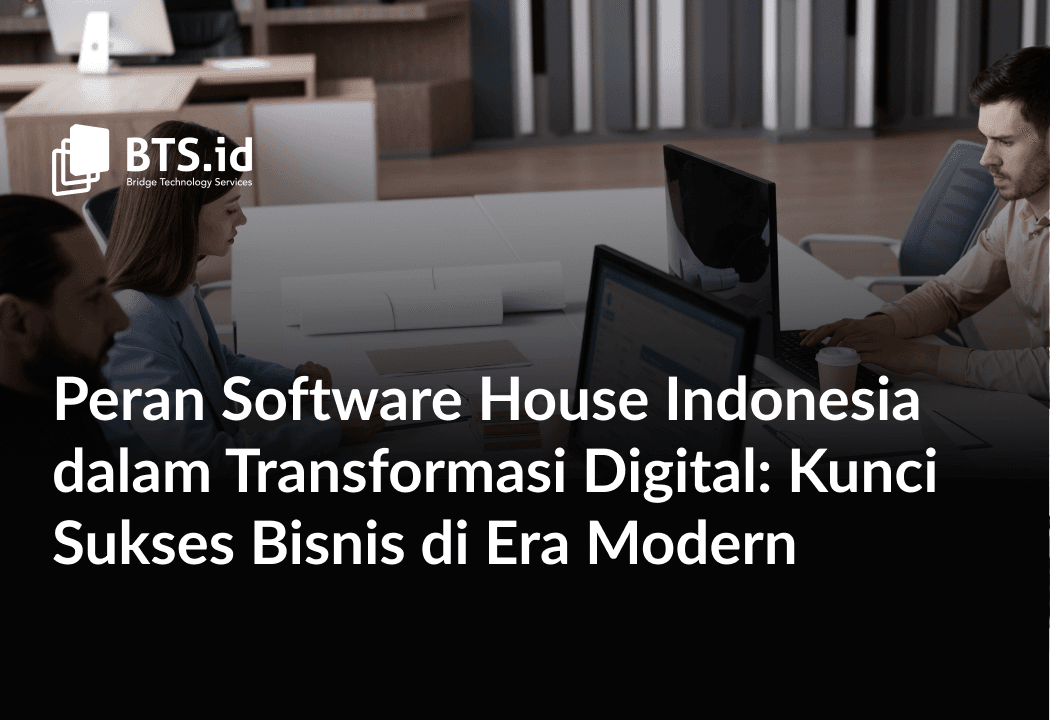
Mengapa Transformasi Digital Penting bagi Bisnis di Indonesia?
Perkembangan teknologi bisnis modern dan perubahan perilaku konsumen mendorong bisnis untuk beradaptasi lebih cepat dari sebelumnya. Di tengah pertumbuhan ekonomi digital yang pesat, perusahaan dituntut untuk menghadirkan layanan yang cepat, efisien, dan terintegrasi. Inilah alasan mengapa transformasi digital menjadi agenda strategis bagi banyak bisnis di Indonesia.
Sebagai software house Indonesia, kami melihat transformasi digital sebagai fondasi utama pertumbuhan bisnis modern.
Digitalisasi bisnis membantu perusahaan meningkatkan efisiensi operasional, mempercepat proses kerja, serta menghadirkan layanan yang lebih responsif dan berbasis data.
Digitalisasi perusahaan Indonesia mencakup implementasi sistem seperti ERP, CRM, cloud computing, hingga otomatisasi proses.
Dengan kebutuhan teknologi bisnis modern yang terus berkembang, perusahaan yang melakukan transformasi digital akan lebih siap menghadapi persaingan dan perubahan pasar.
Bagi kami, transformasi digital bukan sekadar tren, melainkan investasi strategis jangka panjang untuk membangun bisnis yang scalable, kompetitif, dan berkelanjutan.

Software House Indonesia: Pengertian dan Layanan yang Ditawarkan
Di era transformasi digital, kebutuhan teknologi bisnis modern semakin meningkat. Software house hadir sebagai mitra strategis bagi perusahaan yang ingin mengembangkan sistem digital tanpa harus membangun tim IT internal sendiri.
Sebagai pengembang perangkat lunak lokal, software house membantu bisnis merancang dan membangun solusi teknologi yang sesuai kebutuhan.
- Apa Itu Software House Indonesia?
Software house Indonesia adalah perusahaan yang menyediakan layanan pengembangan perangkat lunak untuk berbagai
kebutuhan bisnis. Dengan memahami pasar lokal, pengembang perangkat lunak lokal mampu menghadirkan solusi IT
bisnis yang lebih relevan, efisien, dan scalable. - Layanan Yang Ditawarkan
Berikut adalah layanan utama yang biasanya disediakan oleh software house:- Custom Software Development
Pembuatan sistem khusus web application seperti ERP, CRM, sistem inventori, atau platform internal yang dirancang sesuai alur kerja perusahaan, serta mobile application seperti Cross-platform app (Flutter/React Native), aplikasi android dan iOS, juga maintenance & update aplikasi. Solusi custom memungkinkan perusahaan mendapatkan sistem yang lebih fleksibel, scalable, dan sesuai dengan alur kerja mereka. - Konsultasi IT
Pendampingan strategi teknologi, analisis kebutuhan sistem, serta perencanaan roadmap transformasi digital.
Konsultasi IT membantu bisnis meminimalkan resiko kesalahan investasi teknologi dan memastikan implementasi berjalan efektif. - Cloud & DevOps Services
Implementasi cloud computing, deployment otomatis, monitoring sistem, serta optimasi performa agar aplikasi stabil, scalable, dan siap digunakan dalam jangka panjang. - UI/UX Design
Perancangan tampilan dan pengalaman pengguna agar aplikasi atau website mudah digunakan, responsif, dan meningkatkan konversi bisnis. - System Integration
Integrasi berbagai sistem dan database agar seluruh operasional bisnis berjalan terhubung secara otomatis dan realtime.
- Custom Software Development
- Mengapa Memilih Pengembang Perangkat Lunak Lokal?
- Memahami kebutuhan dan regulasi pasar Indonesia
- Komunikasi lebih mudah dan responsif
- Biaya lebih kompetitif
- Dukungan teknis jangka panjang
Dengan meningkatnya kebutuhan digitalisasi, peran pengembang perangkat lunak lokal semakin penting dalam membantu perusahaan membangun sistem yang modern dan berkelanjutan.
Kelebihan Menggandeng Software House Lokal untuk Proses Digitalisasi
Dalam proses transformasi digital, memilih partner teknologi yang tepat sangat menentukan keberhasilan implementasi sistem.
Menggandeng software house lokal menjadi pilihan strategis karena menawarkan berbagai keunggulan yang relevan dengan kebutuhan bisnis di Indonesia
- Keunggulan Software House Indonesia
Salah satu keunggulan software house Indonesia adalah pemahaman yang kuat terhadap karakter pasar, regulasi, serta budaya bisnis lokal.
Hal ini memungkinkan pengembangan sistem yang lebih tepat sasaran dan sesuai kebutuhan operasional perusahaan.
Selain itu, komunikasi menjadi lebih mudah karena tidak ada kendala bahasa maupun perbedaan zona waktu yang signifikan. - Solusi Teknologi Lokal yang Efektif
Software house lokal mampu menghadirkan solusi teknologi lokal yang disesuaikan dengan kondisi infrastruktur dan kebutuhan industri di Indonesia. Pendekatan ini membuat sistem lebih fleksibel, scalable, dan siap mendukung pertumbuhan bisnis. - Efisiensi Biaya Pengembangan Aplikasi
Dibandingkan bekerja sama dengan vendor luar negeri, menggunakan software house Indonesia umumnya menawarkan efisiensi biaya pengembangan aplikasi. Perusahaan bisa mendapatkan solusi berkualitas dengan anggaran yang lebih terkontrol tanpa mengorbankan standar teknologi. - Dukungan Teknis Berkelanjutan
Keunggulan lainnya adalah dukungan teknis berkelanjutan. Software house lokal dapat memberikan maintenance, update sistem, hingga pengembangan lanjutan secara lebih cepat dan responsif.

Dampak Kehadiran Software House terhadap Inovasi dan Pertumbuhan Bisnis
Kehadiran software house memberikan dampak signifikan terhadap inovasi digital Indonesia dan pertumbuhan bisnis, terutama di era transformasi digital. Melalui pengembangan sistem yang terintegrasi dan berbasis teknologi, perusahaan dapat mempercepat adaptasi terhadap perubahan pasar.
- Dampak Transformasi Digital Bisnis
Software house membantu perusahaan mengimplementasikan solusi digital yang meningkatkan efisiensi, produktivitas, dan kualitas layanan.
Transformasi digital bisnis ini menjadi pondasi utama untuk menciptakan daya saing yang lebih kuat. - Akselerasi Inovasi Perusahaan
Dengan dukungan tim teknologi profesional, perusahaan dapat lebih cepat meluncurkan produk atau layanan baru.
Akselerasi inovasi perusahaan khususnya inovasi digital Indonesia terjadi karena proses pengembangan menjadi lebih terstruktur, berbasis data, dan scalable. - Kolaborasi Bisnis dengan Software House Lokal
Kolaborasi bisnis dengan software house lokal memungkinkan terciptanya solusi yang relevan dengan kebutuhan pasar.
Kemitraan ini tidak hanya fokus pada pengembangan sistem, tetapi juga pada strategi jangka panjang untuk pertumbuhan berkelanjutan.
Kehadiran software house bukan sekadar penyedia layanan teknologi, tetapi mitra strategis yang mendorong inovasi digital Indonesia dan mempercepat pertumbuhan bisnis melalui transformasi digital.
Kriteria Memilih Software House Terbaik di Indonesia untuk Transformasi Digital Anda
Transformasi digital membutuhkan partner teknologi yang tepat agar implementasi berjalan efektif dan memberikan ROI optimal.
Memilih software house tidak bisa dilakukan secara sembarangan, karena kualitas pengembang akan sangat mempengaruhi keberhasilan sistem yang dibangun.
Berikut beberapa tips memilih software house terpercaya yang bisa menjadi panduan:
- Periksa Portofolio dan Pengalaman
- Tinjau portofolio pengembang aplikasi terbaik untuk melihat jenis proyek yang pernah dikerjakan.
- Pastikan memiliki pengalaman di industri yang relevan.
- Cek studi kasus atau testimoni klien sebelumnya.
- Kemampuan Custom Software Development
- Pastikan software house mampu menyediakan solusi yang disesuaikan dengan kebutuhan bisnis.
- Perhatikan apakah sistem yang dikembangkan bersifat scalable dan fleksibel.
- Tanyakan teknologi dan framework yang digunakan.
- Dukungan Teknis dan Maintenance
- Pilih partner yang menyediakan dukungan teknis berkelanjutan.
- Pastikan ada layanan maintenance, update sistem, dan pengembangan lanjutan.
- Transparansi dan Komunikasi Proyek
- Pastikan timeline, biaya, dan ruang lingkup pekerjaan dijelaskan secara jelas.
- Evaluasi responsivitas dan profesionalisme tim.
Saat mencari rekomendasi software house, prioritaskan perusahaan yang tidak hanya unggul secara teknis, tetapi juga memahami strategi transformasi digital dan kebutuhan jangka panjang bisnis Anda.
Memilih software house yang tepat menjadi langkah penting dalam proses transformasi digital perusahaan. Rekomendasi software house terbaik didasarkan pada pengalaman, kualitas hasil kerja, dan kemampuan untuk menghadirkan solusi teknologi yang sesuai dengan kebutuhan bisnis Anda.

Rekomendasi Software House Indonesia
- Prioritaskan perusahaan dengan rekam jejak kuat dalam pembangunan aplikasi web dan mobile.
- Cari partner yang sudah terbukti membantu berbagai klien dari berbagai sektor industri.
- Pertimbangkan software house yang memiliki layanan lengkap, mulai dari konsultasi IT hingga custom software development.
Portofolio Pengembang Aplikasi Terbaik
Portofolio adalah cerminan kualitas dan pengalaman pengembang. Saat memilih software house, pastikan mereka memiliki:
- Proyek yang relevan dengan kebutuhan bisnis Anda
- Studi kasus yang jelas dengan hasil yang terukur
- Testimoni klien yang positif
- Contoh aplikasi yang fungsional, intuitif, dan scalable
Dengan memilih software house yang tepat dan melihat portofolio pengembang aplikasi terbaik, perusahaan Anda akan lebih siap menjalani transformasi digital yang efisien dan berkualitas.
Transformasi digital bukan lagi pilihan, melainkan kebutuhan strategis bagi bisnis yang ingin tetap relevan dan kompetitif.
Dengan dukungan software house Indonesia, perusahaan dapat mengembangkan solusi teknologi yang efisien, scalable, dan sesuai kebutuhan pasar. Kolaborasi yang tepat akan mempercepat inovasi, meningkatkan produktivitas, serta memperkuat daya saing di era digital.
BTS.id adalah salah satu software house di Indonesia, dan salah satu software house Bandung yang terpercaya, merupakan perusahaan yang bergerak di bidang pengembangan perangkat lunak dan solusi IT bisnis.
Sebagai software house Bandung, BTS.id mengembangkan aplikasi, menciptakan perangkat lunak yang disesuaikan dengan kebutuhan spesifik klien, serta menyediakan layanan pemeliharaan, pembaruan, dan perbaikan perangkat lunak.
Kami menawarkan solusi IT bisnis yang memudahkan bisnis anda untuk bertumbuh lebih cepat, efisien, dan aman.
Segera hubungi kami BTS.id sekarang untuk konsultasi IT dan mulai perjalanan transformasi digital bisnis Anda hari ini!
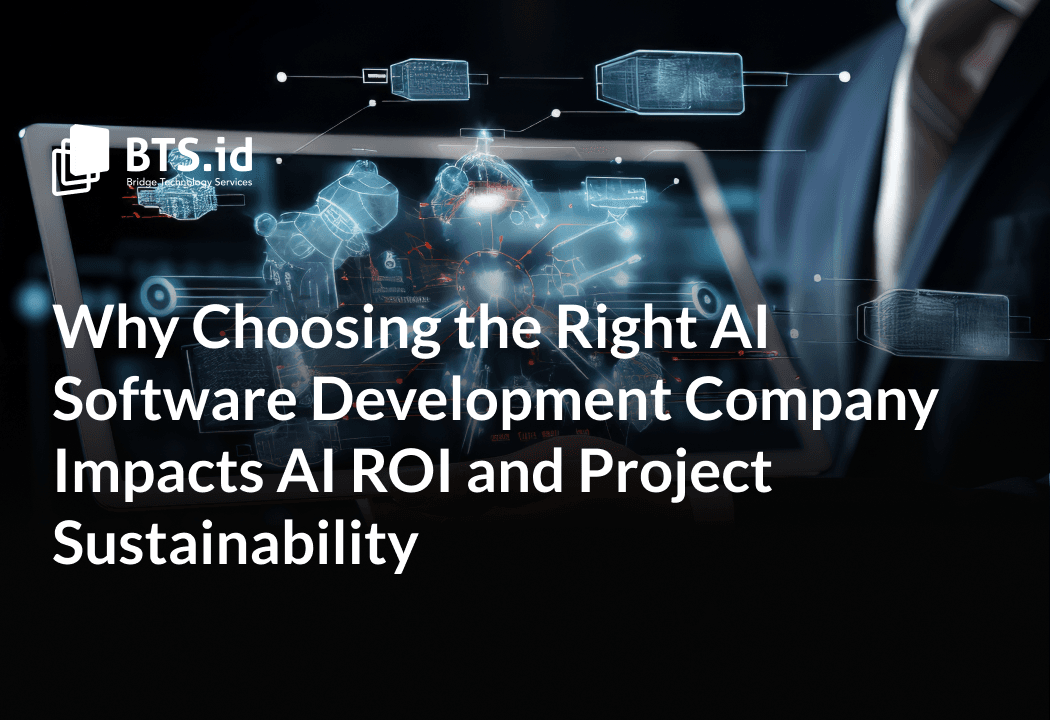
The success of AI implementation depends not only on the models used, but also on the technical foundation behind their development. As an AI software development company, we understand that choosing the right development partner directly impacts AI ROI, system stability, and long-term project sustainability.
Scalable architecture, high-quality data, seamless system integration, and mature MLOps practices are key factors in ensuring that AI solutions operate reliably and deliver long-term business value.
Selecting the right Artificial Intelligence (AI) software development company is a critical strategic decision that has a direct effect on return on investment (ROI) and the long-term success of AI initiatives.
Understanding the Link Between AI Partner Selection and Project Outcomes
The right AI partner does more than just build models, it ensures strategic AI implementation through scalable architecture, reliable data pipelines, and mature MLOps practices. This approach enables AI solutions to grow sustainably and deliver long-term business value.
Why Is AI Partner Selection a Key Factor in the Success of Artificial Intelligence Projects?
- Solution Quality: Aligns business needs with a solid technical foundation from the start.
- AI ROI: Structured development ensures measurable and optimizable results.
- Project Sustainability: Scalable architecture and mature MLOps prevent technical debt.
- Strategic Partner: Acts as a long-term collaborator, not just a service provider.
- Strategic AI Implementation: Ensures seamless integration and real adoption across operations.
As AI becomes a key driver of competitive advantage, the choice of who builds your solution will ultimately determine how much ROI you can achieve.

The Role of Expertise: Quality Matters in Delivering Sustainable AI Solutions
The sustainability of AI solutions is largely determined by the quality of expertise involved throughout the development process.
AI expertise and technical proficiency enable scalable and sustainable AI solutions to be built on the right architecture, secure, robust, and ready to scale in production environments. Supported by experienced development teams, implementation complexity can be managed effectively, technical risks are minimized, and solution quality is maintained throughout the entire development lifecycle.
In addition, strong domain knowledge ensures that AI solutions address specific business needs rather than serving as mere technology implementations. Through strategic AI implementation, scalable solutions can be developed to support long-term growth and enhance AI investment value.
Ultimately, the success and sustainability of AI solutions depend on expertise, team experience, and deep domain understanding. With a solid technical foundation and scalable solutions, AI can evolve into a strategic business asset that delivers long-term value.
Assessing Long-Term Value: How the Right Partner Maximizes Your AI Investment
Assessing the long-term value of an AI project goes far beyond initial implementation. Choosing the right AI partner enables organizations to maximize AI investment value through cost-efficient execution, future-proof solutions, and a results-driven approach. By focusing on scalable and sustainable AI solutions, and and Strategic AI Implementation, AI projects can evolve into business assets that deliver measurable and sustainable impact over time.
- AI Return on Investment (ROI)
The right AI partner helps ensure that AI investments deliver clear, measurable business value and maximize AI Investment Value and AI Project ROI Measurement over the long term. - Cost Efficiency
Well-planned architecture and development processes reduce unnecessary costs and minimize the risk of rework. - Future-Proof Solutions
AI solutions are designed to be scalable and adaptable to technological advancements and evolving business needs. - Maximizing Value from AI Projects
Continuous optimization ensures AI initiatives go beyond one-time projects and continue delivering strategic value. - Measurable Results
A metrics-driven approach and performance evaluation enable organizations to monitor AI impact objectively and consistently, improving AI Project ROI Measurement.
Maximizing AI investment requires more than the right technology—it demands a partner who understands strategy, cost efficiency, and long-term value. With the right AI partner, organizations can ensure every AI initiative delivers measurable ROI, scalable and Sustainable AI Solutions , and sustainable business outcomes through Strategic AI Implementation.
Avoiding Common Pitfalls: What Happens When You Choose the Wrong Development Company?
Choosing the wrong AI development company is often a primary cause of AI project failure. Risks of poor partner selection can lead to architectural flaws, implementation delays, and solutions that are not production-ready. As a result, many AI initiatives end up as failed projects that never move beyond the early stages and turn into wasted AI investments, reducing potential AI project ROI measurement.
Beyond financial losses, the greater impact lies in missed business goals, where AI solutions fail to support business strategy and decision-making. When developers do not provide adequate support and maintenance, AI systems become difficult to maintain, lack scalability, and lose their long-term value. This highlights that selecting the right AI partner is a strategic decision that directly affects the success, sustainability, and delivery of scalable and sustainable AI solutions through Strategic AI Implementation.
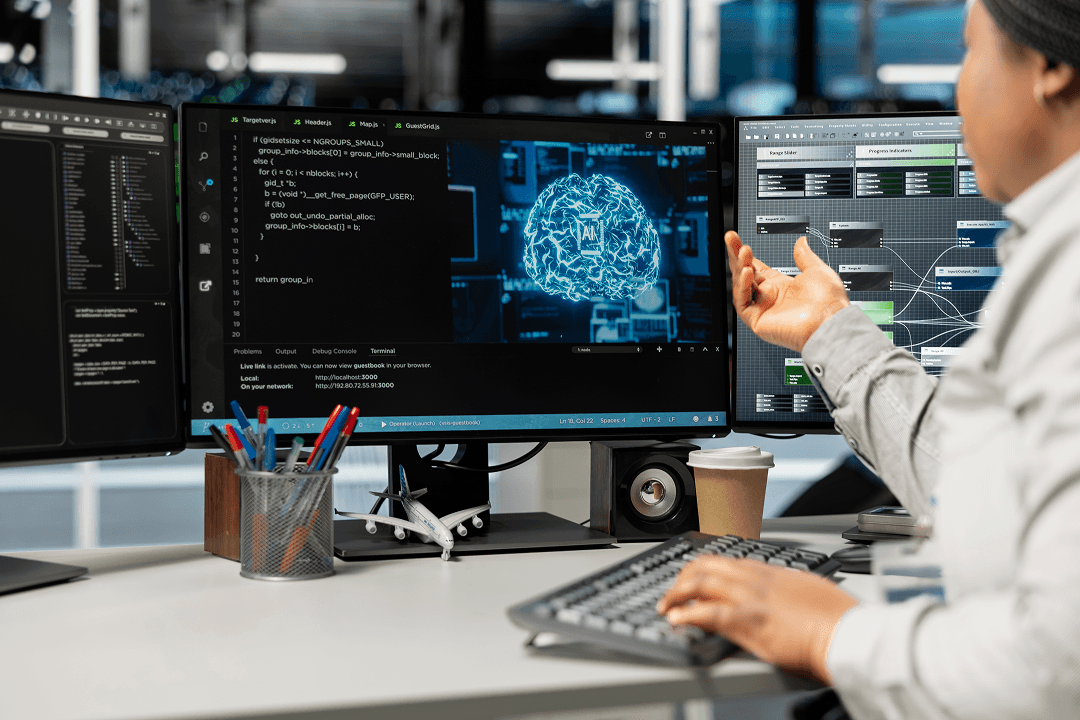
Sustainability in Practice: Ensuring Ongoing Success Beyond Deployment
The sustainability of AI projects does not end once a solution is successfully deployed. To ensure AI continues to deliver business value enhance AI project ROI measurement, a long-term approach is required—one that includes ongoing support, performance optimization, and the ability to adapt to evolving business needs and technological changes. Implementing Scalable and Sustainable AI Solutions ensures AI remains valuable over time.
Key aspects to consider include:
- Sustainable AI Projects
AI solutions are built on stable and scalable foundations to support long-term use. - Long-Term Support Services
Ongoing support helps maintain system performance, security, and reliability. - Continuous Improvement in AI Systems
Regular enhancements ensure models remain accurate, effective, and relevant. - Adaptability to Changing Needs
Adaptive AI solutions are able to evolve alongside business growth and technological advancements.
With the right sustainability strategy in place, AI solutions go beyond post-deployment functionality and continue to deliver consistent, long-term business value.
Criteria for Selecting the Best-Fit AI Software Development Company for Your Business Needs
Choosing the right AI software development company is a strategic step to ensure that AI solutions truly support your business objectives. The evaluation process should not focus solely on technical capabilities, but also on experience, working approach, and alignment with organizational needs.
Key criteria to consider include:
- How to Choose an AI Company
Assess AI partners based on their strategic approach, technical expertise, and understanding of your business requirements. - Evaluating Vendors
Compare AI vendors objectively in terms of methodology, transparency, and long-term delivery capabilities. - Track Record and Case Studies
A proven track record and relevant case studies demonstrate a partner’s ability to address real-world challenges and deliver validated solutions. - Client Testimonials
Client feedback provides insight into reliability, collaboration quality, and overall satisfaction with delivered outcomes. - Alignment with Business Goals
The right AI partner aligns technical solutions with your business strategy and performance targets. - Transparent Communication
Open communication ensures clear expectations, effective risk management, and smooth collaboration throughout the project lifecycle. - Customization Capabilities
Strong customization capabilities allow AI solutions to be tailored to specific needs, avoiding one-size-fits-all approaches.
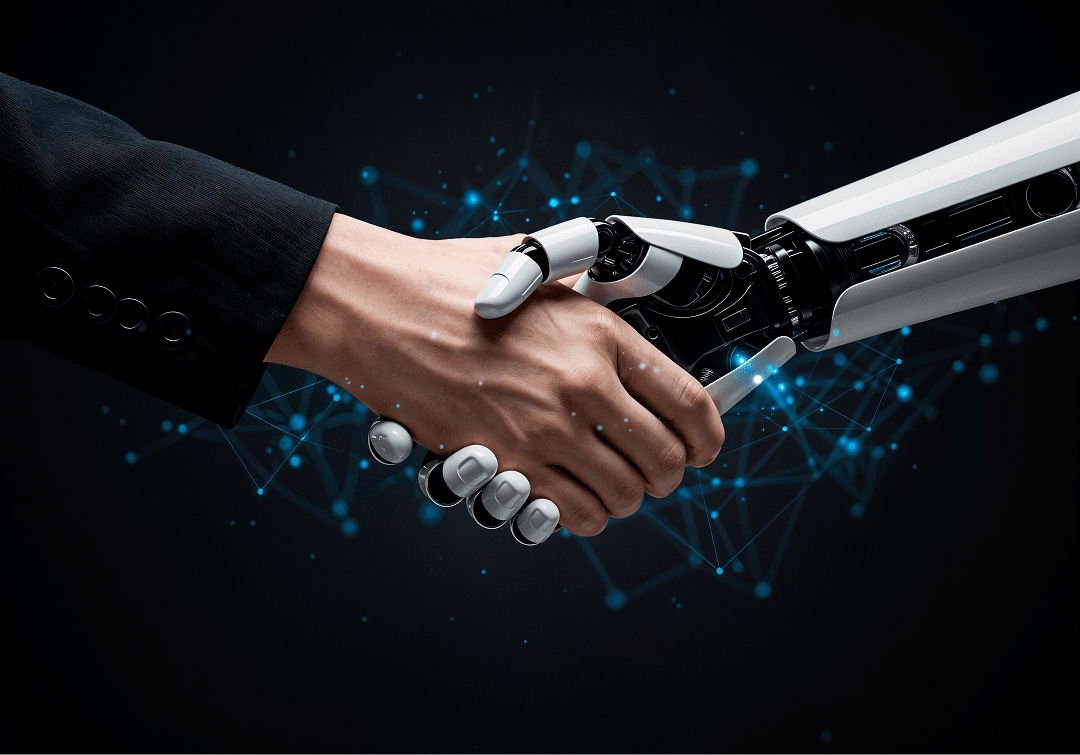
By applying the right criteria, companies can select an AI partner that not only develops technology but also understands the business context. This approach ensures AI solutions are relevant, sustainable, and deliver tangible value for long-term growth.
Choosing the right AI software development partner is a strategic decision that determines the success and sustainability of your AI investment. With a partner that possesses strong technical expertise, industry experience, and deep business understanding, organizations can maximize AI ROI, minimize project risks, and build scalable, sustainable AI solutions. The right approach ensures AI goes beyond a technical project and evolves into a long-term business asset.
If your business is ready to turn AI into a competitive advantage, now is the time to take a strategic step. Consult with our team at BTS.id and start building AI solutions that deliver measurable results and long-term value for your organization.
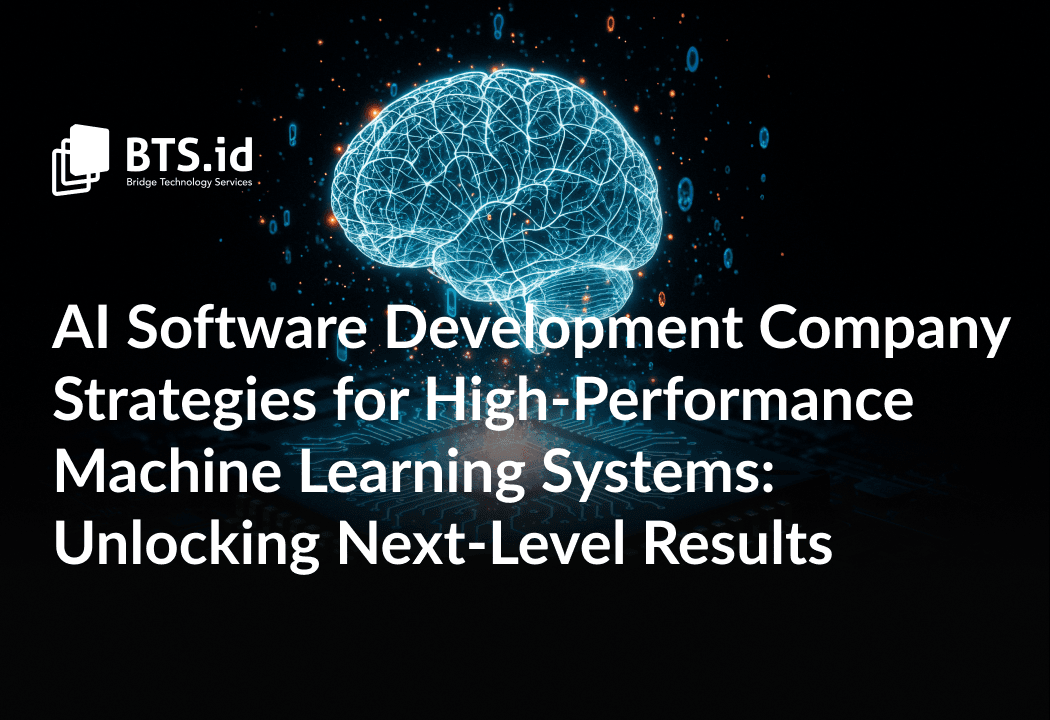
In the era of digital transformation, the success of machine learning (ML) implementation is not determined solely by the sophistication of algorithms, but also by how systems are designed, developed, and integrated into business processes. This is where the role of an AI software development company becomes critically important. Experienced AI software development companies are able to bridge business needs with practical, scalable technology solutions.
AI software development companies play a vital role in ensuring the success of machine learning systems, not only from a technical perspective but also from a business strategy standpoint. They help organizations design machine learning systems that align with real business requirements, covering model selection, data architecture, and scalable infrastructure.
Through custom AI solutions, organizations move beyond one-size-fits-all implementations toward AI systems optimization designed around their unique processes, data assets, and strategic goals. Within enterprise AI development services for business, an experienced AI software development company ensures seamless integration of machine learning systems into complex enterprise environments, while upholding enterprisegrade standards for security, performance, and regulatory compliance.
A structured approach to Machine Learning project management further enables predictable delivery and measurable outcomes. From use case definition and data governance to model validation, deployment, and continuous performance monitoring, an end-to-end delivery model helps enterprises reduce risk, accelerate time-to-value, and maximize return on AI development services for business investment.
In the pursuit of high-performance machine learning systems, data is not simply an input, it is a strategic asset.
Without a robust, scalable, and well-governed data pipeline, even the most advanced ML models fail to deliver consistent results. For enterprises, building a resilient data pipeline is a foundational requirement to ensure long-term scalability, reliability, and sustained business impact from AI initiatives.

- Data Engineering Strategies That Drive Performance
The implementation of effective data engineering strategies enables organizations to manage data flows from multiple sources in a consistent and efficient manner. This includes data ingestion, transformation, and storage processes designed to support analytics and machine learning development services requirements. A welldefined strategy allows ML teams to focus on model development without being constrained by data-related challenges. - Data Preprocessing Best Practices
The performance of machine learning models is highly dependent on the quality of the data they consume. By applying data preprocessing best practices—such as data cleaning, normalization, handling missing values, and outlier detection—data is better prepared for ML algorithms. This stage plays a critical role in improving model accuracy, reliability, and overall stability. - Scalable Data Pipelines for Business Growth
As data volume and complexity continue to grow, machine learning systems require scalable data pipelines that can adapt without compromising performance. Scalable pipelines ensure efficient data processing for both batch workloads and real-time data streaming, enabling ML systems to evolve in line with changing business demands. - Data Quality Assurance as a Reliability Foundation
Without strong data quality assurance, the risk of errors, bias, and inaccurate predictions increases significantly.
Data validation processes, continuous quality monitoring, and automated testing within the pipeline help maintain data consistency over time while strengthening confidence in ML system outputs. - Feature Engineering for Machine Learning
Feature engineering for machine learning development services focuses on transforming raw data into meaningful, high-value features that enhance model learning. Well-designed features enable models to capture critical patterns within the data, leading to improved predictive performance and more efficient training.
Selecting the Right Algorithms and Architectures for Speed and Accuracy
Choosing the right algorithms and architectures is a primary determinant of success in building high performance machine learning systems. This decision directly impacts inference speed, prediction accuracy, and the efficient use of computational resources.
In modern machine learning development services, selecting appropriate algorithms and architectures is essential to achieving the optimal balance between processing speed and model accuracy. These choices have a direct influence on overall system performance, infrastructure efficiency, and the end-user experience
Key Considerations for High Performance Machine Learning Systems
- Algorithm selection strategies
Ensuring that selected algorithms align with data characteristics, system scale, and business objectives—recognizing that more complex models do not always deliver better results. - Neural networks optimization
Optimizing network structure, layer depth, and parameters to enhance performance without slowing down training or inference processes. - Deep Learning architecture
Selecting the right deep learning architectures enables models to efficiently learn complex patterns while maintaining stability in production environments. - Model tuning techniques
Techniques such as hyperparameter tuning, regularization, and early stopping improve model accuracy and generalization capabilities. - High performance machine learning frameworks
High performance ML frameworks support scalable, fast, and reliable model development, training, and deployment.
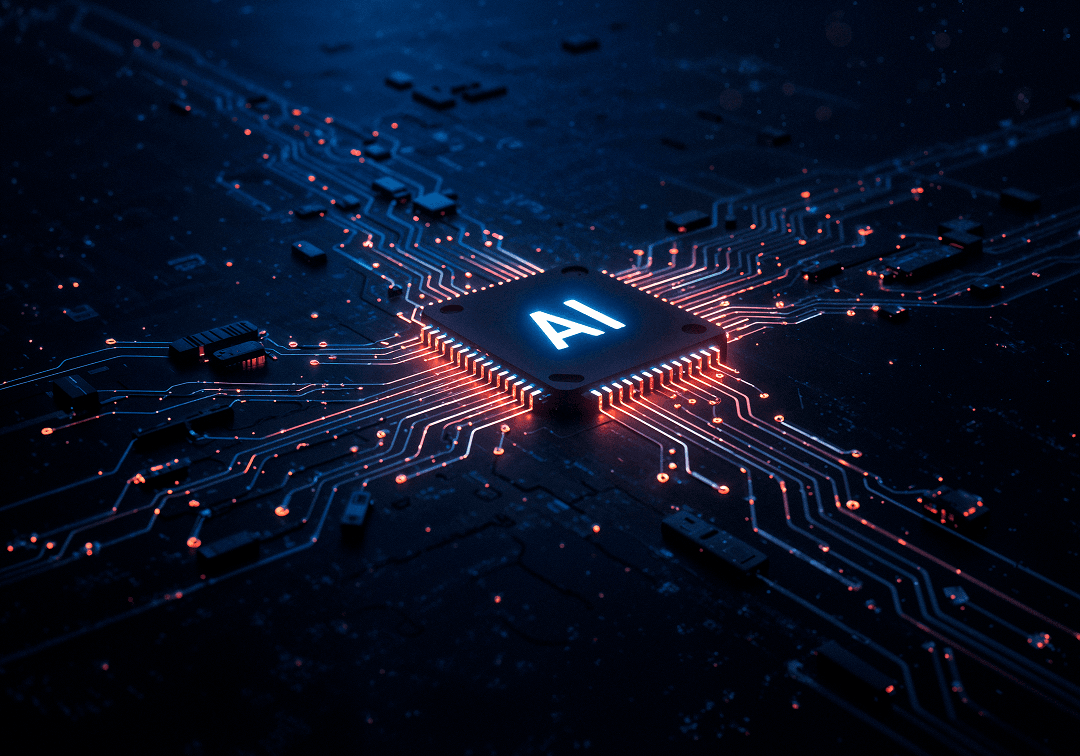
Optimizing Infrastructure for Scalability and Efficiency
In modern machine learning development services, model performance depends not only on algorithms but also on the underlying infrastructure. Optimizing infrastructure for scalability and efficiency is a critical factor in enabling AI systems optimization to grow alongside business demands without introducing excessive cost or complexity.
- Cloud-Based AI Infrastructure
The adoption of cloud-based AI infrastructure allows organizations to access computing resources flexibly and on demand. Cloud environments support rapid ML experimentation, automatic scalability, and seamless integration with data and analytics services—accelerating time-to-market for AI solutions. - GPU Acceleration in ML Systems
For compute-intensive workloads, GPU acceleration in ML systems plays a key role in speeding up model training and inference. By leveraging GPUs, ML systems can process large-scale data more efficiently, particularly for deep learning and complex model architectures. - Distributed Computing for Machine Learning
Through distributed computing for machine learning, computational workloads are distributed across multiple nodes or clusters. This approach improves data processing speed, enables parallel training, and ensures system stability as data volume and user demand continue to grow. - Containerization (Docker/Kubernetes)
Containerization using Docker and Kubernetes simplifies the deployment and management of machine learning systems. Containers ensure consistency between development and production environments, enable easy replication, and enhance security. Kubernetes further supports automated container orchestration for scalability and high availability. - Cost-Effective AI Deployment
Cost efficiency is a critical consideration in large-scale AI implementations. Cost-effective AI deployment is achieved through optimal resource utilization, autoscaling, infrastructure usage monitoring, and selecting cloud services that align with specific ML workload requirements.
Building High-Performance Machine Learning Systems: From Data Pipeline to MLOps Excellence
Amid the rapid adoption of artificial intelligence, many organizations are realizing that building reliable machine learning (ML) systems is not merely about using advanced models.
Machine learning development services success is driven by the combination of robust data pipelines, the right algorithm selection, scalable infrastructure, and mature MLOps practices. Key considerations include the following:
- MLops Workflow Automation
Automating MLops workflows simplifies processes across model training, testing, and deployment, reducing human error and accelerating the ML development lifecycle. - Continuous Delivery for Machine Learning Models (CI/CD)
Implementing CI/CD ensures that machine learning models can be continuously updated, tested, and released into production in a consistent and secure manner without disrupting live systems. - Model Monitoring Tools and Strategies
Real time model performance monitoring enables teams to detect accuracy degradation, data drift, or concept drift easily, ensuring prediction quality remains reliable. - Automated Retraining Pipelines
With automated retraining pipelines, models are regularly updated using the latest data, keeping ML systems relevant and adaptive to evolving data patterns. - Production Grade ML Systems
Mature MLops practices result in production ready ML systems that are stable, scalable, secure, and reliable enough to support long term business needs.

Security and Compliance Considerations in High-Performance AI Solutions
In the development of high-performance AI solutions, security and regulatory compliance are critical elements that must go hand in hand with system performance. Fast and accurate AI systems optimization must still protect data, models, and users from security risks and regulatory violations.
Key considerations include the following:
- AI Security Best Practices
The implementation of AI security best practices includes data protection, strict access controls, data encryption, and safeguarding models against threats such as data poisoning and model theft. These practices ensure AI systems optimization remains reliable without compromising performance. - Compliance in AI Projects (GDPR/CCPA)
In the context of compliance in AI projects, regulations such as GDPR and CCPA require transparent, secure, and responsible data management. Compliance efforts include consent management, data minimization, audit trails, and the ability to explain how data is used throughout AI processes. - Secure Model Deployment Strategies
Secure model deployment strategies ensure that ML models can be operated in production environments without security vulnerabilities. This includes environment isolation through containers, secure API access, runtime monitoring, and strict model version control. - Bias Mitigation in Machine Learning Systems
Beyond technical security, ethical considerations are equally important. Bias mitigation in machine learning systems aims to reduce data and model bias through fairness evaluation, balanced data sampling, and continuous validation ensuring AI outcomes are more equitable and trustworthy.
The success of machine learning system development is not determined by technology alone, but also by effective team collaboration.
- Cross functional teams play a critical role in accelerating innovation by bringing diverse expertise together within a single, integrated workflow.
- In collaborative development teams in AI projects, data scientists, software engineers, ML engineers, and business stakeholders work together from the planning phase through deployment. This collaboration accelerates decision-making, reduces miscommunication, and ensures AI solutions are closely aligned with business objectives.
- The adoption of Agile methodologies for software development companies building ML systems enables rapid iteration, controlled experimentation, and more responsive adaptation to changing data and market demands. Agile approaches also support more efficient and measurable ML development
- In addition, interdisciplinary expertise (data scientist and engineers) ensures that developed models are not only statistically accurate but also system-optimized and production-ready. This cross-functional synergy is a key driver in accelerating innovation and delivering AI solutions with tangible impact.
- Ultimately, faster time to market and business impact are achieved as cross-functional collaboration accelerates the delivery of high-quality AI solutions that generate real business value.
Achieving outstanding machine learning performance requires more than advanced technology alone. It demands proven strategies from robust data management and the right algorithm selection to scalable infrastructure, mature MLOps practices, and strong cross-functional collaboration.
By partnering with an experienced AI software development company, businesses can accelerate innovation, minimize implementation risks, and ensure machine learning solutions are production-ready and capable of delivering measurable business impact. Now is the time to apply the right strategies to build reliable, efficient, and future-ready machine learning systems.
Transform your data into a competitive advantage.
Partner with a trusted AI software development company like us BTS.id to accelerate innovation and deploy production-grade machine learning systems at scale.
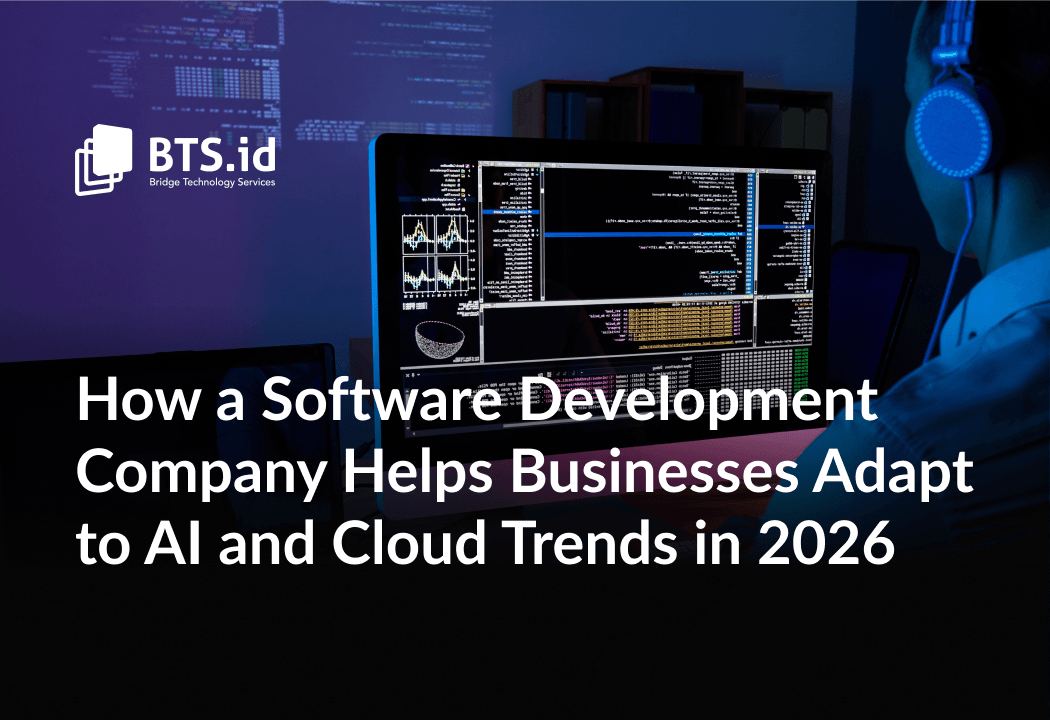
2026 marks a crucial year for software development companies, where Artificial Intelligence (AI) and the cloud are no longer just trends but the core foundations of business transformation.
In business technology trends 2026, business technology will increasingly focus on artificial intelligence, the cloud, and intelligent automation.
Companies are leveraging Artificial Intelligence for faster and more accurate decision making, while the cloud is the foundation for flexible, secure, and easily scalable systems. This technology integration helps businesses improve efficiency, accelerate innovation, and remain competitive amidst rapid market changes. The role of software development companies is not merely as technology vendors, but as strategic partners helping clients adapt and grow in the digital era.
Business technology trends for 2026 will be driven by the acceleration of digital transformation, where companies are transforming their work practices, business models, and services through technology. In this process, businesses must adapt to Artificial Intelligence (AI) to improve efficiency, automation, and decision making quality.
Meanwhile, adopting cloud solutions is a key foundation for more flexible, scalable, and AI-ready business systems.
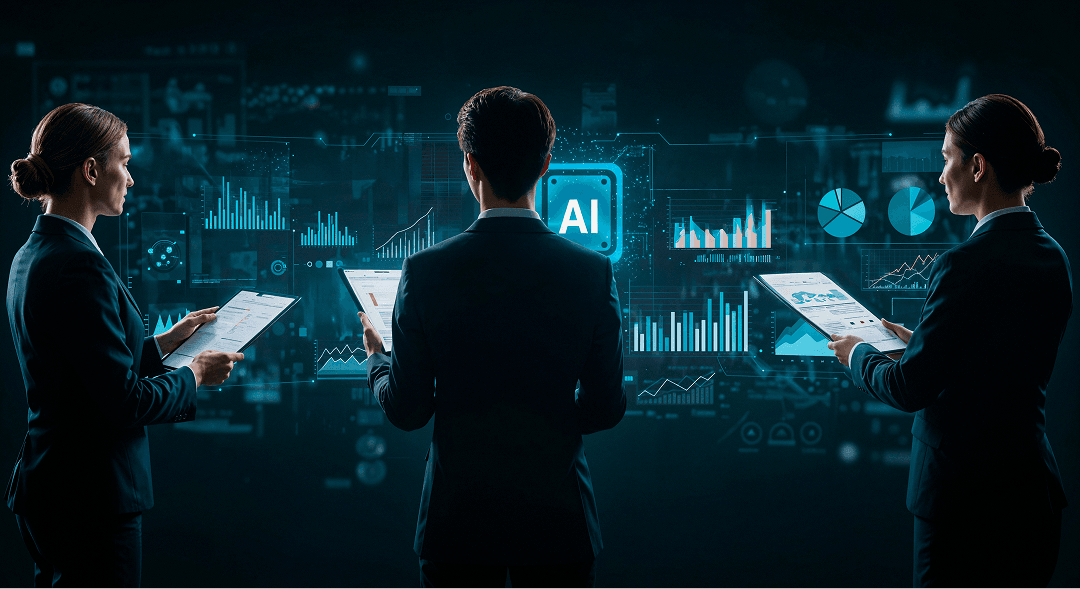
- Business Technology Trends 2026
Business technology trends in 2026 demonstrate a shift from mere technology adoption to strategic technology utilization. Key focuses include:
• Artificial Intelligence (AI) and Generative AI for data analysis, automation, and service personalization.
• Cloud-native and Hybrid cloud as business infrastructure standards
• Hyper Automation to accelerate end-to-end operational processes.
• Zero trust based cybersecurity as digital risks increase.
These trends emerge as businesses are required to be more agile, efficient, and adaptive to market changes. - Adapting to AI
Adapting to Artificial Intelligence means integrating AI into core business processes, such as supply chain, customer service, marketing, and product development, using AI for data-driven decision making, and preparing human resources, processes, and governance for the ethical and effective use of Artificial Intelligence.
Without AI development, digital transformation in 2026 will be slow and suboptimal. - Embracing Cloud Solutions
The cloud is the technical foundation that enables AI and digital transformation to thrive. Its key benefits are:
• Scalability to adapt to business needs.
• Agility in application development and deployment.
• Cost efficiency through a pay-as-you-go model.
• Security and reliability continuously improved by cloud providers.
Without the cloud, AI implementation would be expensive, slow, and difficult to develop.

These four concepts form a mutually supportive ecosystem, where businesses that want to survive and thrive in 2026 must implement AI- and cloud-powered digital transformation, not as a mere technology project, but as a long-term strategy for competitive advantage.
In the ever-evolving digital era, digital transformation is key for businesses to remain relevant and competitive.
In this process, software development companies play a crucial role as strategic partners, helping companies adopt technology effectively and sustainably.
- Software Development Partners as Strategic Partners
As software development partners, software development companies not only build applications but also deeply understand business beads. They collaborate with clients to design technology solutions that align with business goals, improve operational efficiency, and support long-term growth. - Digital Transformation Services for Business Modernization
Through digital transformation services, software development companies help businesses modernize legacy systems, integrate technologies like AI and cloud, and automate work processes. These services enable companies to be more agile, responsive to market changes, and ready to face future digital challenges. - Tech Consulting Firms in Determining Technology Direction
As tech consulting firms, software development companies provide strategic guidance in selecting the right technology. From digital roadmap development and system architecture planning to technology risk management, this role ensures digital transformation is on track and delivers optimal ROI. - Custom Software Solutions for Specific Needs
Every business has unique processes and challenges. Therefore, custom software solutions are a crucial part of digital transformation. Software development companies design custom solutions tailored to their clients' industry and operational needs, ensuring technology truly impacts productivity and competitiveness.
Why Are Software Development Companies Important in Digital Transformation?
In digital transformation, the role of software development companies is crucial for:
- Helping businesses adapt to technological changes.
- Providing scalable and future-ready solutions.
- Strategically integrating AI development and the cloud.
- Increasing efficiency, security, and innovation.
The role of software development companies in digital transformation is crucial for modern businesses. As software development partners, digital transformation service providers, tech consulting firms, and custom software solution developers, they help companies transform holistically, not just following trends, but building a strong digital foundation for the future.
Navigating the Rapid Evolution of AI Technologies
The rapid development of Artificial Intelligence (AI) is transforming the way businesses operate across various industries. To remain competitive, companies need to understand how to leverage AI strategically, not just follow trends.
This is where Artificial Intelligence (AI) integration strategies, AI adoption, and machine learning consulting become crucial.
- AI integration Strategies for Effective Implementation
AI integration strategies help businesses integrate AI into existing systems and processes. This approach ensures AI technology runs in harmony with business infrastructure, from ERP and CRM to analytics systems, resulting in tangible business efficiencies and value. - Artificial Intelligence Adoption as Phased Process
Artificial intelligence adoption is not just about technology, but also organizational readiness. Businesses need to prepare data, human resources, and governance for sustainable AI adoption. A phased approach helps mitigate risks and ensures AI truly supports long-term business goals. - Machine Learning Consulting for Purpose-Built Solutions
Through machine learning consulting, businesses receive guidance in selecting the most relevant AI development models and use cases. Machine learning consultants help design solutions that are accurate, scalable, and aligned with industry needs, ensuring that AI investments deliver optimal ROI. - Automating Business Processes with AI
One of the greatest benefits of AI is automating business processes with AI. From chatbot-based customer service to predictive analytics and operational management, AI helps accelerate workflows, reduce costs, and improve productivity.
Navigating the evolution of AI requires a well thought out strategy and the right technology partners. By combining AI integration strategies, Artificial Intelligence adoption, machine learning consulting, and automating business processes with AI, businesses can maximize AI’s benefits and prepare for the digital future.
Leveraging Cloud Computing for Scalable Growth and Innovation
In an era of accelerating digital transformation, cloud computing has become a key foundation for businesses seeking to achieve scalable growth and drive continuous innovation. Beyond simply moving data to the cloud, the right cloud strategy enables companies to increase agility, cost efficiency, and long-term competitiveness.
Why Cloud Computing Is Key to Business Growth
Cloud computing enables businesses to:
- Adjust system capacity in real time.
- Accelerate product development and launch.
- Reduce reliance on physical infrastructure.
- Support the integration of AI, big data, and automation.
With a pay-as-you-go model, companies can optimize costs while maintaining operational flexibility.
Cloud Migration Services: The Foundation of Digital Transformation
Cloud migration services help companies move applications, data, and workloads from on-premises systems to the cloud in a secure and structured manner.
A well planned migration process includes:
- System and data readiness assessment.
- Determining the migration strategy (rehost, refactor, replatform)
- Post migration security and performance testing.
A successful cloud migration provides system stability while opening up opportunities for further innovation.
Cloud Native Applications: Driving Faster Innovation
Cloud native application development enables businesses to build applications specifically designed for cloud environments. With microservices architecture, containers, and an API-first approach, companies can deploy faster and more flexibly, increase scalability without downtime, and simplify integration with AI and analytics services.
Cloud-native applications are key to improving time-to-market and business responsiveness.
Multi Cloud Environments: Business Flexibility and Resilience
Adopting multi cloud environments allows businesses to use multiple cloud providers for different needs.
Key benefits include:
- Avoiding vendor lock-in.
- Improving systems resiliency and availability.
- Optimizing costs and performance.
A multi-cloud strategy also helps companies meet cross regional regulations and compliance requirements.
Cloud Infrastructure Management: Optimal Operations
Without proper management, cloud computing can become complex. Cloud infrastructure management plays a critical role in ensuring:
- Monitoring systems performance and security.
- Optimizing cloud resources usage and security.
- Enforcing security and backup policies.
Effective cloud management ensures systems remain stable, secure, and efficient as businesses grow.
Cloud Computing as an Innovative Enabler
Cloud computing not only supports growth but also enables innovation. With the cloud, businesses can develop new digital products faster, test ideas through prototyping and experimentation, and integrate AI, IoT, and data analytics in a scalable manner.
This allows companies to innovate without significant infrastructure risk.
Ensuring Security and Compliance Amid New Tech Trends
The rapid advancement of technologies such as artificial intelligence and cloud computing presents significant opportunities for businesses, while at the same time introducing serious challenges related to security and regulatory compliance. In 2026, ensuring digital system security and data protection is no longer merely a technical requirement, but a critical component of long term business strategy.
Within the context of cybersecurity for businesses 2026, cyber threats are becoming increasingly sophisticated, as many attacks now leverage automation and AI-based technologies.
Business systems connected to the cloud and processing large volumes of data require a more proactive security approach.
Zero-trust architecture, real-time threat monitoring, and robust protection of cloud infrastructure have become the new standards for safeguarding business continuity and maintaining customer trust.

As Artificial Intelligence (AI) and cloud adoption increases, regulatory compliance in AI and cloud computing has also become a major focus. Governments and regulators in various countries are tightening regulations regarding data protection, ethical use of AI, and transparency of digital systems.
Businesses are required to ensure that the technology they use complies with regulations from the planning and development stages. A compliance-by-design approach helps companies avoid legal risks while safely accelerating the adoption of new technologies.
Furthermore, implementing data protection strategies is a key foundation for maintaining security and compliance. Effective data protection includes strict access management, data encryption, and reliable backup and recovery mechanisms.
With a well-developed data protection strategy, businesses can minimize the risk of information breaches and ensure data remains secure throughout its lifecycle.
Security and compliance in the new technology era are no longer standalone entities; they are integrated into the overall digital transformation. By leveraging modern security technologies and a structured approach, businesses can innovate with AI and the cloud without compromising security or regulatory compliance.
Ultimately, ensuring security and compliance amidst emerging technology trends is crucial for maintaining a business's reputation, sustainability, and competitiveness. Companies that effectively manage security and regulatory risks will be better prepared to face digital challenges and capitalize on technological opportunities in 2026 and beyond.
The Importance of Custom Solutions Versus Off-the Shelf Tools in 2026’s Market Landscape
As we enter 2026, the business landscape is increasingly competitive, driven by the acceleration of digital transformation. Companies no longer compete solely on price or product, but also on technological capabilities that support speed, efficiency, and innovation. In this context, the choice between custom software development and off-the-shelf software becomes a strategic decision that directly impacts long-term business growth.
- Custom Software vs. Off-the-Shelf Software
Off-the-shelf software is suitable for general needs and rapid implementation, especially for businesses that require instant solutions without custom development. However, this type of software usually has standard features that are not always relevant to unique business processes.
Custom software development is designed around specific business processes and objectives, so the technology fully supports the company's way of working, rather than forcing the business to adapt to the system.
Generic software often limits flexibility as a business grows, due to limitations in customization, integration, and scalability as data volume and complexity increase. Custom solutions are more adaptable to changing business strategies, allowing for the addition of features, the integration of new technologies, and rapid market adaptation. - Tailored Business Solutions
- Adapting technology to a company’s internal workflow helps eliminate unnecessary manual processes and increase team productivity.
- Optimal integration with existing systems, AI, and the cloud allows data to flow seamlessly, supporting advanced analytics and intelligent automation.
- Supports long term scalability and growth because the system is designed to scale as the business grows.
- Improve operational efficiency and data visibility so management can make faster and more accurate decisions.
- Competitive Advantage Through Customization
- Delivers unique features that are difficult for competitors to imitate because solutions are developed based on the company’s internal needs and strategies.
- Increase innovation speed and time to market, enabling businesses to respond to market changes faster than competitors.
- Provides a more relevant and personalized customer experience, which directly impacts customer loyalty and satisfaction.
- Strengthens business positioning in competitive markets, especially in industries with high-tech competition.
- Strategic Value in the 2026 Market Landscape
- High flexibility in the face of technological and regulatory changes, including AI, cloud, and new data policies
- Greater control over data, security, and system roadmaps, reducing reliance on third party vendors.
- More sustainable long term investment, as systems can be continuously developed without requiring a complete platform replacement.
- Technology serves as an enabler of business strategy, not just an operational tool, thus supporting long term growth and innovation.
Choosing the right software development company is a strategic step for businesses in 2026, as technologies like AI, cloud computing and automation become increasingly complex. When choosing a tech partner, companies need to evaluate more than just price and portfolio. Understanding business needs, industry experience, and technological capabilities are key factors in assessing the right candidate.
When evaluating custom software development firms in 2026, it's important to look at their project track record, development approach, readiness for the latest technology trends, and commitment to security and scalability. Furthermore, asking potential vendors questions, such as their work methods, collaboration models, post-launch support, and adaptability, helps businesses select a technology partner capable of not only building solutions but also supporting long-term growth.
In short, choosing the right tech partner means choosing a strategic partner who understands the business vision and is able to deliver relevant, scalable, and future ready technology solutions.
As we enter 2026, business success is crucially determined by a company's ability to future-proof its business technology strategy. Adopting AI and the cloud is no longer just a technology project, but a core strategy for increasing efficiency, scalability, and sustainable innovation.
By partnering with experts for innovation success, businesses can adopt AI and the cloud in a more targeted, secure, and tailored manner. Support from experienced technology partners helps companies mitigate risk, maximize investment value, and build a digital foundation ready to face future technological changes.
Prepare your business for 2026 with the right AI and cloud strategy.
Partner with an experienced custom software development company to build solutions that are scalable, secure, and ready to support long-term growth.
Contact us at BTS.id now, and begin your digital transformation with expert guidance focused on tangible results.
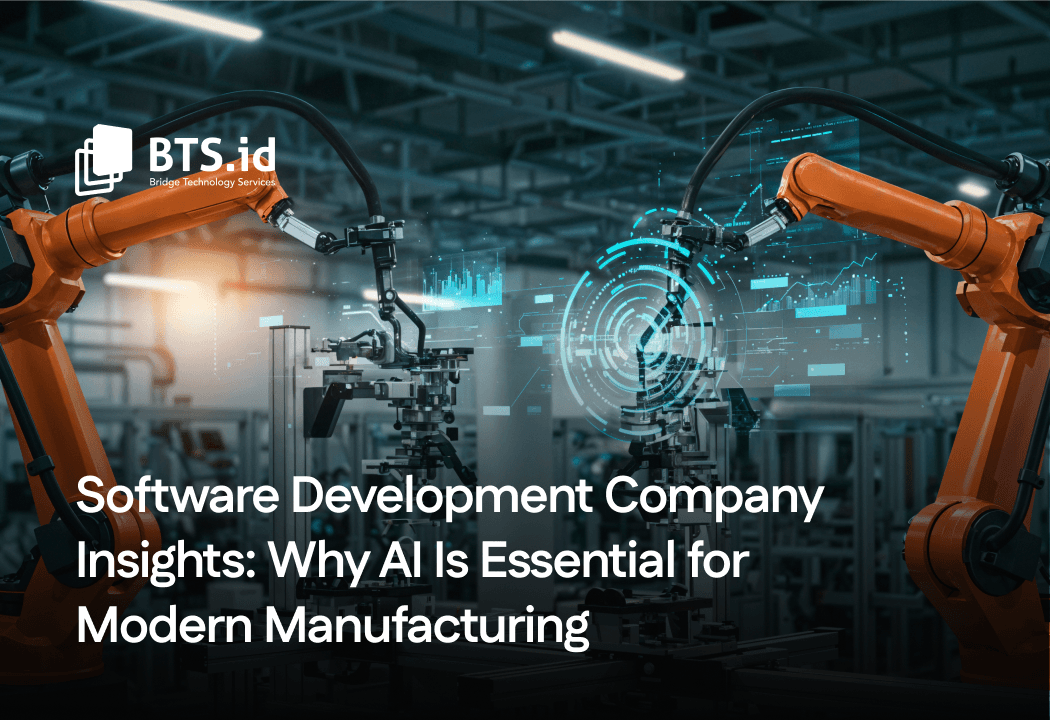
In today’s modern manufacturing landscape, software is a core driver of efficiency, integration, and innovation.
As a trusted software development company, we go beyond building technology, we act as strategic digital transformation partners for manufacturing businesses.
We design and develop custom software solutions tailored to manufacturing operations, including production systems, inventory management, machine integration, and real time data platforms. Our solutions are built to support industry 4.0 initiatives, AI-driven automation, and smart factory environments.
Unlike off-the-shelf software, our custom manufacturing solutions are flexible, scalable, and secure designed to adapt to evolving market demands and operational complexity. Software serves as the critical link between business processes, industrial machines, and data intelligence.
We help manufacturers transform complex operational challenges into reliable, measurable, and future-ready software systems that improve productivity, visibility, and long term competitiveness.
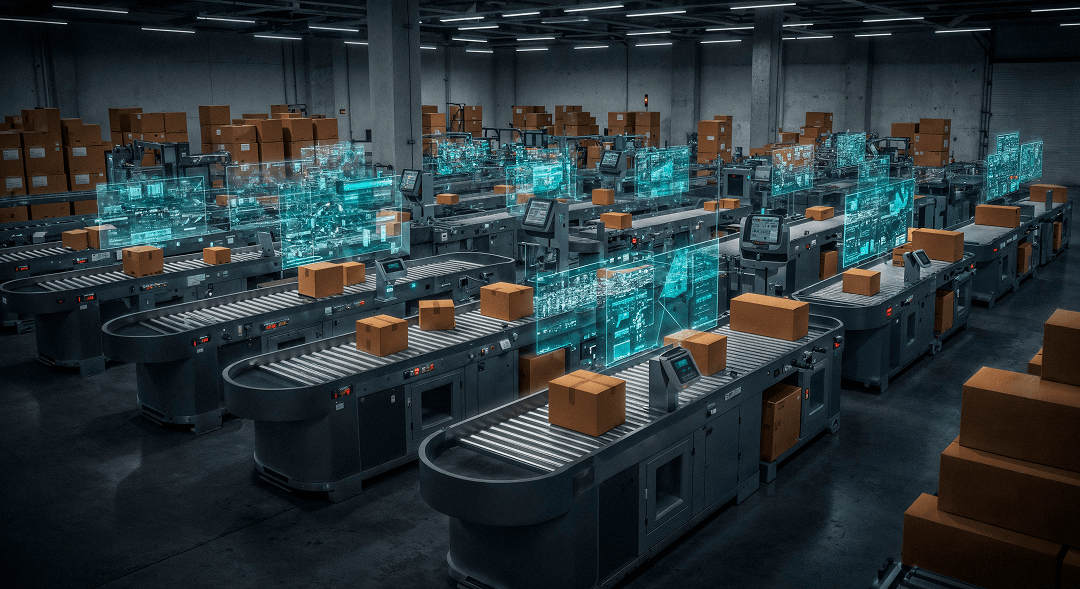
Key contributions of a software development company in modern manufacturing.
- Development of integrated systems such as ERP, MES, and supply chain management tailored to factory workflows.
- Implementation of IoT and AI for real time production monitoring, predictive maintenance, and machine performance optimization.
- Automation and data analytics that enable data-driven decision-making, reduce downtime, and improve product quality.
- System security and scalability to ensure manufacturing operations remain reliable as the business grows.
In modern manufacturing, software development is the core of digital transformation. Without software, digital transformation cannot succeed, as every process from production planning to decision making relies on integrated digital systems.
- Software Development as the Foundation of Digital Transformation
Digital transformation in manufacturing begins with system modernization through software, software enables the digitization of manual processes, cross department data integration, and real time operation visibility. Systems such as ERP, MES, and industrial data platforms form the core foundation of this transformation.
- Software as the Driver of Manufacturing Automation
Manufacturing automation does not rely solely on machines, but on software that controls, orchestrates, and optimizes automated processes. Software plays a key role in:
• Automatically controlling production workflows.
• Integrating machines, robots, and IoT sensors
• Enabling data driven quality control and maintenance.
Without the right software, automation cannot be efficient or scalable.
- Software as the Brain of Smart Factories
Smart factories represent the highest evolution of modern manufacturing, with software acting as the central brain. Through AI development, analytics, and real time monitoring systems, software enables factories to:- Predict machine failures through predictive maintenance.
- Adaptively optimize production processes
- Respond quickly to changing market demands.
- End to End Integration for Future Ready Operations
Custom software development connects the entire manufacturing ecosystem from supply chain and production to distribution into a single integrated system. This creates operations that are more agile, efficient, and prepared to meet future industrial challenges.
Digital transformation provides strategic direction, manufacturing automation delivers efficiency, and smart factories enable operational intelligence. Software development serves as the connecting element between all three, making it a key factor in the success of competitive and sustainable modern manufacturing.
The Rise of Artificial Intelligence in Manufacturing Processes
The manufacturing industry is undergoing a major transformation driven by the increasing adoption of artificial intelligence in manufacturing.
Artificial Intelligence (AI) is no longer merely supporting technology, it has become a core component in creating production processes that are more efficient, intelligent, and competitive.
From automation to data driven decision making, Artificial Intelligence (AI) is reshaping how factories operate in the modern industrial era. Artificial intelligence (AI) plays an increasingly critical role in manufacturing due to its ability to process large volumes of data, identify patterns, and make fast, accurate decisions.
Artificial Intelligence in Manufacturing: The Foundation of Smart Manufacturing
AI development in manufacturing is used to improve production efficiency, product quality, and operational reliability. By leveraging data from machines, sensors, and production systems, artificial intelligence enables manufacturers to analyze production data in real time, identify operational patterns, and continuously optimize processes.
With the right software support, AI development helps increase productivity, reduce human error, and maintain consistent product quality forming the foundation of smart, data-driven manufacturing operations.
Industrial AI Applications for Operational Efficiency
The application of AI in industry spans multiple areas, including:
- Production data analysis to increase output and reduce waste
- Computer vision for automated quality inspection
- Supply chain optimization and production planning
Today, a wide range of industrial artificial intelligence (AI) applications are being implemented across manufacturing environments, from production analytics and computer vision based quality inspection to supply chain optimization.
These applications enable manufactures to make faster, more accurate while simultaneously reducing operational costs. Compared to manual approaches, AI driven solutions deliver greater speed, precision, and consistency in operational decision making.
AI-Powered Production Lines: Adaptive and Flexible Manufacturing
AI-powered production lines can automatically adjust production speed, workflows, and operating parameters based on real time data. The result is a production process that is more flexible, consistent, and capable of responding to changing market demand without compromising product quality.
By adapting dynamically to machine conditions, market demand, and material availability, AI-powered production lines, supported by intelligent software, become more scalable, resilient, and ready to handle the rapid pace of modern industrial change.
Predictive Maintenance: Reducing Downtime with AI
One of the most significant benefits of AI development in manufacturing is predictive maintenance. By analyzing historical data and current machine conditions, AI can predict potential failures before they occur.
This approach helps manufacturers reduce unexpected downtime, lower maintenance costs, extend asset lifespan, and improve overall operational reliability.
The Role of a Software Development Company in AI Manufacturing
As a software development company, we design, develop, and integrate AI solutions tailored to manufacturing needs. From industrial data processing and custom AI system development to seamless integration with ERP and MES platforms, software plays a critical role in ensuring successful AI adoption in modern factories. The rise of artificial intelligence (AI) in manufacturing processes marks a major shift towards smarter, more efficient, and data driven factories.
Key benefits of Integrating AI with Manufacturing Systems
Integrating Artificial Intelligence (AI) with manufacturing systems has become a strategic move for companies aiming to improve operational efficiency and competitiveness. By leveraging AI-driven efficiency, automation and real time data analytics, modern manufacturing operations can become smarter, faster, and more accurate.
Some of the key benefits include:
- AI-Driven Efficiency in Manufacturing Process
The first key benefit is AI-driven efficiency, which enables manufacturing systems to automatically optimize production processes based on real time data. AI helps streamline workflows, reduce bottlenecks, and improve machine utilization. The result is higher productivity without the need for significant additional resources. - Cost Reduction Through Automation
One of the primary benefits of AI integration is cost reduction through automation. AI reduces reliance on manual processes, minimizes human error, and lowers operational costs. In addition, AI-powered automation helps manufacturers reduce downtime, material waste, and unplanned maintenance expenses - Improve Product Quality with AI
Another important benefit is improved product quality with AI development, achieved through consistent quality monitoring and analysis. Using technologies such as computer vision and machine learning, AI can detect product defects in real time and ensure quality standards are consistently met.
This leads to higher customer satisfaction while reducing defects and rework. - Real-Time Data Analytics for Faster Decision-Making
AI integration enables real-time data analytics that provide full visibility into production conditions.
Data from machines, sensors, and production systems are analyzed instantly to support faster and more accurate decision-making. With data-driven insights, manufacturers can proactively respond to issues and opportunities. - The Role of Software Development Companies in AI Integration
Software development companies play a critical role in integrating AI into existing manufacturing systems. Through custom solution development, ERP and MES integration, and the deployment of secure and scalable AI technologies, software developers ensure that AI delivers measurable and sustainable business impact.
Challenges and Considerations When Implementing AI Solutions
Although Artificial Intelligence (AI) offers significant benefits to the manufacturing industry, its implementation comes with various challenges. Understanding AI integration challenges, data security in manufacturing, effective change management, and workforce upskilling is essential to ensure that Ai adoption is successful and sustainable.
Here is a detailed explanations:
- AI Integration Challenges in Manufacturing Systems
One of the main challenges is integrating AI with existing manufacturing systems. Many companies still rely on legacy systems that were not designed to support modern AI technologies. Without proper software architecture planning, this integration can lead to technical complexity, operational disruption, and limited scalability. - Data Security in Manufacturing
AI implementation requires large volumes of data, including sensitive production and operational information. Data security in manufacturing environments is a critical concern due to the increasing risk of data breaches and cyberattacks. AI systems must be built with high security standards to protect data and ensure uninterrupted factory operations. - Change Management for Manufacturers
AI-driven transformation is not only a technological shift but also a cultural one. Change management becomes a major challenge for manufacturers accustomed to conventional processes. Without clear communication and a structured adoption strategy, internal resistance can hinder the successful implementation of AI. - Workforce Upskilling with AI
AI adoption demands new skills from the workforce. Workforce upskilling with AI is essential to ensure employees can work effectively alongside intelligent technologies. Training and skills development are required to help teams leverage AI optimally, rather than feeling threatened by automation.

Software development companies play a critical role in helping manufacturers overcome these challenges through artificial intelligence strategy planning, custom software development, secure system integration, and support for change management and technical training. This approach ensures that artificial intelligence (AI) is not only implemented, but also delivers real and measurable business value.
Implementing AI solutions in manufacturing requires technological readiness, strong data security, effective change management, and workforce development. With the right strategy and the support of an experienced software development company, these challenges can be transformed into opportunities to build smarter, more efficient, and future-ready manufacturing operations.
The Role of Software Development Companies in Enabling Smart Manufacturing
Smart manufacturing lies at the core of industry 4.0, where digital technologies, automation, and artificial intelligence (AI) are integrated to create intelligent and adaptive manufacturing processes. In this transformation, software development companies play a strategic role as key enablers, bridging business needs, technology, and factory operations.
As technology partners, software development companies do more than build applications. They help establish sustainable digital foundations. With expertise in software engineering, AI, and industrial system integration, software development companies ensure that smart manufacturing delivers tangible business value.
- Custom Software Solutions for Industry 4.0
Every enterprise manufacturing company has unique processes, challenges, and business objectives. Therefore, custom software solutions for Industry 4.0 are essential to the success of smart manufacturing. Software development companies design tailored solutions such as ERP, MES, and IoT platforms that align with factory workflows, ensuring systems are flexible, scalable, and future-ready. - Collaboration with Software Developers as a Key to Transformation
Smart manufacturing cannot be achieved through technology alone, it requires close collaboration with software developers. Through a collaborative approach, software development companies help manufacturers translate operational needs into integrated digital solutions that are easy for internal teams to adopt and scale. - End to End Automation Services for Integrated Operation
Software development companies provide end to end automation services, covering requirements analysis, system architecture design, software development, and machine and data integration. This end-to-end approach ensures manufacturing processes run automatically, efficiently, and seamlessly within a unified digital ecosystem. - Tailored AI Implementation Strategies for Manufacturing
Implementing Ai in smart manufacturing requires a precise and measurable strategy. Tailored AI implementation strategies enable manufacturers to adopt AI gradually, based on their technological and business readiness. Software development companies play a key role in identifying high-impact AI use cases such as predictive maintenance, quality inspection, and production optimization
The role of software development companies is crucial in enabling smart manufacturing. Through custom software solutions, strategic collaboration, end to end automation services, and tailored AI implementation, manufacturers can accelerate digital transformation and remain competitive in the industry 4.0 era.
Future Trends: How AI Will Continue to Shape the Manufacturing Sector
Artificial Intelligence (AI) will continue to be a key driver in the evolution of the manufacturing industry. As technology advances and efficiency demands increase, the future of smart manufacturing will rely even more
on the integration of AI, data, and intelligent digital systems.
Software development companies play a vital role in adopting and integrating future AI technologies into manufacturing systems. Through custom software development, AI and IoT integration, and future-ready system architectures, software development companies help manufacturers remain relevant, agile, and competitive in a rapidly evolving industrial landscape.
Below are key trends shaping the future of AI-driven manufacturing:
- Future of Smart Manufacturing
The future of smart manufacturing is defined by factories that are increasingly autonomous, connected, and adaptive. AI enables manufacturing systems to monitor, analyze, and optimize production processes in real time. With scalable software support, factories can respond to changes in market demand with greater speed and precision. - Emerging Technologies in Factories
A range of emerging technologies in factories will accelerate manufacturing transformation, including generative AI, digital twins, intelligent robotics, and edge computing. These technologies enable production process simulations, improved machine efficiency, and more accurate data-driven decision-making. - Industrial IoT and Machine Learning Trends
Trends in Industrial IoT (IIoT) and machine learning will further strengthen connectivity and intelligence within manufacturing systems. IoT sensors collect data from machines and production environments, while machine learning analyzes this data to identify patterns, predict failures, and optimize operational performance. - Adaptive Supply Chains Powered by AI
Ai will also shape adaptive supply chains that are more flexible and responsive. Through predictive analytics and AI-driven forecasting, manufacturers can manage inventory more effectively, anticipate supply chain disruptions, and rapidly adjust distribution strategies based on real-time market conditions.
Artificial intelligence (AI) will continue to shape the future of the manufacturing sector through smart factories, emerging factory technologies, the integration of IIoT and machine learning, and adaptive supply chains. With the right digital strategy and the support of a software development company, manufacturers can leverage these trends to create sustainable long term competitive advantage.
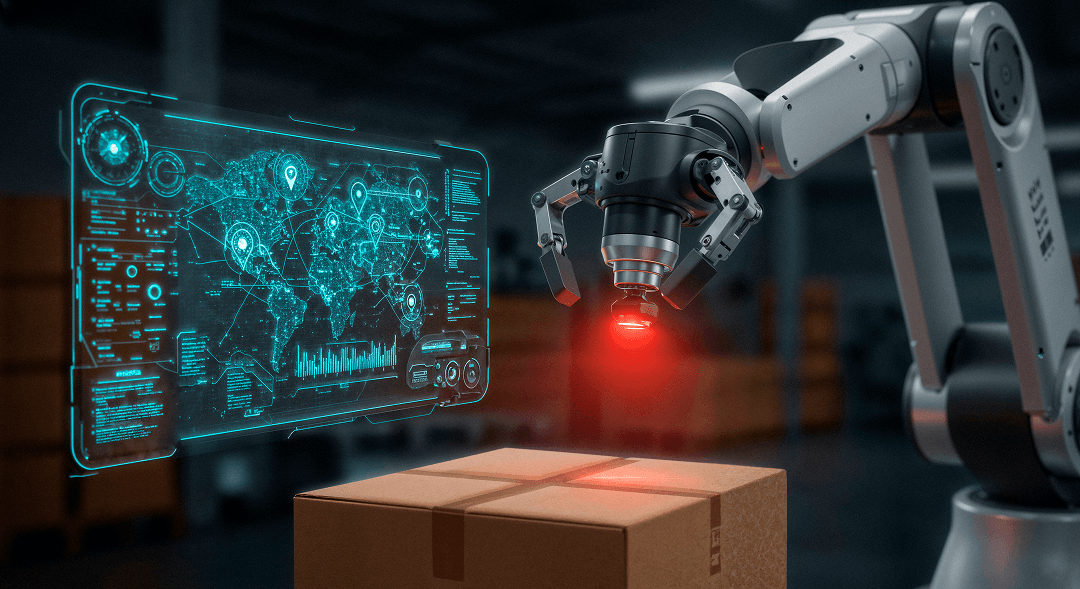
Conclusion: Leveraging Expert Software Development and Advanced AI for Competitive Advantage in Manufacturing
In the face of increasingly intense industry competition, enterprise manufacturing companies must position an
AI-driven innovation strategy at the core of their business transformation. The effective use of AI and software
development not only improves operational efficiency but also unlocks opportunities for continuous
innovation.
- AI-Driven Innovation Strategy as the Foundation of Competitiveness
An AI based innovation strategy enables manufacturers to optimize production processes, improve product quality, and accelerate decision making. With a well planned approach, AI becomes a key enabler for creating long term business value and market differentiation. - Choosing the Right Digital Transformation Partners
The success of digital transformation heavily depends on selecting experienced digital transformation partners. A software development company acts as a strategic partner, designing digital architectures, integrating AI into manufacturing systems, and ensuring solutions are scalable, secure, and future ready. - Staying Competitive Through Technology Adoption
In the Industry 4.0 era, staying competitive through technology adoption is no longer optional, it is essential. Manufacturers that proactively adopt AI, IoT, and automation technologies are better prepared to respond to market changes, supply chain disruptions, and evolving customer demands. - Next Steps Toward Smart Manufacturing Solutions
The next steps toward smart manufacturing solutions begin with assessing digital readiness, identifying high impact AI use cases, and collaborating with software development companies that understand industrial requirements. This phased approach ensures transformation efforts are effective and deliver measurable result
By combining expert software development capabilities with advanced AI technologies, enterprise manufacturing companies can build a strong and sustainable digital foundation. This is the key to achieving competitive advantage, driving innovation, and ensuring long-term relevance in the future of the manufacturing industry.
Ready to Accelerate Your Smart Manufacturing Journey?
Partner with us BTS.id an expert software development company to unlock the full potential of AI-driven manufacturing.
From custom software solutions to advanced AI implementation, we help you build scalable, secure, and futureready manufacturing systems.
Talk to our experts today, and take the next step toward smarter, more competitive manufacturing.

In 2026, software development companies are positioned at the forefront of rapid digital innovation, playing a critical role in shaping how modern businesses operate and compete. As organizations encounter increasingly complex operational challenges and significantly higher user expectations, we are witnessing a major shift toward solutions that are not only smarter and faster, but also deeply integrated across ecosystems.
Generative AI is redefining how applications are built and optimized, cloud-native architecture ensures unmatched flexibility and scalability, hyperautomation streamlines processes end-to-end with unprecedented efficiency, and zero-trust security has become a non-negotiable requirement in protecting digital assets.
For software development companies, 2026 tech trends are more than just technological advancements, they represent a new standard in delivering value.
Clients now expect digital products that can evolve quickly, integrate seamlessly, and withstand constant security threats. This places development teams in a strategic position, not only to adopt new technologies, but to proactively guide businesses through digital transformation, helping them build future-ready systems that accelerate growth, improve resilience, and maintain a competitive edge in an ever-changing landscape.
The 2026 tech trends will have a significant impact on the evolution of software development.
The evolution of software development is a journey from the early days of computers to the modern era, marked by technological advancements and paradigm shifts. It refers to how the processes, technologies, and methods of software creation have continuously changed over time.
From writing machine code directly, it progressed to high-level programming languages, and now it is moving toward faster methodologies like Agile and DevOps, while integrating advanced technologies such as AI/ML, microservices, and low-code/no-code platforms.
The evolution of software development is closely linked to digital transformation, with both driving each other. Digital transformation requires companies to accelerate innovation, automate processes, and provide better digital experiences. To meet these demands, software development must evolve to become faster, more flexible, and smarter.
The digital transformation that necessitates software evolution will impact technological advancements such as AI, machine learning, cloud computing, IoT, robotics, and automation. These advancements make business processes faster, more efficient, smarter, and more connected. Companies can create new products, enhance services, and respond to market changes more effectively. Technological progress is a key driver of both digital transformation and the evolution of software development.
Some of the 2026 tech trends, which represent the latest custom software developments that every company should know in 2026, are:
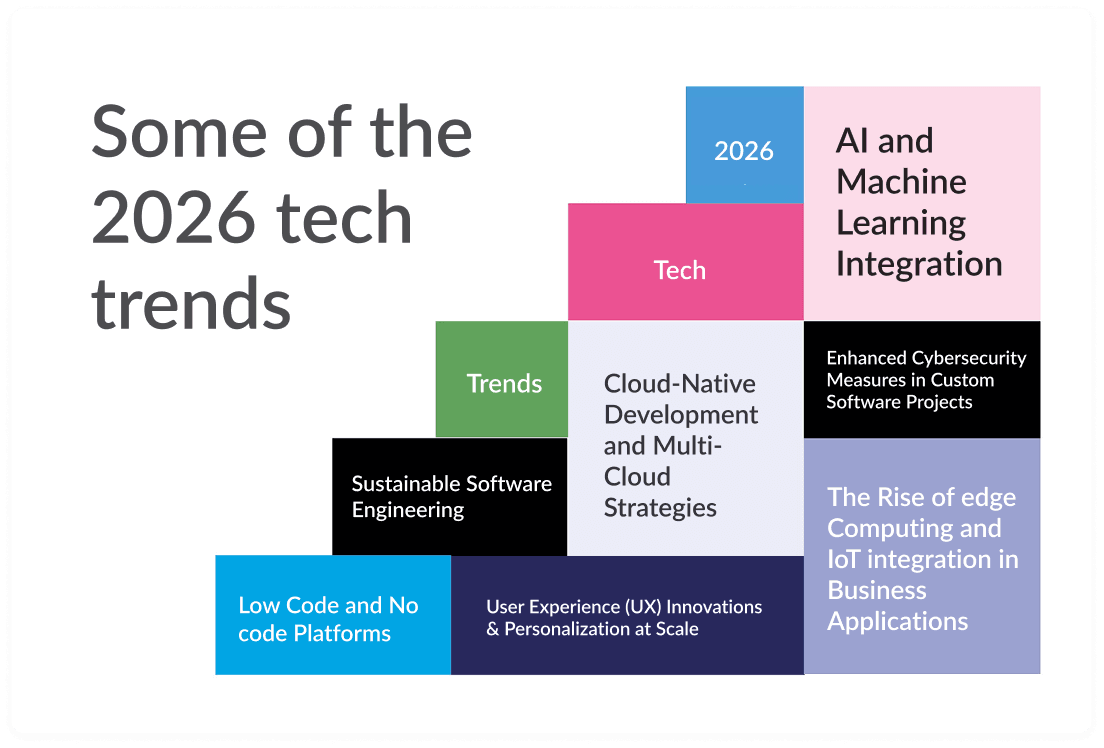
- AI and Machine Learning Integration: Shaping the Future of Custom Solutions
The integration of AI and machine learning into custom software solutions enables systems to become smarter, more automated, and capable of learning from data. This represents a transformative trend in the technology industry, where Artificial Intelligence (AI) and Machine Learning (ML) are no longer just additional features but core components of custom-designed software solutions tailored to meet specific business needs.
With these technologies, applications can:
• Predict user needs,
• Automate complex processes,
• Provide real-time recommendations,
• Improve the accuracy of business decisions.
Overall, AI and ML are shaping the future of custom solutions by delivering software that is more personalized, efficient, adaptive, and data-driven, making businesses more competitive in the digital era.
The four elements that from the core, mutually supportive components in AI and machine learning integration are as follows:- AI in Custom Software
Provides intelligence to applications, enabling software to understand context, analyse data, and respond intelligently. - Machine Learning Applications
Allows software to learn from data continuously improve accuracy and performance over time. - Intelligent Automation
Automate processes with AI/ML-based decision-making capabilities, rather than merely following static rules. - Predictive Analytics
Use ML algorithms to predict trends, risks, and future needs, making software more proactive.
- AI in Custom Software
- Low Code and No code Platforms: Accelerating Application Delivery
Low code and no code platforms are technologies that enable application development with minimal coding (low code) or even no coding at all (no code). These technologies will become highly important in 2026 as businesses increasingly demand applications that are fast, flexible, and easily customizable.
These platforms help businesses accelerate innovations, improve internal processes, and respond to market needs without waiting for lengthy development projects. In short, low code/no code offers an effective way to speed up application delivery in the 2026 era.
In shaping the modern application development ecosystem in 2026, there are four related elements:- Low Code Platforms 2026: Low code platforms provide visual tools and ready-to-use components, allowing developers to write minimal code. By 2026, these platforms will become the standard for accelerating enterprise software projects.
- No Code App Builders: Used by non-technical users to create applications without coding. They are an essential part of the low code/no code trend, expanding internal innovations capabilities within companies.
- Rapid Application Development (RAD): Low code and no code directly support RAD, a methodology focused on building applications very quickly, with instant prototyping and rapid iteration.
- Citizen Developers: These are users who leverage no code or low code to build applications, including:
• Operational staff,
• Marketing,
• Finance,
• HR.
• Product managers.
They can create their own solutions without waiting for the IT team.
These four elements accelerate innovation together, reduce the developer’s workload, and enable companies to release applications faster in 2026.
- Cloud-Native Development and Multi-Cloud Strategies
Cloud native development is an approach to building applications directly in the cloud environment using technologies such as microservices, containers, and serverless computing. This approach makes applications more scalable, faster, and easier to update.
Meanwhile, multi cloud on a single vendor, increase flexibility, and ensure systems remain operational even if one service experiences downtime.
Both trends are important in 2026 because they help companies build applications that are more resilient, efficient, and ready to grow in line with modern business needs.
The four interconnected components that form a modern cloud modernization ecosystem in 2026 are:
• Cloud Native Apps: A new way to build modern applications.
• Serverless Architecture: A part of cloud native that makes development more efficient.
• Multi Cloud Solutions: A deployment strategy that maximizes flexibility and resilience.
• Cloud Migration Trends 2026: The main driver prompting companies to adopt cloud native and multi cloud models.
These are key pillars that help businesses build applications that are more scalable, flexible, and future-ready in the 2026 era.
- Enhanced Cybersecurity Measures in Custom Software Projects
In 2026, security will be a top priority in custom software development. Companies are increasingly implementing advanced protections such as end-to-end encryption, multi layer authentication,
AI-based threat detection, and compliance with global standards. The goal is to protect sensitive data, prevent cyberattacks, and ensure applications are secure from design through deployment.
The following four key components are the main focus for modern companies:- Cybersecurity Best Practices 2026
The latest standards, such as zero trust, AI-based threat detection, end to end encryption, and continuous monitoring, ensure applications remain secure against evolving to achieve. - Secure Software Development Lifecycle (SSDLC)
Security is integrated into every stage of development. With SSDLC, vulnerabilities can be identified faster, mitigation costs are lower, and compliance is easier to achieve. - Data Privacy Regulations
Global and regional regulations require companies to handle data securely and transparently.
This drives the implementations of privacy by design, strict access controls, and regular audits in custom software. - Threat Detection Tools for Custom Solutions
AI/ML based tools help detect anomalies, block threats in real time, and provide proactive protection against modern attacks.
In 2026, security must be a foundational element of custom software development. By combining best practices, SSDLC, privacy compliance, and threat detection technologies, companies can build secure, modern solutions ready to face the risks of the digital world.
- Cybersecurity Best Practices 2026
- The Rise of Edge Computing and IoT integration in Business Applications
Edge computing processes data directly on devices or near the source, rather than in the cloud, making applications faster, more responsive, and efficient. When combined with IoT (Internet of Things), businesses can manage smart devices, sensors, and machines in real time.
This trend is important in 2026 because it helps companies enhance automation, accelerate decision making, and create smarter, more connected business applications.
• Edge computing trends 2026: Data processing closer to devices for high speed and efficiency.
• IoT-enabled solutions: Interconnected smart devices and sensors supporting business automation.
• Real-time data processing: Businesses can make instant decisions through rapid analytics at the edge.
• Connected devices integration: Integrating various devices for smarter, more responsive operations.
Edge computing accelerates data processing, IoT provides a network of data generating devices, and their integration allows companies to create smarter, more responsive, and scalable applications. The year 2026 will be an era where businesses rely on these technologies to improve efficiency, automation, and real time decision making capabilities.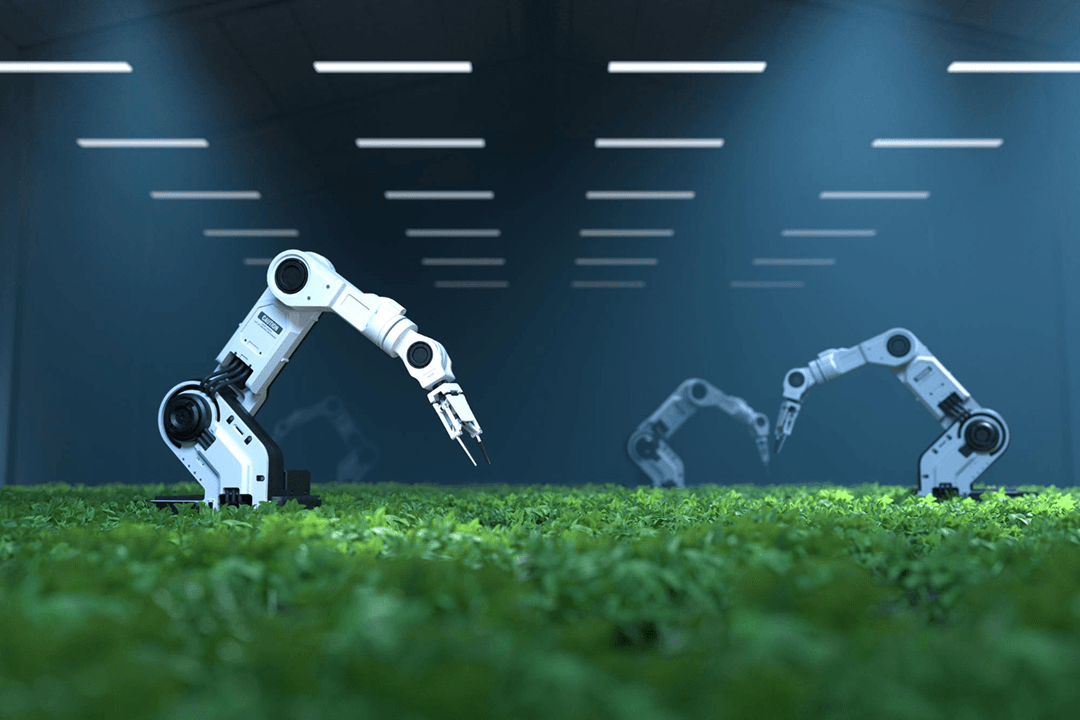
- User Experience (UX) Innovations and Personalization at Scale
In 2026, UX innovation is no longer just about attractive design, but about how applications deliver truly relevant experiences for each user. Technologies such as AI, machine learning, and data analytics enable companies to create personalization at scale without compromising performance.
UX innovations provide more intuitive interfaces, adaptive navigation, and more human-like interactions.
Meanwhile, personalization at scale uses real time data to automatically tailor content, recommendations, and features to the needs of each user.
• UX design trends 2026 drive applications to be more intuitive, minimalist, and responsive, focusing on user comfort.
• Personalized user interfaces for custom apps leverage AI and real-time data to display content, recommendations, and layouts tailored to each user’s needs.
• Customer-centric development strategies ensure the entire development process focuses on the user experience, aligning personalization with UX innovation.
These elements create custom applications that are more personal, relevant, and satisfying, serving as a key business differentiation in 2026.
- Sustainable Software Engineering: Green IT Initiatives Gaining Momentum
Sustainable software engineering is an approach to custom software development that focuses on energy efficiency, reducing carbon, footprints, and using more environmentally friendly resources. By 2026, more companies are adopting Green IT initiatives such as optimizing cloud infrastructure, writing energy efficient code, and designing efficient architecture to reduce power consumption.
The goal is to create software that is lighter, more efficient, and sustainable, while supporting corporate environmental targets.
• Sustainable software practices 2026: Focus on reducing carbon footprints and improving energy efficiency in application development.
• Green coding techniques: Writing lightly, resource efficient code that minimizes computational waste.
• Energy efficiency application design: Application architectures that optimize the use of servers, cloud resources, and devices.
The practices create software that is more efficient, environmentally friendly, and sustainable.
- Navigating Regulatory Compliance in a Changing Digital Network
In the 2026 tech trends, companies must adapt to new regulations related to data, security, and privacy. Software development now needs to consider standards such as GDPR, PDPA, HIPAA, or other local regulations.
The goal is to ensure applications are secure, legally compliant, and able to adapt to continuously evolving regulations, helping businesses avoid legal risks and data breaches.
• Software compliance requirements 2026: The latest software compliance requirements in 2026 demanding stricter security, privacy, and data management.
• GDPR updates for developers: GDPR updates that developers must understand to ensure applications comply with privacy standards and user data protection.
• Industry specific regulations for bespoke software: Industry specific rules (healthcare, finance, government, etc) that must be applied in custom software.
Together, these form a modern compliance framework that companies must follow to keep custom software secure, legal, and regulation-ready in constantly changing digital work.

To face 2026, companies need to embrace innovation to stay relevant and competitive. Future-proofing your business with 2026 tech trends means preparing your business by following trends such as AI, cloud native, IoT, and modern cybersecurity, making systems more adaptive and ready for rapid changes.
Meanwhile, staying competitive through innovation adoption emphasizes the importance of strategically adopting new technologies not just following trends, but truly integrating them into business processes and software development.
The outcome is that organizations can build smarter, more efficient, and sustainable custom solutions while maintaining a competitive position in an increasingly dynamic digital era.
Digital transformation is no longer optional. It is a necessity.
With the latest trends such as AI/ML, cloud-native, low-code/no-code, and modern cybersecurity, companies ready to innovate will lead the market.
Take the first step now: contact our team at BTS.id for strategic consultation and discover how custom software solutions can support your company’s sustainable business growth.
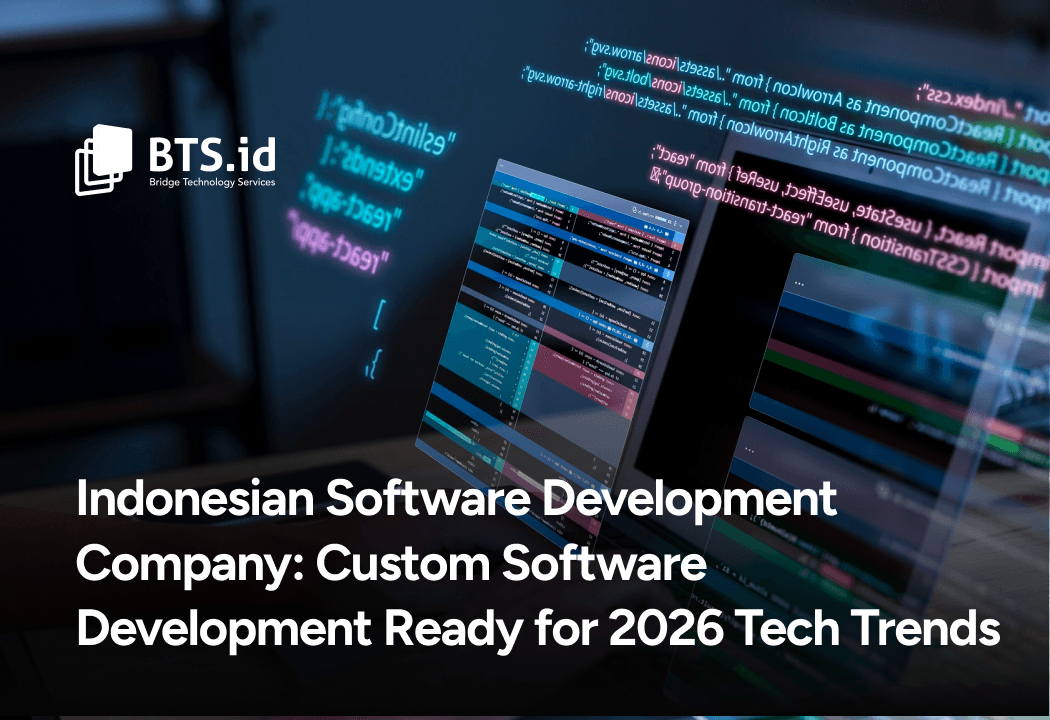
Entering 2026, artificial intelligence (AI) continues to evolve from merely a supporting tool into a core foundation of global digital transformation that Software development companies must certainly adapt to this 2026 tech trend. Development such as generative language models, intelligent process automation, more efficient machine learning, and AI’s growing ability to understand context are becoming increasingly mature.
The Evolution of AI towards 2026 is making artificial intelligence increasingly smarter, autonomous, and integrated into nearly every business process, from automation and analytics to decision making. What once considered an experimental technology has now become the backbone of digital strategies across companies, public institutions, and research organizations. AI applications are now present in nearly every domain, from customer communications and process automation to executive-level decision making support.
AI is no longer making processes longer only, it is beginning to shape how businesses make decisions, innovate, and create more personalized customer experiences.
This directly impacts how software development companies operate, the service they offer, and the value they deliver to clients.
Some of these impacts include:
- Building software that is already prepared for and compatible with AI technologies
- Accelerating development processes using AI-powered tools
- Offering AI solutions to clients (chatbots, automation, data prediction)
- Ensuring software architecture is flexible and scalable for future

Some of the key drivers behind the 2026 AI development trends are:
- Machine Learning
In this case, advancements in machine learning are the primary force behind AI development trends in 2026. Larger, more efficient ML models that can understand various types of data (text, images, audio, video) will make AI in 2026:
• Smarter and more versatile
• Able to run on small devices (edge all)
• Cheaper and faster to use
• Increasingly automated through AI agents
• Safer and more transparent due to a stronger focus on Responsible AI
The advancement in Machine Learning today shapes how AI will work, evolve, and be utilized in the 2026 tech trend.
- Predictive Analytics
Predictive analytics is a key driver of AI trends in 2026 because it enables AI to automatically predict behaviors, needs, and risks. This makes systems more proactive, quicker in decision making, and capable of working in real time.
For software development companies, this capability is crucial because businesses increasingly need applications that can provide automatic recommendations, predict demand or risks, and optimize processes based on data.
In short, predictive analytics is the foundation of AI in 2026, and software development companies have to be able to integrate it so their products remain relevant and competitive.
- Software Development Innovations
Software development innovations are closely tied to AI trends in 2026, as the software development process is becoming increasingly automated, faster, and smarter thanks to AI development. Applications being built must also be AI-ready and easy to integrate with analytics, automation, and AI models.
For software development companies, this means they have to use AI to accelerate coding and testing, build applications that are ready for AI integration, and offer AI-based solutions to remain competitive.
Software development innovation is being driven by AI in 2026, and software companies need to adapt, or risk being left behind.

Businesses need AI to operate faster and smarter, which means they require custom software and enterprise applications built with AI features such as prediction, automation, and analytics. From this need, automation tools emerge to simplify operational processes.
All of this has become an essential part of digital transformation strategies, as companies shift toward more efficient, data driven systems that are ready for the future.
Several related elements, AI integration in business, custom software development, enterprise AI apps, automation tools, and digital transformation strategies, are interconnected as a unified technology ecosystem in 2026.
- AI Integration in Business
AI integration becomes the main foundation for businesses in 2026.
Businesses need AI to:
• Increase efficiency
• Gain deep insights from data
• Enable automated decision-making
This drives the demand for software that is AI-ready.
- Custom Software Development Solutions
Because every business has unique needs, companies require custom software development that:
• Supports AI
• Can process real-time data
• is scalable for future technologies
This means software development companies have to build solutions that are natively AI-ready.
- Enterprise AI Apps
Large companies no longer want ordinary applications, they want enterprise-grade apps equipped with
AI capabilities, such as:
• Predictive analytics
• Process automation
• Intelligent recommendations
• Real-time monitoring
• AI agents for daily operations
All of these become part of custom enterprise solutions.
- Automation Tools
Automation tools are a direct result of AI integration.
In 2026 tech trend, automation tools include:
• Workflow automation
• Customer automation
• Operational automation
• Software development automation (AI coding/test)
These innovations increase productivity and operational efficiency for businesses.
By 2026 tech trend, Artificial Intelligence (AI) is predicted to become an essential foundation in core business operations, no longer just an auxiliary tool. Its main impacts will include increased efficiency, smarter datadriven decision-making, and fundamental transformation of business models. The year 2026 is expected to be a turning point for companies that integrate AI into their core strategies. The following trends are likely to determine success or failure in future business competition.
- Generative AI and Multimodality
Generative AI is no longer limited to producing text, it can now generate images, video, audio, and various other types of output within a single system (multimodal), while also leveraging synthetic data and simulations for product development and testing. This technology has a significant impact on businesses, from accelerating and personalizing marketing content, simplifying prototyping and market testing through synthetic data, to creating more immersive customer experiences.
- Edge AI & Smart IoT
Edge AI is the process of performing artificial intelligence computations directly on local devices such as sensors, cameras, or IoT devices, instead of always relying on the cloud, by leveraging advanced sensors and low-latency networks. This enables real-time response, reduces bandwidth and communication costs, and enhance data privacy and security since data does not need to be transmitted off the device
- AI Infrastructure Focused on Inference
This shift marks a move from heavy investment in training AI models to leveraging pre-trained models for continuous, real-time predictions. The inference process becomes a critical part of daily business operations, from serving users and processing transactions to running automation and responding to customers, where performance, speed, and cost efficiency heavily depend on how this process is managed.
- Process Automation and Collaborative AI Agents
Intelligent automation, which combines RPA (Robotic Process Automation) and AI with support from multi-agent systems capable of collaborating to complex workflows automatically, is applied across various business functions such as back-office operations, finance, logistics, inventory, and document processing, as well as customer service through AI agents. These agents can understand context from multiple data sources, take action, and coordinate across modules such as chatbots, voice systems, and recommendation engines.
- Focus on Cost Efficiency and AI ROI
This trend arises because many companies have adopted AI but have yet to achieve optimal results. As a result, business focus is now shifting toward measuring ROI and creating real value through targeted strategies, such as starting with pilot projects before scaling, applying AI to areas with the greatest challenges, and optimizing operational efficiency through automation of repetitive tasks.
Industry specific artificial intelligence (AI) applications are revolutionizing various sectors by providing tailored solutions for specific challenges, enhancing operational efficiency, and driving innovation. These advanced AI solutions from predictive maintenance in manufacturing to faster medical diagnostics in healthcare are fundamentally changing the way businesses operate.
This means that more sophisticated AI technologies are being applied specifically across industries to improve efficiency, productivity, and innovation.
Example include:
- Healthcare: AI assists in faster diagnoses, reading medical scans, and predicting diseases.
- Finance: AI is used for fraud detection, risk analytics, and customer service automation.
- Retail: AI development predicts demand, personalizes product recommendations, and optimizes inventory management.
- Manufacturing: AI automated productions, monitors machinery, and prevents breakdowns (predictive maintenance)
- Transportation & Logistics: AI plans optimal routes, predicts delivery needs, and supports autonomous vehicles.
- Education: AI enables adaptive learning tailored to each student’s needs.
AI is not only used in general applications but is also customized for the specific needs of each industry, driving significant transformations in how these sectors operate.
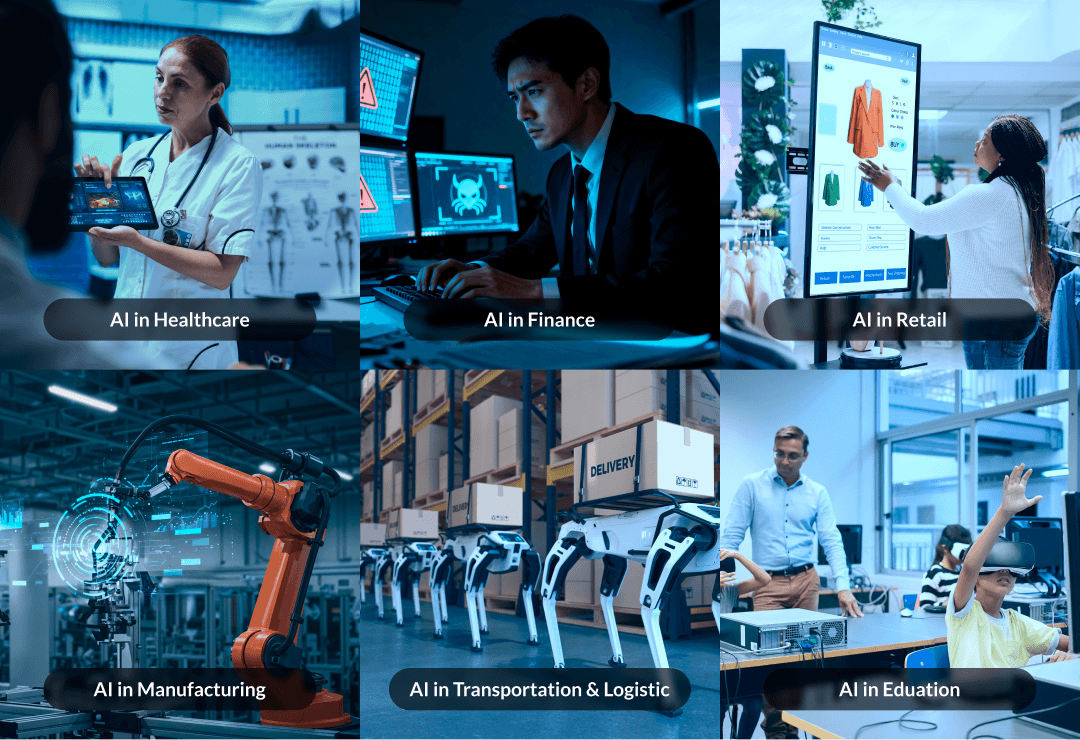
The adoption of next generations AI, especially generative AI, brings significant challenges related to security and ethics. Addressing these challenges is crucial to ensure responsible and sustainable use of the technology.
In other words, it involves examining the challenges companies or industries face when adopting the latest AI technologies, particularly concerning security and ethics.
- Security
The cybersecurity landscape is entering a new phase, much faster, more ruthless, and uncompromising.
While a few years ago organizations felt safe with monthly patch schedules, today that pace is no longer sufficient.
The speed of attacks surpasses what humans can counter, and by 2026, analysts predict this trend will reach its peak, ushering in an era of machine-speed security. Next generation AI introduces risks such as:
• Leakage of sensitive data
• Cyberattacks leveraging AI
• Model manipulation (e.g., data poisoning)
• Use of AI without strong privacy safeguards.
Companies must ensure that AI is safely deployed and that data is protected.
- Ethics (Ethical Considerations)
Ethics is a set of moral principles that help us distinguish right from wrong. AI ethics is a multidisciplinary field that studies how to maximize the beneficial impact of AI while minimizing risks and harmful outcomes.
Ethical use of artificial intelligence (AI) means ensuring that it is developed and applied responsibly to support humanity, respect human dignity and rights, and minimize risks of discrimination and misuse.
Ai must be used responsibly, including:
• Avoiding bias in algorithms
• Ensuring AI decisions are explainable (explainable AI)
• Maintaining transparency in how AI operates
• Ensuring AI does not harm users
• Complying with global ethical standards and regulations
- Responsible AI Implementation in Business Operations
Implementing AI responsibly requires a strategic approach focused on ethics, transparency, and risk mitigation. The key strategies include developing a clear ethical framework, ensuring transparency and accountability and prioritizing data security and privacy.
To use AI safely, ethically, and effectively, businesses should adopt the following strategies:- Transparency & Explainability
Ensure AI operations are explainable (explainable AI) so that AI decisions can be understood by internal teams and customers. - Data Protection & Privacy
Apply high security standards, encryption, and clear privacy policies. User data must be safeguarded against misuse. - Bias Elimination
Regularly audit AI models to ensure they do not introduce biases against customers or specific groups. - Regulatory Compliance
Ensure AI adheres to laws and regulations, such as data protection, AI ethics, and applicable industry standards. - Human-in-the-Loop
Maintain human involvement in critical decision making to avoid full dependence on AI. - Continuous Monitoring & Evaluation
Continuously monitor AI performance to detect errors, anomalies, or data changes that may affect outcomes. - Ethical Data Usage
Only use data obtained lawfully and with clear consent. - AI Systems Security
Protect models from threats such as data manipulations attacks, model hijacking, and unauthorized access.
- Transparency & Explainability
Preparing Your Business For the Future Through AI-Driven Software Integration
Integrating artificial intelligence (AI) into your software solutions is a strategic step toward achieving efficiency, innovation, and competitive advantage.
Future-Ready Business Strategies with AI Solutions
This means designing company plans and operations that leverage AI to address technological changes, evolving customer needs, and market dynamics in the coming years. With AI development, businesses can automate operational processes, making work faster and more efficient. AI also supports more accurate decision-making through predictive analytics and real-time data. From the customer perspective, AI enhances experiences by providing faster, more personalized, and relevant services.
Additionally, AI solutions open opportunities for new product and service innovations that create added value for the company. The technology also strengthens business resilience by predicting risks, detecting anomalies, and helping companies adapt more quickly to market changes. Overall, AI-driven strategies help businesses remain relevant, competitive, and ready for the digital future.
Digital Competitiveness through AI Adoption by Software Companies
This refers to a company’s ability to gain a market edge by leveraging AI in their products, services, and internal processes. By integrating AI, software companies can build smarter, more efficient, and automated solutions from data-driven applications and predictive analytics systems to automation platforms that enhance client productivity.
AI also accelerates innovation, enabling companies to respond to market trends faster and create more relevant products. Additionally, using AI in internal processes such as software development, automated testing, and bug detection improves product quality while reducing operational costs. Overall, AI adoption becomes a crucial foundation for software companies to remain competitive, attract more customers, and lead in the era of digital transformation.
Preparing for Technological Disruption in Business Operations
This means ensuring that companies are ready to adapt when new technologies emerge that significantly change workflows, operational processes, and business models. Technological disruption such as AI, automation, IoT, and machine learning can accelerate processes, reduce costs, or even replace outdated and efficient methods.
To navigate these changes, businesses need flexible systems, a willingness to innovate, and enhanced digital capabilities within their teams. Companies must also leverage new technologies to optimize workflows, mitigate risks, and improve customer service. With this readiness, businesses can not only survive amidst change but also capitalize on new opportunities and strengthen their competitive position in the market.
In the era of the 2026 AI Revolution, technology is evolving at an unprecedented pace, and businesses are required to adapt faster than ever. Partnering with a visionary software development company is a strategic move, as they possess the expertise to effectively integrate AI into your systems, products, and business operations.
Innovative development companies not only understand the latest AI trends but can also design solutions that are scalable, secure, and aligned with industry needs. With their support, businesses can accelerate digital transformation, increase efficiency, create better customer experiences, and unlock new growth opportunities.
Ultimately, such partnerships help companies not just survive technological change but lead the competition and thrive in an increasingly complex digital landscape.
Looking for higher efficiency, intelligent automation, and competitive advantage?
Start your AI journey with us BTS.id team. Let's create AI solutions tailored to your business needs. Consult your project today with our BTS.id team.
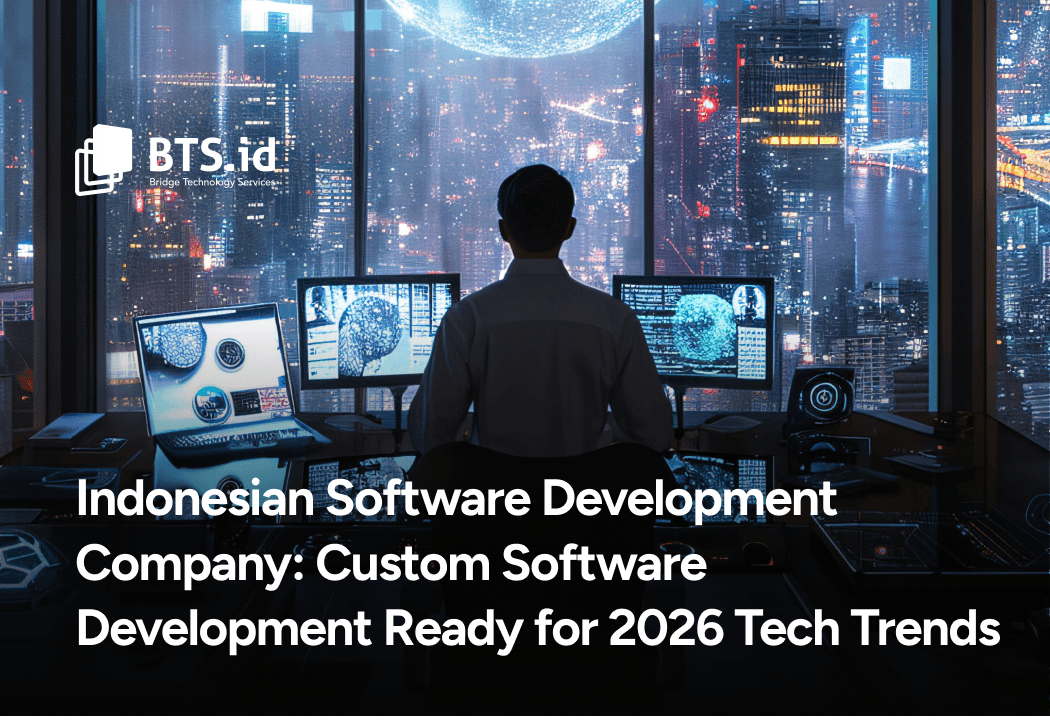
New year brings new challenges and new enthusiasm for business and technology players who must keep pace ever-evolving innovations. This is especially true for software development companies, where custom software development must continuously adapt to emerging technology trends to stay relevant and support faster business processes in the digital era.
Technological progress toward 2026 is accelerating rapidly, driven by the rise of autonomous artificial intelligence (AI), enhanced connectivity, and the convergence of multiple innovations. As 2026 approaches, the technology landscape continues to evolve at an unprecedented pace. According to 2026 tech trend reports, the rapid advancement of new technologies in the coming decade promises a revolution across all sectors.
Instead of progressing gradually, these changes will occur exponentially, where each technological breakthrough fuels further innovation across industries. From artificial intelligence (AI) to the interconnectivity of the Internet of Things (IoT), these trends hold immense potential to revolutionize industries and enhance the overall quality of life, reshaping the way we live, work, and interact with the world around us.
Let's examine some key aspects that illustrate the rapid development of technology towards 2026:

- Voice and Conversational AI
AI technology is now taking the lead in the tech world. Beyond professional applications, AI has become both a shortcut and a trend in everyday life. Its human-like nature and ability to adapt to user needs make AI an effective time saving tool. This early advancement is set to become a major breakthrough in 2026, evolving into intelligent virtual assistants for businesses.
Some examples include:
• Acting as customer service agents to handle basic inquiries or complaints.
• Assisting with office tasks such as data analysis, summaries, and conclusions.
• Taking meeting notes.
• Generating ideas and supporting brainstorming sessions.
• Developing into voice bots for automated communication.
Therefore, integrating voice and conversational AI is highly recommended as part of your company’s digital transformation strategy for 2026.
- Personalized Marketing with AI
CRM (Customer Relationship Management) applications are already widely used across many companies. With the advancement of AI technology in 2025, CRM systems can now be integrated with AI to further accelerate business processes.
Some of the key benefits include:
• Analyzing customer behavior based on purchase history and search patterns.
• Providing customer preferences through predictive insights.
• Helping marketing and sales teams focus on the hottest leads for retargeting.
By adopting this 2026 tech trend, your marketing and sales teams can focus more strategy, communication, and direct customer engagement, enabling smarter and more personalized business growth.
- AIoT (Integration of AI + IoT)
The Internet of Things (IoT) connects electronic devices to the internet, making it easier for people to interact with technology in their daily lives. Examples include smartwatches, CCTV cameras that can be monitored remotely, and automatic light sensors that turn on at night.
By 2026, combining IoT with AI will significantly enhance its capabilities, making business operations smarter and more efficient.
When your company adopts AIoT, it becomes easier to monitor systems remotely and perform multitasking, as real-time alerts will automatically notifications whenever an issue arises. This integration not only improves efficiency but also helps organizations respond proactively to challenges in their operations.
- Trying Virtual Products with AR (Augmented Reality)
The rise of e-commerce has successfully transformed traditional shopping experiences that once required customers to visit stores and try products in person. Today’s e-commerce platforms offer a variety of features from customer reviews and package tracking to live streaming that allows real-time interaction between buyers and sellers.
Although Augmented Reality (AR) is not a new feature, only a few brands have adopted it so far. In fact, AR can significantly enhance user experience by allowing customers to virtually try products before purchasing, a key step that brings them closer to making a buying decision.
By implementing AR, businesses can not only improve customer satisfaction but also boost engagement and conversion rates in an increasingly competitive digital marketplace.
- Cybersecurity in a Hyperconnected World: Emerging Threats and Evolving Solutions
As our reliance on technology grows and the world becomes increasingly interconnected, the need for robust cybersecurity solutions has never been more critical. By 2026 tech trend, we can expect a significant rise in sophisticated cyberattacks targeting critical infrastructure, businesses, and individuals.
Some key impacts and solutions include:
• Cybersecurity Investment: Companies and governments must prioritize investment in advanced cybersecurity measures.
• AI-Powered Threat Detections: Implement AI-driven systems to detect and respond to threats in real-time.
• Zero-Trust Security Model: Adopt a zero-trust framework to minimize vulnerabilities across systems.
• Individual Awareness: Encourage individuals to protect their personal information online.
• Safe Digital Hygiene: Promote secure digital practices as part of everyday online behavior.
In this hyperconnected era, cybersecurity is not just a technical necessity, it’s a strategic foundation for building trust, ensuring resilience, and protecting the digital future.

In the rapidly evolving digital era leading up to 2026, technology has become the core foundation for every company striving to survive and grow. Amid these transformations, custom software development emerges as a key element for global businesses seeking to stay competitive.
Unlike off-the-shelf software, which offers generic functionalities, custom software is specifically designed to match each organization’s unique needs, workflows, and goals.
This tailored approach enables companies to build systems that fully support their strategy and long term vision.
One of the main advantages of custom software development lies in its flexibility and efficiency. Every feature can be customized to fit internal workflows, helping to streamline processes, reduce errors, and boost team productivity. Moreover, custom software can be seamlessly integrated with existing systems, creating a more unified and efficient digital ecosystem.
Beyond improving efficiency, custom software development also helps organizations enhance productivity by automating critical processes. Smooth system integration allows business to create a connected digital environment, strengthening collaboration and enabling faster, data-driven decision making.
From a security and scalability perspective, custom software gives companies full control over their systems.
Solutions can be designed to meet strict security standards and developed to grow alongside the business without disrupting ongoing operations.
Moreover, custom software development opens significant opportunities for innovation. By creating unique features and distinctive user experiences, businesses can establish a competitive advantage that is difficult for competitors to replicate.
Software development companies in Indonesia are now in a unique and strategic position to deliver futureready solutions. With a combination of highly skilled tech talent, competitive development costs, and deep understanding of global market needs, Indonesia has emerged as one of the most promising digital innovation hubs in Southeast Asia.
Supported by advances in digital infrastructure and the growing adoption of technologies such as AI, IoT, Cloud Computing and Data Analytics, software development companies in Indonesia are able to deliver solutions that are not only aligned with current business needs but also robust and adaptive to future technology trends.
An approach focused on collaboration, flexibility, and innovation makes Indonesian software developers ideal partners for global companies looking to accelerate their digital transformation with efficient, secure, and sustainable solutions.
Evolutions from Standard Software to Personal, Adaptive, and Scalable Systems
Rapid technological advancements have driven a major transformation in the world of software development.
While companies once relied heavily on generic, off-the-shelf software, the trend has now shifted toward more personalized, adaptive, and scalable solutions tailored to modern business needs.
Here are some stages of this evolution:
- From General Solutions to Greater Flexibility
Initially, standard software was chosen because it was easy to implement and had a relatively low upfront cost. However, as businesses grow and operational complexity increases, many organizations realize that generic solutions are no longer sufficient. Limitations in flexibility and customization lead companies to seek approaches that better align with their specific needs.
- Personalization as a Key Value Add
The rise of custom software development addresses this challenge. Each feature and module is designed to support a company’s unique workflows and strategies. This approach provides added value through higher efficiency, as the system is fully aligned with the organization's internal processes.
- Adaptability to Respond to Change
In a constantly evolving business environment, whether in terms of market trends, regulations, or technology, adaptability is a key factor. Adaptive systems allow companies to adjust to new developments without undergoing major overhauls, making the organization more resilient and ready to face technological disruptions.
- Scalability for Long-Term Growth
Sustainable business growth requires scalable systems. This means the system can expand alongside increasing users, data, or new features without compromising performance. Such an approach allows companies to broaden their business reach without the need to replace the entire digital infrastructure.
- Towards Intelligent and Integrated Systems
The next stage of this evolution is the creation of smarter, integrated systems that leverage technologies like AI, IoT, cloud computing, and data analytics. Software is no longer merely an operational tool but a strategic foundation that drives innovation, efficiency, and data-driven decision-making.
In this fast-paced digital era, businesses can no longer rely on traditional, stand-alone systems. Integration with modern technologies such as artificial intelligence (AI), cloud services, and real-time analytics is now a key requirement for maintaining competitiveness and operational efficiency.
Here’s the explanation:
- Artificial Intelligence (AI) for Smarter Decision-Making
AI has transformed the way companies operate by delivering automation and data-driven insights.
Through machine learning and predictive analytics, businesses can understand customer behaviour, predict market trends, and optimize internal processes. AI integration helps companies make faster and more accurate decisions, while reducing reliance on manual processes.
- Cloud Services for Flexibility and Efficiency
Cloud computing provides incredible flexibility for modern businesses. With cloud-based systems, companies can store, manage, and access data or applications from anywhere, regardless of device or location. In addition to reducing infrastructure costs, cloud services also enable real-time cross-team collaboration and easy scalability as the business grows.
- Real-Time Analytics for Rapid Response
In a competitive business world, real-time data is a critical asset. Integration with real-time analytics systems allows companies to monitor performance, customer behaviour, and market conditions in realtime, enabling them to respond quickly to changes. This approach helps companies make more relevant and targeted data-driven decisions.
- Integration as the Foundation of Digital Transformation
When AI, Cloud, and real-time analytics work together, companies can build intelligent, interconnected digital ecosystems. The result is increased productivity, cost efficiency, and greater innovation capabilities.
In other words, technology integration is no longer an option, but a strategic necessity. Companies that can harness the potential of AI, cloud, and analytics in an integrated manner will have a competitive advantage in facing future challenges and opportunities.
By 2026, software will become a strategic element that directly influences business direction, from decisionmaking and product innovation to customer experience.
Supported by technologies such as AI, data analytics, and automation, software will help companies identify new opportunities, accelerate growth, and create a competitive advantage in the global marketplace.
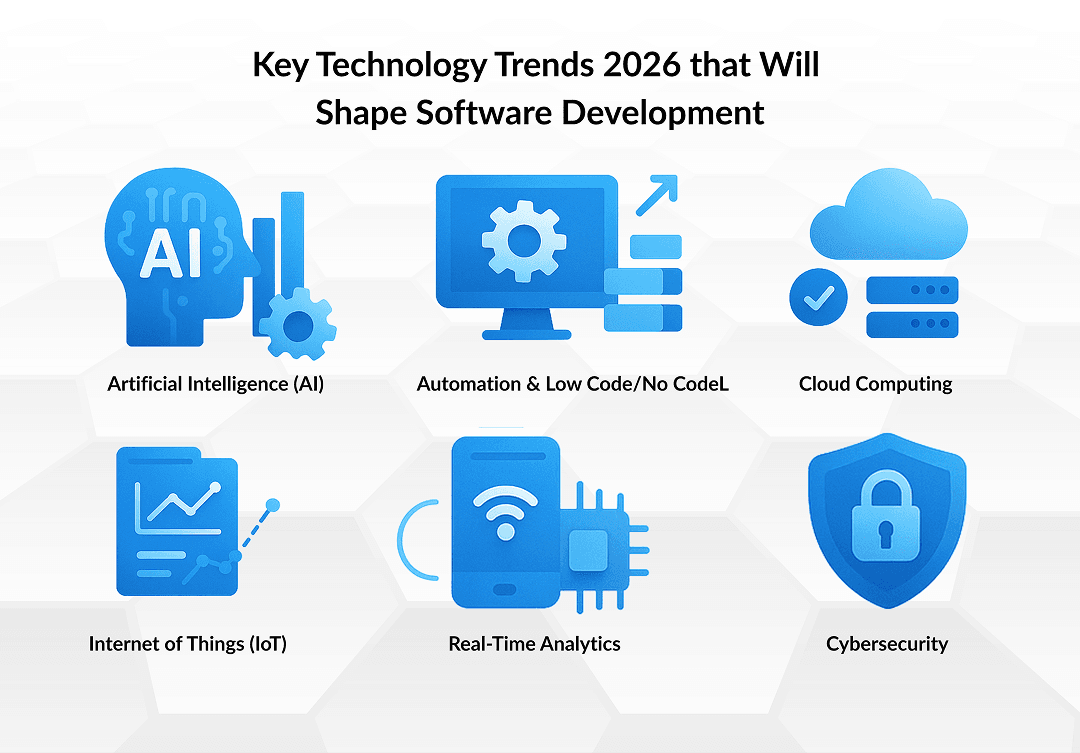
Key Technology Trends 2026 that Will Shape Software Development
As we approach 2026, the technology landscape continues to evolve rapidly, impacting how companies develop and utilize software. The following key technology trends are expected to play a decisive role in shaping the direction and strategy of software development in the future.
- Artificial Intelligence (AI): Delivering intelligent automation, predictive analytics, and data-driven decision-making.
- Automation & Low Code/No CodeL: Accelerating the application development process with greater efficiency.
- Cloud Computing: Providing flexibility, scalability, and ease of cross-location collaboration.
- Internet of Things (IoT): Connecting physical devices with digital systems for real-time solutions.
- Real-Time Analytics: Enables business to make quick decisions based on real-time solutions.
- Cybersecurity: A top priority with an AI-based protection system.
These trends indicate that future software development will become increasingly intelligent, adaptive, and integrated, making technology a key driver of business strategy.
Why Should You Choose a Software Development Company from Indonesia?
Choosing an Indonesian software development company offers many strategic advantages.
Here’s an explanation:
- High quality Talent
Indonesia has a large pool of professional software developers with expertise across various fields, from AI and mobile apps to cloud computing. - Competitive Development Costs
High quality work combined with cost efficiency compared to many other countries makes Indonesia an ideal choice for outsourcing or global collaboration. - Global Market Understanding
In Indonesia, many Indonesian software development companies have experience working with international clients, giving them a deep understanding of global business needs and standards. - Professional Standards and Agile Practices
In Indonesia, the use of Agile methodologies, transparent communication, and a results-focused approach makes projects more efficient and easier to manage. - Commitment to Security and Quality
Many companies in Indonesia implement international-grade security and quality controls to ensure product reliability. - Strategic Time Zone for Asia-Europe-US Coordination
With manageable time differences, Indonesian software developers can efficiently bridge communication across multiple time zones, enabling smoother global collaboration.
Custom software development enables businesses to create solutions that are tailored to their needs, flexible to technological changes, and ready to face future challenges. This approach allows companies to adapt faster, increase efficiency, and remain competitive in a continuously evolving digital era.
- Discovery: This stage ensures that solutions are built based on a deep understanding of business needs and goals, making the software truly relevant and strategically valuable.
- Design: System and interface designs are created to be efficient, user-friendly, and capable of adapting to evolving technology trends.
- Agile Development: The agile approach allows for flexible development, rapid adaptation to feedback, and continuous evolution in line with changing requirements.
- Scalability: Solutions are developed to grow alongside the business, handling increases in users, data, and integration with new technologies in the future.
This approach also includes integration with modern technologies such as AI, data analytics, and automation to ensure that the solutions developed are truly future-ready.
- AI helps improve efficiency and data-driven decision-making
- Analytics provides real-time insights to support smarter business strategies
- Automation accelerates operational processes and reduces human error.
By incorporating these three elements into every stage, from discovery to scalability, custom software development becomes more adaptive, efficient, and future-oriented, supporting sustainable digital transformation.
In a rapidly changing era, digital solutions must do more than meet current needs. Software should be designed to be easily updated, integrated, and enhanced, keeping pace with advancements such as AI, automation, IoT. and data analytics.
With a flexible and scalable foundation, custom software can continuously evolve, ensuring that businesses remain relevant, competitive, and prepared for future technological challenges.
As we move into 2026, technology will continue to advance rapidly, and only businesses that adapt through digital innovations will thrive.
Partnering with an Indonesian software development company means building solutions that are not only relevant today but also resilient and future-ready, as 2026 tech trends demand smarter and more adaptive software.
Indonesian companies are well-positioned to meet these needs by combining innovation and efficiency in every solution they develop. By establishing long-term partnerships, businesses can achieve sustainable digital growth and confidently embrace the future.
Ready to take your business into the digital era of 2026?
Partner with BTS.id, an Indonesian software development company dedicated to delivering innovative, efficient, and future-oriented custom solutions.
Contact BTS.id today and begin your journey toward sustainable digital transformation.
Let’s build your next custom software project designed for 2026 and beyond, and long-term success!
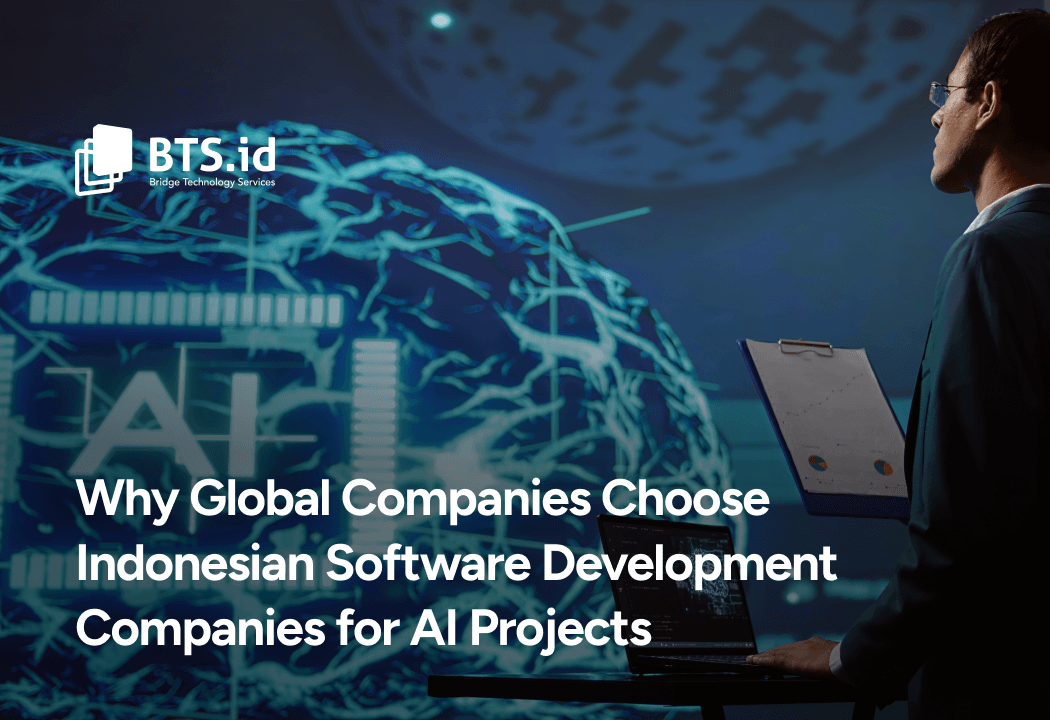
In recent years, the world has witnessed a significant surge in the adoption of Artificial Intelligence (AI) across various industries. AI powered software has now become an essential element in global digital transformation strategies, helping software development companies innovate faster, work more efficiently, and make smarter, data-driven decisions.
Artificial Intelligence (AI) is radically transforming the software development process by introducing tools and techniques that enhance productivity, accuracy, and drive innovation.
The global demand for AI-based software continues to grow in line with the acceleration of digital transformation across multiple sectors.
Businesses, from small enterprises to large corporations, are leveraging AI to improve operational efficiency, understand customer behaviour, and make more intelligent. data-driven decisions.
Technologies such as machine learning, natural language processing, and computer vision are increasingly being implemented in business solutions from process automation to the development of innovative products.
This trend demonstrates that AI is no longer just an additional innovation, but has become a core component of global growth and competitiveness strategies.
The demand for AI-based software is rapidly increasing as many organizations strive to improve efficiency, productivity, productivity. and decision-making capabilities.
Some of the key factors include:
- Global Digital Transformation: Companies across various sectors are racing to adopt technology to automate processes and enhance customer experience.
- Abundance of Data: The surge of data from digital activities, IoT, and social media creates vast opportunities for applying machine learning and predictive analytics.
- Advancements in Computing Technology: Access to more affordable cloud computing and GPUs has made AI implementation increasingly accessible.

The growing global demands for AI-based software has become one of the main drivers behind the surge in outsourcing and nearshoring practices within the software development industry.
Companies across various sectors are now racing to integrate AI into their systems but are facing challenges related to talent availability, costs, and development speed.
This is where the role of outsourcing and nearshoring becomes increasingly vital.
More and more companies around the world are choosing outsourcing or nearshoring for software development because these strategies offer efficiency, flexibility, and access to high quality global talent.
Why is that? Here’s the explanation:
- Cost Efficiency
One of the main reasons companies choose outsourcing is to reduce operational costs. By partnering with development teams from other countries with lower labor costs, companies can allocate their budgets to other business areas such as product innovations, marketing, or market expansion.
Nearshoring (outsourcing to geographically closer countries) also helps minimize logistics and communication costs without sacrificing efficiency.
- Access to Global Talent
The shortage of skilled professionals in technology, especially in software and AI development, has led companies to seek solutions abroad.
Through outsourcing of nearshoring, businesses can access experienced developers with specialized expertise, ranging from cloud computing and mobile development to cybersecurity, without the need for lengthy recruitment processes.
- Focus on Core Competencies
By delegating the development process to technology partners, companies can concentrate their internal resources on core activities such as business strategy, customer service, or product innovation.
This approach enhances productivity and accelerates time to market for new products.
- Scalability and Flexibility
Outsourcing offers companies a high level of flexibility to scale development teams up or down according to project needs.
This is especially beneficial in the dynamic technology industry, where project requirements can change rapidly.
- Nearshoring: A More Effective Collaboration Solution
Unlike traditional outsourcing, nearshoring enables easier collaboration due to similar time zones and work cultures.
This helps accelerate communications, reduce coordination barriers, and maintain the quality of development outcomes.
The growing global demand for AI-based software is driving Indonesia to become not only a potential market but also a producer of technological solutions.
Many local startups and AI software development company have begun developing AI-based solutions for various sectors, including finance, education, healthcare, and logistics.
This demonstrates that Indonesia is no longer merely adopting foreign technologies but is now actively contributing to creating digital innovations with global value.
Indonesia’s position as a leading technology hub in Southeast Asia has become increasingly strategic, establishing the country as one of the most dynamic tech centers in the region.
The rapid growth of the digital economy, the rise of innovation driven startups, and government support for digital transformation have made Indonesia an increasingly significant player in the global technology landscape.
Why Indonesian software development companies stand out?
Indonesian software development companies are gaining greater recognition on the international stage. With a combination of creative young talent, competitive developments, costs, and continuously advancing technological capabilities, Indonesia has successfully positioned itself as one of the leading software development hubs in Southeast Asia.
Here are some of the reasons:
- Competent and Adaptive Digital Talent
Indonesia has a large and growing base of digital talent.
Many young software developers possess expertise in modern technologies such as:
• Artificial Intelligence (AI) and Machine Learning
• Mobile and Web Development
• Cloud Computing and DevOps
• Cybersecurity
In addition, Indonesian developers are known for being highly adaptable to new technologies and quick to adjust to global market demands.
- Competitive Development Costs
One of Indonesia’s greatest advantages is its more cost efficient development rates compared to Western countries or even several other Asian nations.
This makes Indonesia an ideal destination for foreign companies seeking to outsource or nearshore their projects without compromising on quality.
- High work Quality and Professional Standards
An increasing number of Indonesian AI software development companies are adopting internationally recognized development practices, such as:
• Agile and Scrum methodologies
• Continuous Integration/Continuous Deployment (CI/CD)
• Rigorous Quality Assurance (QA)
Many companies also maintain a global portfolio with clients from the United States, Europe, and
Australia, demonstrating that the quality of their work is internationally recognized.
- Collaborative and Communicative Culture
Another advantage of Indonesian companies is their strong collaboration and communication skills.
Indonesian development teams are accustomed to working across time zones and cultures, enabling them to build productive working relationships with global clients,
Their professional, flexible, and service-oriented attitude is an added value that makes clients feel comfortable and confident in working together.
- Time Zone Advantage
Geographically, Indonesia is located in a strategic time zone, situated between Asia, Australia, and parts of the Middle East, making it ideal for cross-border collaboration.
This advantage allows Indonesian companies to:
• Provide faster technical support (real time support)
• Maintain 24-hour project productivity with a staggered workflow across time zones.
• Minimize communication barriers and waiting times, which are often challenges in long distance outsourcing projects.

In today’s fast-paced digital era, software quality and security are two of the most critical aspects for business success.
Software development companies in Indonesia (software house) now focus not only on delivering functional end results but also on ensuring that every solution they develop is secure, stable, and compliant with international standards.
Here’s how they maintain quality and security at every stage of development:
- Implementation of International Standards in the Development Process
Many Indonesian software development companies have adopted global standards such as:
• ISO/IEC 27001 for information security management
• ISO 9001 for quality management systems, and
• OWASP top 10 as a guideline for web application security
By implementing these standards, companies can ensure that every process from requirement analysis to deployment is carried out in a structured, measurable manner and in accordance with international best practices.
- Use of Agile and DevOps Methodologies
To maintain quality and efficiency, development teams in Indonesia widely employ Agile and DevOps methodologies.
• Agile enables continuous testing, allowing bugs or errors to be detected early.
• DevOps integrates development and operations teams, ensuring that the process from development and testing to deployment is fast while remaining secure and stable.
This approach results in products that are more flexible, reliable, and of high quality.
- Rigorous Quality Assurance (QA)
Every professional software development company has a Quality Assurance (QA) team responsible for ensuring the quality of each feature and module.
The QA process typically includes:
• Automated testing (unit tests, integration tests, regression tests)
• Manual testing for user experience (UI/UX)
• Performance testing to ensure application stability under high load
QA is not only conducted at the end of a project but is an integral part of the entire development lifecycle (SDLC)
- Security as a Priority from the Start (shift-Left Security)
The ‘shift-left security’ principle has now become a common practice in many Indonesian software development companies.
This means that security is not only considered at the end of a project but is implemented from the design and early development stages.
Measures taken include:
• Encrypted code and regular security audits
• Penetration testing to identify system vulnerabilities
• Implementation of two-factor authentication and encryption of sensitive data
With this approach, security risks can be minimized early, making the product far more resilient to cyber threats.
- Use of Modern Technologies and Tools
Software development companies in Indonesia in their efforts to deliver custom software solutions also leverage modern tools and frameworks to maintain quality and security, such as:
• SonarQube for code quality analysis
• Jenkins or GitLab CI/CD for automated testing and deployment
• Docker & Kubernetes for managing consistent and secure environments
The use of these technologies helps ensure that every application version is stable, tested. and easily traceable.
Quality and security are not just add-ons but the fundamental foundation of every modern software solution.
Indonesian software development companies have proven that they can combine technical expertise, global standards, and professional work ethics to deliver products that are secure, reliable, and competitive in the global market.
As the global demand for AI-based software continues to grow, many businesses are now seeking development partners capable of delivering innovative and impactful AI solutions.
With its rapidly growing technology ecosystem and competent digital talent, Indonesia has become a key destination for outsourcing or collaborating on AI development.
However, to ensure the success of your project, choosing the right software house is a crucial step.
Here are some tips to help you:
- Evaluate AI Experience and Portfolio
The first step is to review the company’s experience in handling AI-based projects.
Check whether they have a relevant portfolio, such as:
• Development of machine learning or deep learning systems
• Application of AI in data analytics, forecasting, or business process automation
• Integration of AI with IoT, mobile applications, or enterprise systems
Tips: Choose a company that not only ‘builds AI’ but also understands how AI can deliver real added value to your business.
- Check Technical Expertise and Technologies Used
AI development requires a strong combination of technical skills.
Ensure that the development team is proficient in:
• Programming languages such as Python, R, or JavaScript
• Popular AI frameworks like TensorFlow, PyTorch, or Scikit-learn
• Cloud infrastructure such as AWS, Google Cloud, or Azure AI Service
Experienced software houses are usually also capable of providing an end-to-end pipeline, from data engineering to mode; deployment.
- Consider the Quality of the Team and Local Talent
One of Indonesia’s main advantages is its abundance of globally qualified digital talent.
However, it is still important to assess whether the team handling your project has:
• Experienced AI specialist or data scientists
• Engineers who understand your business domain
• Communication and collaboration skills across time zones (time zones advantage)
The combination of technical expertise and soft skills will be a key factor in the success of your AI project.
- Communication and Transparency
AI projects require intensive communication between technical and business teams.
Ensure that the company has a clear and regular communication systems such as:
• Weekly sprint meetings or progress reports
• Access to real-time project dashboards
• Quick response to feedback
Transparent collaboration will accelerate decision-making processes and reduce miscommunication.
- Choose a Partner Who Understand Both Technology and Your Business Goals
This is a factor that is often overlooked, yet it is crucial.
Choose a partner who is not only technically skilled but also understands your business vision and objectives.
Why is this important?
• A successful AI project is not just about using advanced algorithms but about how the technology addresses real business needs.
• A partner who understands the business context can translate your company strategy into relevant technological solutions.
• They can also help you optimize your technology investment so that the outcomes truly deliver financial and operational impact.
For example, instead of immediately building a machine learning model, they would first analyze how an AI solution can enhance your business performance, such as production efficiency, customer experience, or market demand forecasting.
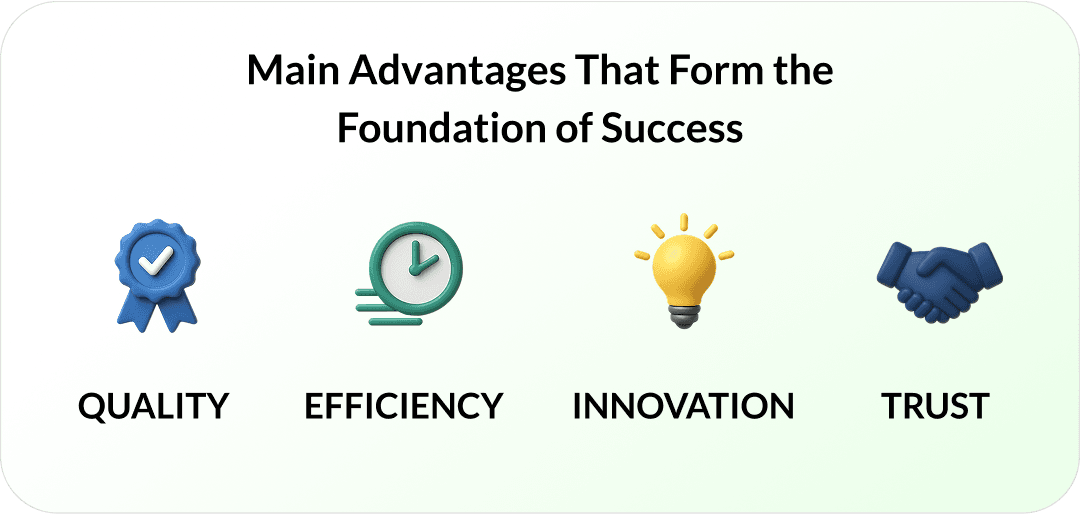
Indonesia now holds a significant position on the global technology map, particularly in software development and AI-based solutions.
With a combination of high quality digital talent, competitive development costs, and a continuously growing technology ecosystem, Indonesia offers strategic value that is hard to match in Southeast Asia.
Software development companies in Indonesia not only excel in technical capabilities but also increasingly understand the global business context, making them ideal partners for companies seeking to build innovative, secure, and high value AI solutions.
Additionally, the time zone advantage aligned with Asia and Australia, along with flexible communication with international clients, makes Indonesia a prime choice for long-term collaboration on advanced technology projects.
By choosing an Indonesian software house as your partner, your business gains more than just a development team, you gain a strategic partner ready to help drive digital transformation, improve efficiency, and accelerate AI adoption on the global scale.
In positioning Indonesia as a strategic partner for software development and AI-based solutions, there are four main advantages that form the foundation of success: quality, efficiency, innovation, and trust.
These four key pillars make Indonesia an increasingly significant player on the global stage:
- Quality: Adhering to international standards such as ISO and OWASP, with rigorous testing processes to ensure reliable and secure outcomes.
- Efficiency: Competitive development costs and smooth collaboration thanks to strategic time zones and responsive teams.
- Innovation: Actively developing AI, cloud, and IoT-based solutions, continuously experimenting to create new business value.
- Trust: Known for transparency, professionalism, and strong commitment to data security and client satisfaction.
With these four pillars, Indonesia is increasingly recognized as a trusted technology and AI development partner for global-scale digital projects and AI innovation.
Partnering with Indonesian developers means investing in the digital future of your business.
With technical expertise, continuous innovation, and a commitment to quality and integrity, Indonesian software houses are ready to become long-term strategic partners, helping you achieve sustainable success in the era of digital transformation and AI.
Indonesia has proven itself as a mature technology ecosystem, also outsourcing Indonesia has advanced and grown significantly.
with a unique combination of high work quality, cost efficiency, continuous innovation, and global professionalism.
With qualified talent, ongoing innovation, high flexibility, and a commitment to security and professionalism, development companies in Indonesia are capable of supporting your business growth alongside technological advancements.
This partnership ensures that you have digital solutions that are relevant, efficient. and adaptable, making Indonesia an ideal strategic partner in your journey of digital transformation and global AI innovation.
Ready to grow?
Let’s find the right software development company for your business partner with an Indonesian software house that understands your business needs and is ready to grow alongside you.
You can contact us at BTS.id, a trusted Indonesian software development company, ready to support your business in growing and thriving toward the future.
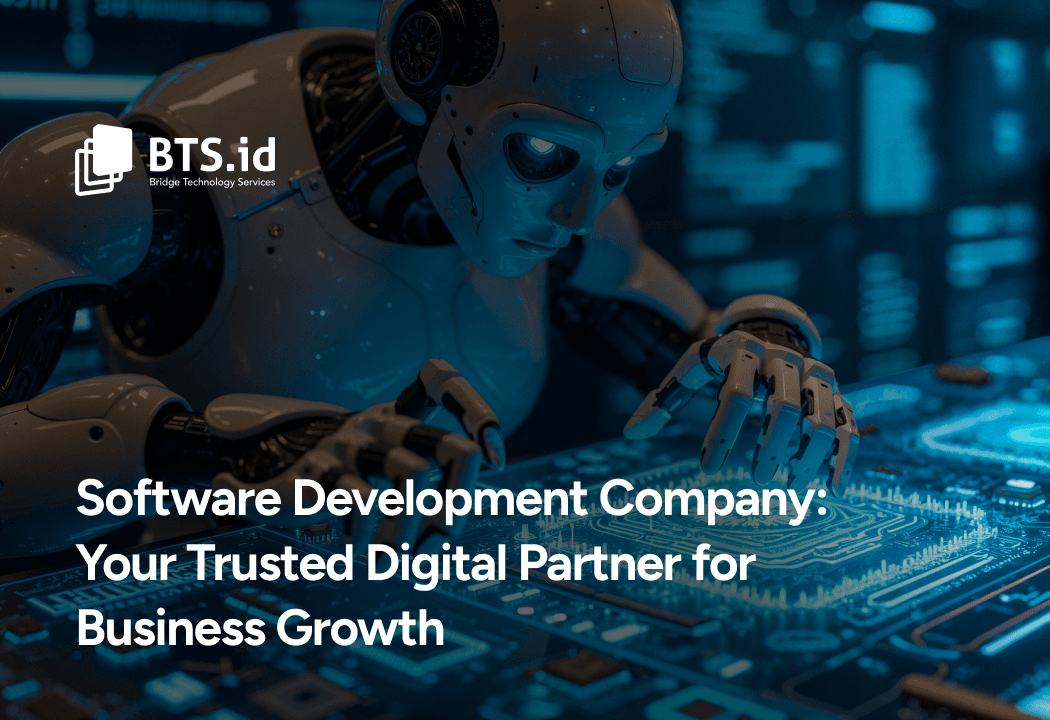
As software becomes increasingly integral to everyday life, software developers are starting to play a vital role in companies across various industries. Moreover, with the rapid acceleration of the digital era, technology is evolving quickly, and almost every aspect of our lives is now integrated with different types of software. From software developers more essential than ever both business and users.
A software development company is a business organization engaged in the design, development, testing, distribution, and maintenance of software products, ranging from customer applications, business solutions, to custom software tailored to client needs. These companies come in various types, such as consumer software developers (games and social media apps), enterprise software developers (ERP and CRM systems), as well as modifying existing ones to meet customer needs.
In short, a software development company acts as a digital partner that helps businesses innovate, improve efficiency, and grow through technological solutions.
Why do businesses need a software development company?
Businesses need software development companies because technology has become the backbone of nearly every industry today.
They rely on software development companies to obtain customized solutions, enhance efficiency and productivity, create competitive advantages, integrate existing systems, and strengthen security and compliance.
A software development company brings specialized expertise to build unique applications tailored to a business’s specific needs, often providing more effective and efficient solutions than off-the-shelf software.
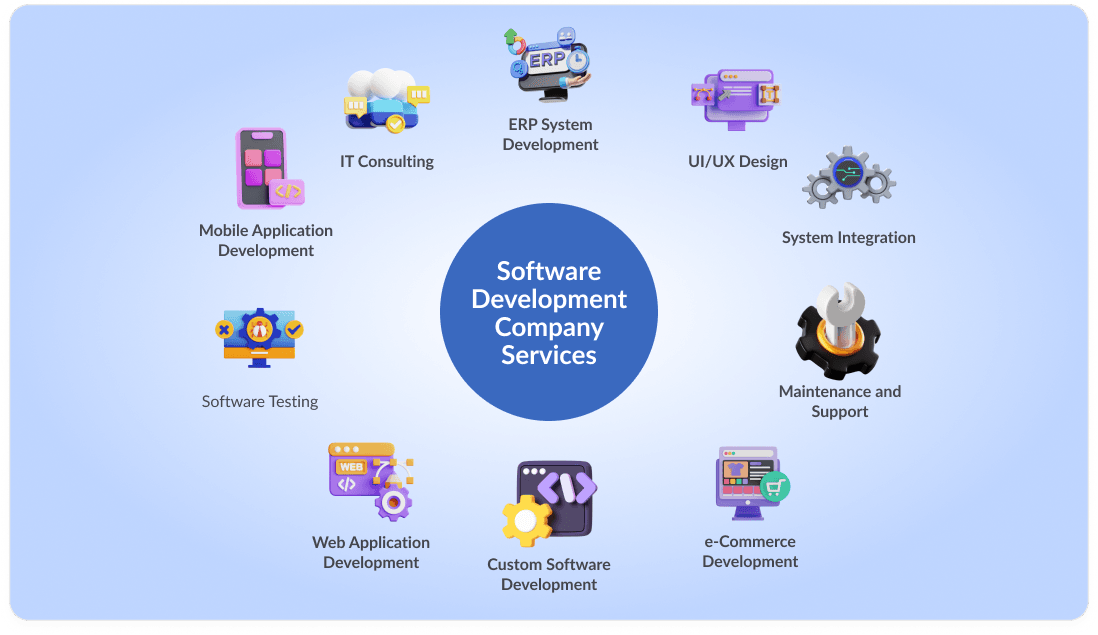
So, what services can a software development company offer?
Here are some of the main services typically provided by software developments companies:
- Custom Software Development
One of the key services offered is custom software development. A service that creates software tailored to the specific needs of clients.
Example: A custom inventory management system designed to handle the logistics requirements of a manufacturing industry. - Web Application Development
This service builds web-based applications that can be accessed through an internet browser.
Example: A project management platform for teams to collaborate and manage tasks online, such as Trello. - Mobile Application Development
Another key service offered is mobile application development.
A service that develops applications for mobile platforms such as iOS and Android.
Example: BCA Mobile or Mandiri online, which allows users to perform banking transactions from their mobile devices. - System Integration
A service that combines different systems and software to function in a unified way.
Example: Integration between a Customer Relationship Management (CRM) system and an Enterprise Resource Planning (ERP) system to automate data flow between sales and inventory management. - Maintenance and Support
Maintenance and support is the next key service offered.
Provides maintenance and support services to ensure software runs smoothly.
Example: Maintenance services for an e-commerce system to keep the website secure, functional, and regularly updated. - Software Testing
This service conducts testing to ensure the quality and performance of the software meet the desired standards.
Example: Mobile app testing services to check for bugs, security, and performance before the app is released on Google Play or the App Store. - IT Consulting
This service offers advice and strategies on effective technology implementation.
Example: Consulting for a company’s digital transformation process, including recommendations for the best software, IT infrastructure, and strong cybersecurity strategies. - ERP System Development
This service focuses on building Enterprise Resource Planning to manage various business processes.
Example: ERP systems such as SAP or Odoo, which integrate business functions like finance, human resources, production, and distribution. - UI/UX Design
This service aims to design intuitive and engaging user interfaces and user experiences.
Example: User design for streaming apps like Netflix to ensure users have an enjoyable experience while easily navigating the platform. - e-Commerce Development
This service builds e-commerce platforms for online sales.
Example: E-commerce platforms like Tokopedia or Bukalapak, which enable sellers to open stores and sell their products to consumers.

In the digital era, technology is no longer just a support tool, but has become the main foundation for business growth. To remain competitive and continue evolving, companies need the right technological support.
This is where software development companies serve as strategic partners.
Partnering with a software house is not only about creating applications but also delivering real benefits for businesses that aim to innovate and expand their reach.
Through this collaboration, businesses can combine specialized knowledge, pool resources, and accelerate the creation of new products.
The main benefits of working with a software development company as follows:
- Ensuring Quality and Expertise
The first benefit of partnering with a software house is access to skilled professionals with extensive experience in various technologies and programming languages.
They can be trusted to deliver accurate, high-quality, and innovative solutions tailored to your business's specific needs. - Saving Time and Costs
Developing software in-house requires significant investments in terms of time, cost, and human resources.
By using the services of a software company, you can save time and costs for recruitment and training, as the provided team is already trained and ready to work. - Ability and Focus on Core Business
By outsourcing software development to a software house, you can focus on your core business aspects without being distracted by the technical complexities and project management of software development.
This allows you to allocate resources and attention to business growth and key strategies while ensuring that your core competencies remain the priority. - Customized Solutions
Every business has unique needs. A software house can design custom applications that truly address your company’s specific challenges. - Innovation and Scalability
The digital solutions built are not only relevant for today but also flexible enough to support business growth in the future. - Competitive Advantage
With the right software, your business can stand out and gain an edge over competitors, both in terms of services and operational efficiency.
In today’s digital era, software is no longer just an additional tool but has become a key driver in boosting efficiency, enhancing customer experience, and expanding business opportunities. However, success in leveraging this technology largely depends on the software development company (software house) you choose as your partner.
To choose the right software development company, you need to evaluate their technical expertise and experience in your industry, review their portfolio and case studies of previous projects, ensure their capability to develop scalable and future-ready software, assess transparent pricing models as well as readiness for post-project support and maintenance, and most importantly, confirm alignment with your company’s culture and communication style.
With so many options available, you need to consider several key factors to ensure that your technology investment truly delivers maximum results.
Some of them include:
- Understand Your Business Needs
Before looking for a partner, make sure you are clear about the goals of the software you want to build.
Is it to speed up internal operations, provide better customer service, or open up new market opportunities? With clear needs, it will be easier to find the right company. - Review Portfolio and Experience
Check the projects they have previously worked on. A portfolio provides a real picture of their quality, creativity, and ability to handle different types of business. The more relevant their experience is to your industry, the greater the chances of your project's success. - Evaluate Technological Expertise
Ensure the company masters the latest technologies that suit your needs, whether it’s web applications, mobile apps, cloud solutions, or AI-based systems. The right technical expertise will guarantee software that is reliable, secure, and sustainable in the long term. - Consider Reputation and Client Testimonials
Look at reviews, case studies, or testimonials from their previous clients. This helps you assess the professionalism, consistency, and ability of the company to build long-term trust. - Development Methodology Used
Choose a company that applies modern methodologies such as Agile or Scrum. With these methods, the development process becomes more flexible, transparent, and adaptable to changes in your business needs. - Communication and Post-Project Support
Smooth communication is the key to successful collaboration. Ensure they are responsive, open in providing updates, and offer technical support after the software is completed. - Align with Budget and Added Value
While price is important, don’t just focus on the cheapest option. Also consider service quality, long-term support, and the added value they can provide to support your business growth.

Choosing the right software development company is a strategic step for business success in the digital era.
With the right partner, you don’t just get software, you gain digital solutions that support innovation, efficiency, and long-term growth.
Every business has its own challenges and opportunities. But one thing is certain: in the digital era, technology is the key to growth. Many companies across different sectors have proven that partnering with a software development company (software house) is not just about building applications, but about paving the way for innovations and business expansion
Here are some real-life examples to inspire you:
- Local Retail Store Becoming a National E-Commerce
In the past, a small store relied only on sales within its neighbourhood. After partnering with a software house and launching an e-commerce platform, the business was able to reach customers all over Indonesia. The result? Sales multiplied, and the once-local brand is now recognized nationwide. - Healthcare Clinic Undergoing Digital Transformation
A clinic that previously used manual systems for registration and medical records partnered with a software house. As a result, they now have a modern patient management system that makes processes faster, data more secure, and provides patients with a more comfortable healthcare experience. - Tech Startup Enhancing Customers Service
For a startup, user satisfaction is everything. With the support of a software house, they developed an intuitive, user-friendly mobile application. The impact? The number of active users skyrocketed, positive reviews increased, and customer loyalty grew stronger.
From small shops to large enterprises, every business can grow faster with the support of technology. A software development company is a strategic partner that helps businesses undergo digital transformation, enabling them to improve efficiency, expand their market, and achieve sustainable growth.
Every business starts with an idea. However, an idea itself is not enough to create real change. Proper execution, well-thought-out strategies, and a reliable digital partner are essential.
By partnering with the right software development company, your ideas can be transformed into digital solutions that are relevant, innovative, and have a direct impact on business growth. From improving operational efficiency, expanding markets, to creating better customer experiences, all can be achieved through strong collaboration with a trusted digital partner.
Remember, technology is not just a trend, it is the foundation of your business’s future.
It’s time to turn ideas into innovation, and innovation into real impact. Don’t delay your digital transformation.
Schedule a free consultation now and start your journey toward growth with us BTS.id, your trusted software house.
Let’s discuss with our expert team at BTS.id and discover the best digital solutions for your business needs.
WHAT’S ON TODAY TECH SCENE
BRIDGE TECHNOLOGY SERVICES

Peran Software House Indonesia dalam Transformasi Digital: Kunci Sukses Bisnis di Era Modern
Mengapa Transformasi Digital Penting bagi Bisnis di Indonesia?
Perkembangan teknologi bisnis modern dan perubahan perilaku konsumen mendorong bisnis untuk beradaptasi lebih cepat dari sebelumnya. Di tengah pertumbuhan ekonomi digital yang pesat, perusahaan dituntut untuk menghadirkan layanan yang cepat, efisien, dan terintegrasi. Inilah alasan mengapa transformasi digital menjadi agenda strategis bagi banyak bisnis di Indonesia.
Sebagai software house Indonesia, kami melihat transformasi digital sebagai fondasi utama pertumbuhan bisnis modern.
Digitalisasi bisnis membantu perusahaan meningkatkan efisiensi operasional, mempercepat proses kerja, serta menghadirkan layanan yang lebih responsif dan berbasis data.
Digitalisasi perusahaan Indonesia mencakup implementasi sistem seperti ERP, CRM, cloud computing, hingga otomatisasi proses.
Dengan kebutuhan teknologi bisnis modern yang terus berkembang, perusahaan yang melakukan transformasi digital akan lebih siap menghadapi persaingan dan perubahan pasar.
Bagi kami, transformasi digital bukan sekadar tren, melainkan investasi strategis jangka panjang untuk membangun bisnis yang scalable, kompetitif, dan berkelanjutan.

Software House Indonesia: Pengertian dan Layanan yang Ditawarkan
Di era transformasi digital, kebutuhan teknologi bisnis modern semakin meningkat. Software house hadir sebagai mitra strategis bagi perusahaan yang ingin mengembangkan sistem digital tanpa harus membangun tim IT internal sendiri.
Sebagai pengembang perangkat lunak lokal, software house membantu bisnis merancang dan membangun solusi teknologi yang sesuai kebutuhan.
- Apa Itu Software House Indonesia?
Software house Indonesia adalah perusahaan yang menyediakan layanan pengembangan perangkat lunak untuk berbagai
kebutuhan bisnis. Dengan memahami pasar lokal, pengembang perangkat lunak lokal mampu menghadirkan solusi IT
bisnis yang lebih relevan, efisien, dan scalable. - Layanan Yang Ditawarkan
Berikut adalah layanan utama yang biasanya disediakan oleh software house:- Custom Software Development
Pembuatan sistem khusus web application seperti ERP, CRM, sistem inventori, atau platform internal yang dirancang sesuai alur kerja perusahaan, serta mobile application seperti Cross-platform app (Flutter/React Native), aplikasi android dan iOS, juga maintenance & update aplikasi. Solusi custom memungkinkan perusahaan mendapatkan sistem yang lebih fleksibel, scalable, dan sesuai dengan alur kerja mereka. - Konsultasi IT
Pendampingan strategi teknologi, analisis kebutuhan sistem, serta perencanaan roadmap transformasi digital.
Konsultasi IT membantu bisnis meminimalkan resiko kesalahan investasi teknologi dan memastikan implementasi berjalan efektif. - Cloud & DevOps Services
Implementasi cloud computing, deployment otomatis, monitoring sistem, serta optimasi performa agar aplikasi stabil, scalable, dan siap digunakan dalam jangka panjang. - UI/UX Design
Perancangan tampilan dan pengalaman pengguna agar aplikasi atau website mudah digunakan, responsif, dan meningkatkan konversi bisnis. - System Integration
Integrasi berbagai sistem dan database agar seluruh operasional bisnis berjalan terhubung secara otomatis dan realtime.
- Custom Software Development
- Mengapa Memilih Pengembang Perangkat Lunak Lokal?
- Memahami kebutuhan dan regulasi pasar Indonesia
- Komunikasi lebih mudah dan responsif
- Biaya lebih kompetitif
- Dukungan teknis jangka panjang
Dengan meningkatnya kebutuhan digitalisasi, peran pengembang perangkat lunak lokal semakin penting dalam membantu perusahaan membangun sistem yang modern dan berkelanjutan.
Kelebihan Menggandeng Software House Lokal untuk Proses Digitalisasi
Dalam proses transformasi digital, memilih partner teknologi yang tepat sangat menentukan keberhasilan implementasi sistem.
Menggandeng software house lokal menjadi pilihan strategis karena menawarkan berbagai keunggulan yang relevan dengan kebutuhan bisnis di Indonesia
- Keunggulan Software House Indonesia
Salah satu keunggulan software house Indonesia adalah pemahaman yang kuat terhadap karakter pasar, regulasi, serta budaya bisnis lokal.
Hal ini memungkinkan pengembangan sistem yang lebih tepat sasaran dan sesuai kebutuhan operasional perusahaan.
Selain itu, komunikasi menjadi lebih mudah karena tidak ada kendala bahasa maupun perbedaan zona waktu yang signifikan. - Solusi Teknologi Lokal yang Efektif
Software house lokal mampu menghadirkan solusi teknologi lokal yang disesuaikan dengan kondisi infrastruktur dan kebutuhan industri di Indonesia. Pendekatan ini membuat sistem lebih fleksibel, scalable, dan siap mendukung pertumbuhan bisnis. - Efisiensi Biaya Pengembangan Aplikasi
Dibandingkan bekerja sama dengan vendor luar negeri, menggunakan software house Indonesia umumnya menawarkan efisiensi biaya pengembangan aplikasi. Perusahaan bisa mendapatkan solusi berkualitas dengan anggaran yang lebih terkontrol tanpa mengorbankan standar teknologi. - Dukungan Teknis Berkelanjutan
Keunggulan lainnya adalah dukungan teknis berkelanjutan. Software house lokal dapat memberikan maintenance, update sistem, hingga pengembangan lanjutan secara lebih cepat dan responsif.

Dampak Kehadiran Software House terhadap Inovasi dan Pertumbuhan Bisnis
Kehadiran software house memberikan dampak signifikan terhadap inovasi digital Indonesia dan pertumbuhan bisnis, terutama di era transformasi digital. Melalui pengembangan sistem yang terintegrasi dan berbasis teknologi, perusahaan dapat mempercepat adaptasi terhadap perubahan pasar.
- Dampak Transformasi Digital Bisnis
Software house membantu perusahaan mengimplementasikan solusi digital yang meningkatkan efisiensi, produktivitas, dan kualitas layanan.
Transformasi digital bisnis ini menjadi pondasi utama untuk menciptakan daya saing yang lebih kuat. - Akselerasi Inovasi Perusahaan
Dengan dukungan tim teknologi profesional, perusahaan dapat lebih cepat meluncurkan produk atau layanan baru.
Akselerasi inovasi perusahaan khususnya inovasi digital Indonesia terjadi karena proses pengembangan menjadi lebih terstruktur, berbasis data, dan scalable. - Kolaborasi Bisnis dengan Software House Lokal
Kolaborasi bisnis dengan software house lokal memungkinkan terciptanya solusi yang relevan dengan kebutuhan pasar.
Kemitraan ini tidak hanya fokus pada pengembangan sistem, tetapi juga pada strategi jangka panjang untuk pertumbuhan berkelanjutan.
Kehadiran software house bukan sekadar penyedia layanan teknologi, tetapi mitra strategis yang mendorong inovasi digital Indonesia dan mempercepat pertumbuhan bisnis melalui transformasi digital.
Kriteria Memilih Software House Terbaik di Indonesia untuk Transformasi Digital Anda
Transformasi digital membutuhkan partner teknologi yang tepat agar implementasi berjalan efektif dan memberikan ROI optimal.
Memilih software house tidak bisa dilakukan secara sembarangan, karena kualitas pengembang akan sangat mempengaruhi keberhasilan sistem yang dibangun.
Berikut beberapa tips memilih software house terpercaya yang bisa menjadi panduan:
- Periksa Portofolio dan Pengalaman
- Tinjau portofolio pengembang aplikasi terbaik untuk melihat jenis proyek yang pernah dikerjakan.
- Pastikan memiliki pengalaman di industri yang relevan.
- Cek studi kasus atau testimoni klien sebelumnya.
- Kemampuan Custom Software Development
- Pastikan software house mampu menyediakan solusi yang disesuaikan dengan kebutuhan bisnis.
- Perhatikan apakah sistem yang dikembangkan bersifat scalable dan fleksibel.
- Tanyakan teknologi dan framework yang digunakan.
- Dukungan Teknis dan Maintenance
- Pilih partner yang menyediakan dukungan teknis berkelanjutan.
- Pastikan ada layanan maintenance, update sistem, dan pengembangan lanjutan.
- Transparansi dan Komunikasi Proyek
- Pastikan timeline, biaya, dan ruang lingkup pekerjaan dijelaskan secara jelas.
- Evaluasi responsivitas dan profesionalisme tim.
Saat mencari rekomendasi software house, prioritaskan perusahaan yang tidak hanya unggul secara teknis, tetapi juga memahami strategi transformasi digital dan kebutuhan jangka panjang bisnis Anda.
Memilih software house yang tepat menjadi langkah penting dalam proses transformasi digital perusahaan. Rekomendasi software house terbaik didasarkan pada pengalaman, kualitas hasil kerja, dan kemampuan untuk menghadirkan solusi teknologi yang sesuai dengan kebutuhan bisnis Anda.

Rekomendasi Software House Indonesia
- Prioritaskan perusahaan dengan rekam jejak kuat dalam pembangunan aplikasi web dan mobile.
- Cari partner yang sudah terbukti membantu berbagai klien dari berbagai sektor industri.
- Pertimbangkan software house yang memiliki layanan lengkap, mulai dari konsultasi IT hingga custom software development.
Portofolio Pengembang Aplikasi Terbaik
Portofolio adalah cerminan kualitas dan pengalaman pengembang. Saat memilih software house, pastikan mereka memiliki:
- Proyek yang relevan dengan kebutuhan bisnis Anda
- Studi kasus yang jelas dengan hasil yang terukur
- Testimoni klien yang positif
- Contoh aplikasi yang fungsional, intuitif, dan scalable
Dengan memilih software house yang tepat dan melihat portofolio pengembang aplikasi terbaik, perusahaan Anda akan lebih siap menjalani transformasi digital yang efisien dan berkualitas.
Transformasi digital bukan lagi pilihan, melainkan kebutuhan strategis bagi bisnis yang ingin tetap relevan dan kompetitif.
Dengan dukungan software house Indonesia, perusahaan dapat mengembangkan solusi teknologi yang efisien, scalable, dan sesuai kebutuhan pasar. Kolaborasi yang tepat akan mempercepat inovasi, meningkatkan produktivitas, serta memperkuat daya saing di era digital.
BTS.id adalah salah satu software house di Indonesia, dan salah satu software house Bandung yang terpercaya, merupakan perusahaan yang bergerak di bidang pengembangan perangkat lunak dan solusi IT bisnis.
Sebagai software house Bandung, BTS.id mengembangkan aplikasi, menciptakan perangkat lunak yang disesuaikan dengan kebutuhan spesifik klien, serta menyediakan layanan pemeliharaan, pembaruan, dan perbaikan perangkat lunak.
Kami menawarkan solusi IT bisnis yang memudahkan bisnis anda untuk bertumbuh lebih cepat, efisien, dan aman.
Segera hubungi kami BTS.id sekarang untuk konsultasi IT dan mulai perjalanan transformasi digital bisnis Anda hari ini!

Why Choosing the Right AI Software Development Company Impacts AI ROI and Project Sustainability
The success of AI implementation depends not only on the models used, but also on the technical foundation behind their development. As an AI software development company, we understand that choosing the right development partner directly impacts AI ROI, system stability, and long-term project sustainability.
Scalable architecture, high-quality data, seamless system integration, and mature MLOps practices are key factors in ensuring that AI solutions operate reliably and deliver long-term business value.
Selecting the right Artificial Intelligence (AI) software development company is a critical strategic decision that has a direct effect on return on investment (ROI) and the long-term success of AI initiatives.
Understanding the Link Between AI Partner Selection and Project Outcomes
The right AI partner does more than just build models, it ensures strategic AI implementation through scalable architecture, reliable data pipelines, and mature MLOps practices. This approach enables AI solutions to grow sustainably and deliver long-term business value.
Why Is AI Partner Selection a Key Factor in the Success of Artificial Intelligence Projects?
- Solution Quality: Aligns business needs with a solid technical foundation from the start.
- AI ROI: Structured development ensures measurable and optimizable results.
- Project Sustainability: Scalable architecture and mature MLOps prevent technical debt.
- Strategic Partner: Acts as a long-term collaborator, not just a service provider.
- Strategic AI Implementation: Ensures seamless integration and real adoption across operations.
As AI becomes a key driver of competitive advantage, the choice of who builds your solution will ultimately determine how much ROI you can achieve.

The Role of Expertise: Quality Matters in Delivering Sustainable AI Solutions
The sustainability of AI solutions is largely determined by the quality of expertise involved throughout the development process.
AI expertise and technical proficiency enable scalable and sustainable AI solutions to be built on the right architecture, secure, robust, and ready to scale in production environments. Supported by experienced development teams, implementation complexity can be managed effectively, technical risks are minimized, and solution quality is maintained throughout the entire development lifecycle.
In addition, strong domain knowledge ensures that AI solutions address specific business needs rather than serving as mere technology implementations. Through strategic AI implementation, scalable solutions can be developed to support long-term growth and enhance AI investment value.
Ultimately, the success and sustainability of AI solutions depend on expertise, team experience, and deep domain understanding. With a solid technical foundation and scalable solutions, AI can evolve into a strategic business asset that delivers long-term value.
Assessing Long-Term Value: How the Right Partner Maximizes Your AI Investment
Assessing the long-term value of an AI project goes far beyond initial implementation. Choosing the right AI partner enables organizations to maximize AI investment value through cost-efficient execution, future-proof solutions, and a results-driven approach. By focusing on scalable and sustainable AI solutions, and and Strategic AI Implementation, AI projects can evolve into business assets that deliver measurable and sustainable impact over time.
- AI Return on Investment (ROI)
The right AI partner helps ensure that AI investments deliver clear, measurable business value and maximize AI Investment Value and AI Project ROI Measurement over the long term. - Cost Efficiency
Well-planned architecture and development processes reduce unnecessary costs and minimize the risk of rework. - Future-Proof Solutions
AI solutions are designed to be scalable and adaptable to technological advancements and evolving business needs. - Maximizing Value from AI Projects
Continuous optimization ensures AI initiatives go beyond one-time projects and continue delivering strategic value. - Measurable Results
A metrics-driven approach and performance evaluation enable organizations to monitor AI impact objectively and consistently, improving AI Project ROI Measurement.
Maximizing AI investment requires more than the right technology—it demands a partner who understands strategy, cost efficiency, and long-term value. With the right AI partner, organizations can ensure every AI initiative delivers measurable ROI, scalable and Sustainable AI Solutions , and sustainable business outcomes through Strategic AI Implementation.
Avoiding Common Pitfalls: What Happens When You Choose the Wrong Development Company?
Choosing the wrong AI development company is often a primary cause of AI project failure. Risks of poor partner selection can lead to architectural flaws, implementation delays, and solutions that are not production-ready. As a result, many AI initiatives end up as failed projects that never move beyond the early stages and turn into wasted AI investments, reducing potential AI project ROI measurement.
Beyond financial losses, the greater impact lies in missed business goals, where AI solutions fail to support business strategy and decision-making. When developers do not provide adequate support and maintenance, AI systems become difficult to maintain, lack scalability, and lose their long-term value. This highlights that selecting the right AI partner is a strategic decision that directly affects the success, sustainability, and delivery of scalable and sustainable AI solutions through Strategic AI Implementation.

Sustainability in Practice: Ensuring Ongoing Success Beyond Deployment
The sustainability of AI projects does not end once a solution is successfully deployed. To ensure AI continues to deliver business value enhance AI project ROI measurement, a long-term approach is required—one that includes ongoing support, performance optimization, and the ability to adapt to evolving business needs and technological changes. Implementing Scalable and Sustainable AI Solutions ensures AI remains valuable over time.
Key aspects to consider include:
- Sustainable AI Projects
AI solutions are built on stable and scalable foundations to support long-term use. - Long-Term Support Services
Ongoing support helps maintain system performance, security, and reliability. - Continuous Improvement in AI Systems
Regular enhancements ensure models remain accurate, effective, and relevant. - Adaptability to Changing Needs
Adaptive AI solutions are able to evolve alongside business growth and technological advancements.
With the right sustainability strategy in place, AI solutions go beyond post-deployment functionality and continue to deliver consistent, long-term business value.
Criteria for Selecting the Best-Fit AI Software Development Company for Your Business Needs
Choosing the right AI software development company is a strategic step to ensure that AI solutions truly support your business objectives. The evaluation process should not focus solely on technical capabilities, but also on experience, working approach, and alignment with organizational needs.
Key criteria to consider include:
- How to Choose an AI Company
Assess AI partners based on their strategic approach, technical expertise, and understanding of your business requirements. - Evaluating Vendors
Compare AI vendors objectively in terms of methodology, transparency, and long-term delivery capabilities. - Track Record and Case Studies
A proven track record and relevant case studies demonstrate a partner’s ability to address real-world challenges and deliver validated solutions. - Client Testimonials
Client feedback provides insight into reliability, collaboration quality, and overall satisfaction with delivered outcomes. - Alignment with Business Goals
The right AI partner aligns technical solutions with your business strategy and performance targets. - Transparent Communication
Open communication ensures clear expectations, effective risk management, and smooth collaboration throughout the project lifecycle. - Customization Capabilities
Strong customization capabilities allow AI solutions to be tailored to specific needs, avoiding one-size-fits-all approaches.

By applying the right criteria, companies can select an AI partner that not only develops technology but also understands the business context. This approach ensures AI solutions are relevant, sustainable, and deliver tangible value for long-term growth.
Choosing the right AI software development partner is a strategic decision that determines the success and sustainability of your AI investment. With a partner that possesses strong technical expertise, industry experience, and deep business understanding, organizations can maximize AI ROI, minimize project risks, and build scalable, sustainable AI solutions. The right approach ensures AI goes beyond a technical project and evolves into a long-term business asset.
If your business is ready to turn AI into a competitive advantage, now is the time to take a strategic step. Consult with our team at BTS.id and start building AI solutions that deliver measurable results and long-term value for your organization.

AI Software Development Company Strategies for High-Performance Machine Learning Systems: Unlocking Next-Level Results
In the era of digital transformation, the success of machine learning (ML) implementation is not determined solely by the sophistication of algorithms, but also by how systems are designed, developed, and integrated into business processes. This is where the role of an AI software development company becomes critically important. Experienced AI software development companies are able to bridge business needs with practical, scalable technology solutions.
AI software development companies play a vital role in ensuring the success of machine learning systems, not only from a technical perspective but also from a business strategy standpoint. They help organizations design machine learning systems that align with real business requirements, covering model selection, data architecture, and scalable infrastructure.
Through custom AI solutions, organizations move beyond one-size-fits-all implementations toward AI systems optimization designed around their unique processes, data assets, and strategic goals. Within enterprise AI development services for business, an experienced AI software development company ensures seamless integration of machine learning systems into complex enterprise environments, while upholding enterprisegrade standards for security, performance, and regulatory compliance.
A structured approach to Machine Learning project management further enables predictable delivery and measurable outcomes. From use case definition and data governance to model validation, deployment, and continuous performance monitoring, an end-to-end delivery model helps enterprises reduce risk, accelerate time-to-value, and maximize return on AI development services for business investment.
In the pursuit of high-performance machine learning systems, data is not simply an input, it is a strategic asset.
Without a robust, scalable, and well-governed data pipeline, even the most advanced ML models fail to deliver consistent results. For enterprises, building a resilient data pipeline is a foundational requirement to ensure long-term scalability, reliability, and sustained business impact from AI initiatives.

- Data Engineering Strategies That Drive Performance
The implementation of effective data engineering strategies enables organizations to manage data flows from multiple sources in a consistent and efficient manner. This includes data ingestion, transformation, and storage processes designed to support analytics and machine learning development services requirements. A welldefined strategy allows ML teams to focus on model development without being constrained by data-related challenges. - Data Preprocessing Best Practices
The performance of machine learning models is highly dependent on the quality of the data they consume. By applying data preprocessing best practices—such as data cleaning, normalization, handling missing values, and outlier detection—data is better prepared for ML algorithms. This stage plays a critical role in improving model accuracy, reliability, and overall stability. - Scalable Data Pipelines for Business Growth
As data volume and complexity continue to grow, machine learning systems require scalable data pipelines that can adapt without compromising performance. Scalable pipelines ensure efficient data processing for both batch workloads and real-time data streaming, enabling ML systems to evolve in line with changing business demands. - Data Quality Assurance as a Reliability Foundation
Without strong data quality assurance, the risk of errors, bias, and inaccurate predictions increases significantly.
Data validation processes, continuous quality monitoring, and automated testing within the pipeline help maintain data consistency over time while strengthening confidence in ML system outputs. - Feature Engineering for Machine Learning
Feature engineering for machine learning development services focuses on transforming raw data into meaningful, high-value features that enhance model learning. Well-designed features enable models to capture critical patterns within the data, leading to improved predictive performance and more efficient training.
Selecting the Right Algorithms and Architectures for Speed and Accuracy
Choosing the right algorithms and architectures is a primary determinant of success in building high performance machine learning systems. This decision directly impacts inference speed, prediction accuracy, and the efficient use of computational resources.
In modern machine learning development services, selecting appropriate algorithms and architectures is essential to achieving the optimal balance between processing speed and model accuracy. These choices have a direct influence on overall system performance, infrastructure efficiency, and the end-user experience
Key Considerations for High Performance Machine Learning Systems
- Algorithm selection strategies
Ensuring that selected algorithms align with data characteristics, system scale, and business objectives—recognizing that more complex models do not always deliver better results. - Neural networks optimization
Optimizing network structure, layer depth, and parameters to enhance performance without slowing down training or inference processes. - Deep Learning architecture
Selecting the right deep learning architectures enables models to efficiently learn complex patterns while maintaining stability in production environments. - Model tuning techniques
Techniques such as hyperparameter tuning, regularization, and early stopping improve model accuracy and generalization capabilities. - High performance machine learning frameworks
High performance ML frameworks support scalable, fast, and reliable model development, training, and deployment.

Optimizing Infrastructure for Scalability and Efficiency
In modern machine learning development services, model performance depends not only on algorithms but also on the underlying infrastructure. Optimizing infrastructure for scalability and efficiency is a critical factor in enabling AI systems optimization to grow alongside business demands without introducing excessive cost or complexity.
- Cloud-Based AI Infrastructure
The adoption of cloud-based AI infrastructure allows organizations to access computing resources flexibly and on demand. Cloud environments support rapid ML experimentation, automatic scalability, and seamless integration with data and analytics services—accelerating time-to-market for AI solutions. - GPU Acceleration in ML Systems
For compute-intensive workloads, GPU acceleration in ML systems plays a key role in speeding up model training and inference. By leveraging GPUs, ML systems can process large-scale data more efficiently, particularly for deep learning and complex model architectures. - Distributed Computing for Machine Learning
Through distributed computing for machine learning, computational workloads are distributed across multiple nodes or clusters. This approach improves data processing speed, enables parallel training, and ensures system stability as data volume and user demand continue to grow. - Containerization (Docker/Kubernetes)
Containerization using Docker and Kubernetes simplifies the deployment and management of machine learning systems. Containers ensure consistency between development and production environments, enable easy replication, and enhance security. Kubernetes further supports automated container orchestration for scalability and high availability. - Cost-Effective AI Deployment
Cost efficiency is a critical consideration in large-scale AI implementations. Cost-effective AI deployment is achieved through optimal resource utilization, autoscaling, infrastructure usage monitoring, and selecting cloud services that align with specific ML workload requirements.
Building High-Performance Machine Learning Systems: From Data Pipeline to MLOps Excellence
Amid the rapid adoption of artificial intelligence, many organizations are realizing that building reliable machine learning (ML) systems is not merely about using advanced models.
Machine learning development services success is driven by the combination of robust data pipelines, the right algorithm selection, scalable infrastructure, and mature MLOps practices. Key considerations include the following:
- MLops Workflow Automation
Automating MLops workflows simplifies processes across model training, testing, and deployment, reducing human error and accelerating the ML development lifecycle. - Continuous Delivery for Machine Learning Models (CI/CD)
Implementing CI/CD ensures that machine learning models can be continuously updated, tested, and released into production in a consistent and secure manner without disrupting live systems. - Model Monitoring Tools and Strategies
Real time model performance monitoring enables teams to detect accuracy degradation, data drift, or concept drift easily, ensuring prediction quality remains reliable. - Automated Retraining Pipelines
With automated retraining pipelines, models are regularly updated using the latest data, keeping ML systems relevant and adaptive to evolving data patterns. - Production Grade ML Systems
Mature MLops practices result in production ready ML systems that are stable, scalable, secure, and reliable enough to support long term business needs.

Security and Compliance Considerations in High-Performance AI Solutions
In the development of high-performance AI solutions, security and regulatory compliance are critical elements that must go hand in hand with system performance. Fast and accurate AI systems optimization must still protect data, models, and users from security risks and regulatory violations.
Key considerations include the following:
- AI Security Best Practices
The implementation of AI security best practices includes data protection, strict access controls, data encryption, and safeguarding models against threats such as data poisoning and model theft. These practices ensure AI systems optimization remains reliable without compromising performance. - Compliance in AI Projects (GDPR/CCPA)
In the context of compliance in AI projects, regulations such as GDPR and CCPA require transparent, secure, and responsible data management. Compliance efforts include consent management, data minimization, audit trails, and the ability to explain how data is used throughout AI processes. - Secure Model Deployment Strategies
Secure model deployment strategies ensure that ML models can be operated in production environments without security vulnerabilities. This includes environment isolation through containers, secure API access, runtime monitoring, and strict model version control. - Bias Mitigation in Machine Learning Systems
Beyond technical security, ethical considerations are equally important. Bias mitigation in machine learning systems aims to reduce data and model bias through fairness evaluation, balanced data sampling, and continuous validation ensuring AI outcomes are more equitable and trustworthy.
The success of machine learning system development is not determined by technology alone, but also by effective team collaboration.
- Cross functional teams play a critical role in accelerating innovation by bringing diverse expertise together within a single, integrated workflow.
- In collaborative development teams in AI projects, data scientists, software engineers, ML engineers, and business stakeholders work together from the planning phase through deployment. This collaboration accelerates decision-making, reduces miscommunication, and ensures AI solutions are closely aligned with business objectives.
- The adoption of Agile methodologies for software development companies building ML systems enables rapid iteration, controlled experimentation, and more responsive adaptation to changing data and market demands. Agile approaches also support more efficient and measurable ML development
- In addition, interdisciplinary expertise (data scientist and engineers) ensures that developed models are not only statistically accurate but also system-optimized and production-ready. This cross-functional synergy is a key driver in accelerating innovation and delivering AI solutions with tangible impact.
- Ultimately, faster time to market and business impact are achieved as cross-functional collaboration accelerates the delivery of high-quality AI solutions that generate real business value.
Achieving outstanding machine learning performance requires more than advanced technology alone. It demands proven strategies from robust data management and the right algorithm selection to scalable infrastructure, mature MLOps practices, and strong cross-functional collaboration.
By partnering with an experienced AI software development company, businesses can accelerate innovation, minimize implementation risks, and ensure machine learning solutions are production-ready and capable of delivering measurable business impact. Now is the time to apply the right strategies to build reliable, efficient, and future-ready machine learning systems.
Transform your data into a competitive advantage.
Partner with a trusted AI software development company like us BTS.id to accelerate innovation and deploy production-grade machine learning systems at scale.

How a Software Development Company Helps Businesses Adapt to AI and Cloud Trends in 2026
2026 marks a crucial year for software development companies, where Artificial Intelligence (AI) and the cloud are no longer just trends but the core foundations of business transformation.
In business technology trends 2026, business technology will increasingly focus on artificial intelligence, the cloud, and intelligent automation.
Companies are leveraging Artificial Intelligence for faster and more accurate decision making, while the cloud is the foundation for flexible, secure, and easily scalable systems. This technology integration helps businesses improve efficiency, accelerate innovation, and remain competitive amidst rapid market changes. The role of software development companies is not merely as technology vendors, but as strategic partners helping clients adapt and grow in the digital era.
Business technology trends for 2026 will be driven by the acceleration of digital transformation, where companies are transforming their work practices, business models, and services through technology. In this process, businesses must adapt to Artificial Intelligence (AI) to improve efficiency, automation, and decision making quality.
Meanwhile, adopting cloud solutions is a key foundation for more flexible, scalable, and AI-ready business systems.

- Business Technology Trends 2026
Business technology trends in 2026 demonstrate a shift from mere technology adoption to strategic technology utilization. Key focuses include:
• Artificial Intelligence (AI) and Generative AI for data analysis, automation, and service personalization.
• Cloud-native and Hybrid cloud as business infrastructure standards
• Hyper Automation to accelerate end-to-end operational processes.
• Zero trust based cybersecurity as digital risks increase.
These trends emerge as businesses are required to be more agile, efficient, and adaptive to market changes. - Adapting to AI
Adapting to Artificial Intelligence means integrating AI into core business processes, such as supply chain, customer service, marketing, and product development, using AI for data-driven decision making, and preparing human resources, processes, and governance for the ethical and effective use of Artificial Intelligence.
Without AI development, digital transformation in 2026 will be slow and suboptimal. - Embracing Cloud Solutions
The cloud is the technical foundation that enables AI and digital transformation to thrive. Its key benefits are:
• Scalability to adapt to business needs.
• Agility in application development and deployment.
• Cost efficiency through a pay-as-you-go model.
• Security and reliability continuously improved by cloud providers.
Without the cloud, AI implementation would be expensive, slow, and difficult to develop.

These four concepts form a mutually supportive ecosystem, where businesses that want to survive and thrive in 2026 must implement AI- and cloud-powered digital transformation, not as a mere technology project, but as a long-term strategy for competitive advantage.
In the ever-evolving digital era, digital transformation is key for businesses to remain relevant and competitive.
In this process, software development companies play a crucial role as strategic partners, helping companies adopt technology effectively and sustainably.
- Software Development Partners as Strategic Partners
As software development partners, software development companies not only build applications but also deeply understand business beads. They collaborate with clients to design technology solutions that align with business goals, improve operational efficiency, and support long-term growth. - Digital Transformation Services for Business Modernization
Through digital transformation services, software development companies help businesses modernize legacy systems, integrate technologies like AI and cloud, and automate work processes. These services enable companies to be more agile, responsive to market changes, and ready to face future digital challenges. - Tech Consulting Firms in Determining Technology Direction
As tech consulting firms, software development companies provide strategic guidance in selecting the right technology. From digital roadmap development and system architecture planning to technology risk management, this role ensures digital transformation is on track and delivers optimal ROI. - Custom Software Solutions for Specific Needs
Every business has unique processes and challenges. Therefore, custom software solutions are a crucial part of digital transformation. Software development companies design custom solutions tailored to their clients' industry and operational needs, ensuring technology truly impacts productivity and competitiveness.
Why Are Software Development Companies Important in Digital Transformation?
In digital transformation, the role of software development companies is crucial for:
- Helping businesses adapt to technological changes.
- Providing scalable and future-ready solutions.
- Strategically integrating AI development and the cloud.
- Increasing efficiency, security, and innovation.
The role of software development companies in digital transformation is crucial for modern businesses. As software development partners, digital transformation service providers, tech consulting firms, and custom software solution developers, they help companies transform holistically, not just following trends, but building a strong digital foundation for the future.
Navigating the Rapid Evolution of AI Technologies
The rapid development of Artificial Intelligence (AI) is transforming the way businesses operate across various industries. To remain competitive, companies need to understand how to leverage AI strategically, not just follow trends.
This is where Artificial Intelligence (AI) integration strategies, AI adoption, and machine learning consulting become crucial.
- AI integration Strategies for Effective Implementation
AI integration strategies help businesses integrate AI into existing systems and processes. This approach ensures AI technology runs in harmony with business infrastructure, from ERP and CRM to analytics systems, resulting in tangible business efficiencies and value. - Artificial Intelligence Adoption as Phased Process
Artificial intelligence adoption is not just about technology, but also organizational readiness. Businesses need to prepare data, human resources, and governance for sustainable AI adoption. A phased approach helps mitigate risks and ensures AI truly supports long-term business goals. - Machine Learning Consulting for Purpose-Built Solutions
Through machine learning consulting, businesses receive guidance in selecting the most relevant AI development models and use cases. Machine learning consultants help design solutions that are accurate, scalable, and aligned with industry needs, ensuring that AI investments deliver optimal ROI. - Automating Business Processes with AI
One of the greatest benefits of AI is automating business processes with AI. From chatbot-based customer service to predictive analytics and operational management, AI helps accelerate workflows, reduce costs, and improve productivity.
Navigating the evolution of AI requires a well thought out strategy and the right technology partners. By combining AI integration strategies, Artificial Intelligence adoption, machine learning consulting, and automating business processes with AI, businesses can maximize AI’s benefits and prepare for the digital future.
Leveraging Cloud Computing for Scalable Growth and Innovation
In an era of accelerating digital transformation, cloud computing has become a key foundation for businesses seeking to achieve scalable growth and drive continuous innovation. Beyond simply moving data to the cloud, the right cloud strategy enables companies to increase agility, cost efficiency, and long-term competitiveness.
Why Cloud Computing Is Key to Business Growth
Cloud computing enables businesses to:
- Adjust system capacity in real time.
- Accelerate product development and launch.
- Reduce reliance on physical infrastructure.
- Support the integration of AI, big data, and automation.
With a pay-as-you-go model, companies can optimize costs while maintaining operational flexibility.
Cloud Migration Services: The Foundation of Digital Transformation
Cloud migration services help companies move applications, data, and workloads from on-premises systems to the cloud in a secure and structured manner.
A well planned migration process includes:
- System and data readiness assessment.
- Determining the migration strategy (rehost, refactor, replatform)
- Post migration security and performance testing.
A successful cloud migration provides system stability while opening up opportunities for further innovation.
Cloud Native Applications: Driving Faster Innovation
Cloud native application development enables businesses to build applications specifically designed for cloud environments. With microservices architecture, containers, and an API-first approach, companies can deploy faster and more flexibly, increase scalability without downtime, and simplify integration with AI and analytics services.
Cloud-native applications are key to improving time-to-market and business responsiveness.
Multi Cloud Environments: Business Flexibility and Resilience
Adopting multi cloud environments allows businesses to use multiple cloud providers for different needs.
Key benefits include:
- Avoiding vendor lock-in.
- Improving systems resiliency and availability.
- Optimizing costs and performance.
A multi-cloud strategy also helps companies meet cross regional regulations and compliance requirements.
Cloud Infrastructure Management: Optimal Operations
Without proper management, cloud computing can become complex. Cloud infrastructure management plays a critical role in ensuring:
- Monitoring systems performance and security.
- Optimizing cloud resources usage and security.
- Enforcing security and backup policies.
Effective cloud management ensures systems remain stable, secure, and efficient as businesses grow.
Cloud Computing as an Innovative Enabler
Cloud computing not only supports growth but also enables innovation. With the cloud, businesses can develop new digital products faster, test ideas through prototyping and experimentation, and integrate AI, IoT, and data analytics in a scalable manner.
This allows companies to innovate without significant infrastructure risk.
Ensuring Security and Compliance Amid New Tech Trends
The rapid advancement of technologies such as artificial intelligence and cloud computing presents significant opportunities for businesses, while at the same time introducing serious challenges related to security and regulatory compliance. In 2026, ensuring digital system security and data protection is no longer merely a technical requirement, but a critical component of long term business strategy.
Within the context of cybersecurity for businesses 2026, cyber threats are becoming increasingly sophisticated, as many attacks now leverage automation and AI-based technologies.
Business systems connected to the cloud and processing large volumes of data require a more proactive security approach.
Zero-trust architecture, real-time threat monitoring, and robust protection of cloud infrastructure have become the new standards for safeguarding business continuity and maintaining customer trust.

As Artificial Intelligence (AI) and cloud adoption increases, regulatory compliance in AI and cloud computing has also become a major focus. Governments and regulators in various countries are tightening regulations regarding data protection, ethical use of AI, and transparency of digital systems.
Businesses are required to ensure that the technology they use complies with regulations from the planning and development stages. A compliance-by-design approach helps companies avoid legal risks while safely accelerating the adoption of new technologies.
Furthermore, implementing data protection strategies is a key foundation for maintaining security and compliance. Effective data protection includes strict access management, data encryption, and reliable backup and recovery mechanisms.
With a well-developed data protection strategy, businesses can minimize the risk of information breaches and ensure data remains secure throughout its lifecycle.
Security and compliance in the new technology era are no longer standalone entities; they are integrated into the overall digital transformation. By leveraging modern security technologies and a structured approach, businesses can innovate with AI and the cloud without compromising security or regulatory compliance.
Ultimately, ensuring security and compliance amidst emerging technology trends is crucial for maintaining a business's reputation, sustainability, and competitiveness. Companies that effectively manage security and regulatory risks will be better prepared to face digital challenges and capitalize on technological opportunities in 2026 and beyond.
The Importance of Custom Solutions Versus Off-the Shelf Tools in 2026’s Market Landscape
As we enter 2026, the business landscape is increasingly competitive, driven by the acceleration of digital transformation. Companies no longer compete solely on price or product, but also on technological capabilities that support speed, efficiency, and innovation. In this context, the choice between custom software development and off-the-shelf software becomes a strategic decision that directly impacts long-term business growth.
- Custom Software vs. Off-the-Shelf Software
Off-the-shelf software is suitable for general needs and rapid implementation, especially for businesses that require instant solutions without custom development. However, this type of software usually has standard features that are not always relevant to unique business processes.
Custom software development is designed around specific business processes and objectives, so the technology fully supports the company's way of working, rather than forcing the business to adapt to the system.
Generic software often limits flexibility as a business grows, due to limitations in customization, integration, and scalability as data volume and complexity increase. Custom solutions are more adaptable to changing business strategies, allowing for the addition of features, the integration of new technologies, and rapid market adaptation. - Tailored Business Solutions
- Adapting technology to a company’s internal workflow helps eliminate unnecessary manual processes and increase team productivity.
- Optimal integration with existing systems, AI, and the cloud allows data to flow seamlessly, supporting advanced analytics and intelligent automation.
- Supports long term scalability and growth because the system is designed to scale as the business grows.
- Improve operational efficiency and data visibility so management can make faster and more accurate decisions.
- Competitive Advantage Through Customization
- Delivers unique features that are difficult for competitors to imitate because solutions are developed based on the company’s internal needs and strategies.
- Increase innovation speed and time to market, enabling businesses to respond to market changes faster than competitors.
- Provides a more relevant and personalized customer experience, which directly impacts customer loyalty and satisfaction.
- Strengthens business positioning in competitive markets, especially in industries with high-tech competition.
- Strategic Value in the 2026 Market Landscape
- High flexibility in the face of technological and regulatory changes, including AI, cloud, and new data policies
- Greater control over data, security, and system roadmaps, reducing reliance on third party vendors.
- More sustainable long term investment, as systems can be continuously developed without requiring a complete platform replacement.
- Technology serves as an enabler of business strategy, not just an operational tool, thus supporting long term growth and innovation.
Choosing the right software development company is a strategic step for businesses in 2026, as technologies like AI, cloud computing and automation become increasingly complex. When choosing a tech partner, companies need to evaluate more than just price and portfolio. Understanding business needs, industry experience, and technological capabilities are key factors in assessing the right candidate.
When evaluating custom software development firms in 2026, it's important to look at their project track record, development approach, readiness for the latest technology trends, and commitment to security and scalability. Furthermore, asking potential vendors questions, such as their work methods, collaboration models, post-launch support, and adaptability, helps businesses select a technology partner capable of not only building solutions but also supporting long-term growth.
In short, choosing the right tech partner means choosing a strategic partner who understands the business vision and is able to deliver relevant, scalable, and future ready technology solutions.
As we enter 2026, business success is crucially determined by a company's ability to future-proof its business technology strategy. Adopting AI and the cloud is no longer just a technology project, but a core strategy for increasing efficiency, scalability, and sustainable innovation.
By partnering with experts for innovation success, businesses can adopt AI and the cloud in a more targeted, secure, and tailored manner. Support from experienced technology partners helps companies mitigate risk, maximize investment value, and build a digital foundation ready to face future technological changes.
Prepare your business for 2026 with the right AI and cloud strategy.
Partner with an experienced custom software development company to build solutions that are scalable, secure, and ready to support long-term growth.
Contact us at BTS.id now, and begin your digital transformation with expert guidance focused on tangible results.

Software Development Company Insights: Why AI Is Essential for Modern Manufacturing
In today’s modern manufacturing landscape, software is a core driver of efficiency, integration, and innovation.
As a trusted software development company, we go beyond building technology, we act as strategic digital transformation partners for manufacturing businesses.
We design and develop custom software solutions tailored to manufacturing operations, including production systems, inventory management, machine integration, and real time data platforms. Our solutions are built to support industry 4.0 initiatives, AI-driven automation, and smart factory environments.
Unlike off-the-shelf software, our custom manufacturing solutions are flexible, scalable, and secure designed to adapt to evolving market demands and operational complexity. Software serves as the critical link between business processes, industrial machines, and data intelligence.
We help manufacturers transform complex operational challenges into reliable, measurable, and future-ready software systems that improve productivity, visibility, and long term competitiveness.

Key contributions of a software development company in modern manufacturing.
- Development of integrated systems such as ERP, MES, and supply chain management tailored to factory workflows.
- Implementation of IoT and AI for real time production monitoring, predictive maintenance, and machine performance optimization.
- Automation and data analytics that enable data-driven decision-making, reduce downtime, and improve product quality.
- System security and scalability to ensure manufacturing operations remain reliable as the business grows.
In modern manufacturing, software development is the core of digital transformation. Without software, digital transformation cannot succeed, as every process from production planning to decision making relies on integrated digital systems.
- Software Development as the Foundation of Digital Transformation
Digital transformation in manufacturing begins with system modernization through software, software enables the digitization of manual processes, cross department data integration, and real time operation visibility. Systems such as ERP, MES, and industrial data platforms form the core foundation of this transformation.
- Software as the Driver of Manufacturing Automation
Manufacturing automation does not rely solely on machines, but on software that controls, orchestrates, and optimizes automated processes. Software plays a key role in:
• Automatically controlling production workflows.
• Integrating machines, robots, and IoT sensors
• Enabling data driven quality control and maintenance.
Without the right software, automation cannot be efficient or scalable.
- Software as the Brain of Smart Factories
Smart factories represent the highest evolution of modern manufacturing, with software acting as the central brain. Through AI development, analytics, and real time monitoring systems, software enables factories to:- Predict machine failures through predictive maintenance.
- Adaptively optimize production processes
- Respond quickly to changing market demands.
- End to End Integration for Future Ready Operations
Custom software development connects the entire manufacturing ecosystem from supply chain and production to distribution into a single integrated system. This creates operations that are more agile, efficient, and prepared to meet future industrial challenges.
Digital transformation provides strategic direction, manufacturing automation delivers efficiency, and smart factories enable operational intelligence. Software development serves as the connecting element between all three, making it a key factor in the success of competitive and sustainable modern manufacturing.
The Rise of Artificial Intelligence in Manufacturing Processes
The manufacturing industry is undergoing a major transformation driven by the increasing adoption of artificial intelligence in manufacturing.
Artificial Intelligence (AI) is no longer merely supporting technology, it has become a core component in creating production processes that are more efficient, intelligent, and competitive.
From automation to data driven decision making, Artificial Intelligence (AI) is reshaping how factories operate in the modern industrial era. Artificial intelligence (AI) plays an increasingly critical role in manufacturing due to its ability to process large volumes of data, identify patterns, and make fast, accurate decisions.
Artificial Intelligence in Manufacturing: The Foundation of Smart Manufacturing
AI development in manufacturing is used to improve production efficiency, product quality, and operational reliability. By leveraging data from machines, sensors, and production systems, artificial intelligence enables manufacturers to analyze production data in real time, identify operational patterns, and continuously optimize processes.
With the right software support, AI development helps increase productivity, reduce human error, and maintain consistent product quality forming the foundation of smart, data-driven manufacturing operations.
Industrial AI Applications for Operational Efficiency
The application of AI in industry spans multiple areas, including:
- Production data analysis to increase output and reduce waste
- Computer vision for automated quality inspection
- Supply chain optimization and production planning
Today, a wide range of industrial artificial intelligence (AI) applications are being implemented across manufacturing environments, from production analytics and computer vision based quality inspection to supply chain optimization.
These applications enable manufactures to make faster, more accurate while simultaneously reducing operational costs. Compared to manual approaches, AI driven solutions deliver greater speed, precision, and consistency in operational decision making.
AI-Powered Production Lines: Adaptive and Flexible Manufacturing
AI-powered production lines can automatically adjust production speed, workflows, and operating parameters based on real time data. The result is a production process that is more flexible, consistent, and capable of responding to changing market demand without compromising product quality.
By adapting dynamically to machine conditions, market demand, and material availability, AI-powered production lines, supported by intelligent software, become more scalable, resilient, and ready to handle the rapid pace of modern industrial change.
Predictive Maintenance: Reducing Downtime with AI
One of the most significant benefits of AI development in manufacturing is predictive maintenance. By analyzing historical data and current machine conditions, AI can predict potential failures before they occur.
This approach helps manufacturers reduce unexpected downtime, lower maintenance costs, extend asset lifespan, and improve overall operational reliability.
The Role of a Software Development Company in AI Manufacturing
As a software development company, we design, develop, and integrate AI solutions tailored to manufacturing needs. From industrial data processing and custom AI system development to seamless integration with ERP and MES platforms, software plays a critical role in ensuring successful AI adoption in modern factories. The rise of artificial intelligence (AI) in manufacturing processes marks a major shift towards smarter, more efficient, and data driven factories.
Key benefits of Integrating AI with Manufacturing Systems
Integrating Artificial Intelligence (AI) with manufacturing systems has become a strategic move for companies aiming to improve operational efficiency and competitiveness. By leveraging AI-driven efficiency, automation and real time data analytics, modern manufacturing operations can become smarter, faster, and more accurate.
Some of the key benefits include:
- AI-Driven Efficiency in Manufacturing Process
The first key benefit is AI-driven efficiency, which enables manufacturing systems to automatically optimize production processes based on real time data. AI helps streamline workflows, reduce bottlenecks, and improve machine utilization. The result is higher productivity without the need for significant additional resources. - Cost Reduction Through Automation
One of the primary benefits of AI integration is cost reduction through automation. AI reduces reliance on manual processes, minimizes human error, and lowers operational costs. In addition, AI-powered automation helps manufacturers reduce downtime, material waste, and unplanned maintenance expenses - Improve Product Quality with AI
Another important benefit is improved product quality with AI development, achieved through consistent quality monitoring and analysis. Using technologies such as computer vision and machine learning, AI can detect product defects in real time and ensure quality standards are consistently met.
This leads to higher customer satisfaction while reducing defects and rework. - Real-Time Data Analytics for Faster Decision-Making
AI integration enables real-time data analytics that provide full visibility into production conditions.
Data from machines, sensors, and production systems are analyzed instantly to support faster and more accurate decision-making. With data-driven insights, manufacturers can proactively respond to issues and opportunities. - The Role of Software Development Companies in AI Integration
Software development companies play a critical role in integrating AI into existing manufacturing systems. Through custom solution development, ERP and MES integration, and the deployment of secure and scalable AI technologies, software developers ensure that AI delivers measurable and sustainable business impact.
Challenges and Considerations When Implementing AI Solutions
Although Artificial Intelligence (AI) offers significant benefits to the manufacturing industry, its implementation comes with various challenges. Understanding AI integration challenges, data security in manufacturing, effective change management, and workforce upskilling is essential to ensure that Ai adoption is successful and sustainable.
Here is a detailed explanations:
- AI Integration Challenges in Manufacturing Systems
One of the main challenges is integrating AI with existing manufacturing systems. Many companies still rely on legacy systems that were not designed to support modern AI technologies. Without proper software architecture planning, this integration can lead to technical complexity, operational disruption, and limited scalability. - Data Security in Manufacturing
AI implementation requires large volumes of data, including sensitive production and operational information. Data security in manufacturing environments is a critical concern due to the increasing risk of data breaches and cyberattacks. AI systems must be built with high security standards to protect data and ensure uninterrupted factory operations. - Change Management for Manufacturers
AI-driven transformation is not only a technological shift but also a cultural one. Change management becomes a major challenge for manufacturers accustomed to conventional processes. Without clear communication and a structured adoption strategy, internal resistance can hinder the successful implementation of AI. - Workforce Upskilling with AI
AI adoption demands new skills from the workforce. Workforce upskilling with AI is essential to ensure employees can work effectively alongside intelligent technologies. Training and skills development are required to help teams leverage AI optimally, rather than feeling threatened by automation.

Software development companies play a critical role in helping manufacturers overcome these challenges through artificial intelligence strategy planning, custom software development, secure system integration, and support for change management and technical training. This approach ensures that artificial intelligence (AI) is not only implemented, but also delivers real and measurable business value.
Implementing AI solutions in manufacturing requires technological readiness, strong data security, effective change management, and workforce development. With the right strategy and the support of an experienced software development company, these challenges can be transformed into opportunities to build smarter, more efficient, and future-ready manufacturing operations.
The Role of Software Development Companies in Enabling Smart Manufacturing
Smart manufacturing lies at the core of industry 4.0, where digital technologies, automation, and artificial intelligence (AI) are integrated to create intelligent and adaptive manufacturing processes. In this transformation, software development companies play a strategic role as key enablers, bridging business needs, technology, and factory operations.
As technology partners, software development companies do more than build applications. They help establish sustainable digital foundations. With expertise in software engineering, AI, and industrial system integration, software development companies ensure that smart manufacturing delivers tangible business value.
- Custom Software Solutions for Industry 4.0
Every enterprise manufacturing company has unique processes, challenges, and business objectives. Therefore, custom software solutions for Industry 4.0 are essential to the success of smart manufacturing. Software development companies design tailored solutions such as ERP, MES, and IoT platforms that align with factory workflows, ensuring systems are flexible, scalable, and future-ready. - Collaboration with Software Developers as a Key to Transformation
Smart manufacturing cannot be achieved through technology alone, it requires close collaboration with software developers. Through a collaborative approach, software development companies help manufacturers translate operational needs into integrated digital solutions that are easy for internal teams to adopt and scale. - End to End Automation Services for Integrated Operation
Software development companies provide end to end automation services, covering requirements analysis, system architecture design, software development, and machine and data integration. This end-to-end approach ensures manufacturing processes run automatically, efficiently, and seamlessly within a unified digital ecosystem. - Tailored AI Implementation Strategies for Manufacturing
Implementing Ai in smart manufacturing requires a precise and measurable strategy. Tailored AI implementation strategies enable manufacturers to adopt AI gradually, based on their technological and business readiness. Software development companies play a key role in identifying high-impact AI use cases such as predictive maintenance, quality inspection, and production optimization
The role of software development companies is crucial in enabling smart manufacturing. Through custom software solutions, strategic collaboration, end to end automation services, and tailored AI implementation, manufacturers can accelerate digital transformation and remain competitive in the industry 4.0 era.
Future Trends: How AI Will Continue to Shape the Manufacturing Sector
Artificial Intelligence (AI) will continue to be a key driver in the evolution of the manufacturing industry. As technology advances and efficiency demands increase, the future of smart manufacturing will rely even more
on the integration of AI, data, and intelligent digital systems.
Software development companies play a vital role in adopting and integrating future AI technologies into manufacturing systems. Through custom software development, AI and IoT integration, and future-ready system architectures, software development companies help manufacturers remain relevant, agile, and competitive in a rapidly evolving industrial landscape.
Below are key trends shaping the future of AI-driven manufacturing:
- Future of Smart Manufacturing
The future of smart manufacturing is defined by factories that are increasingly autonomous, connected, and adaptive. AI enables manufacturing systems to monitor, analyze, and optimize production processes in real time. With scalable software support, factories can respond to changes in market demand with greater speed and precision. - Emerging Technologies in Factories
A range of emerging technologies in factories will accelerate manufacturing transformation, including generative AI, digital twins, intelligent robotics, and edge computing. These technologies enable production process simulations, improved machine efficiency, and more accurate data-driven decision-making. - Industrial IoT and Machine Learning Trends
Trends in Industrial IoT (IIoT) and machine learning will further strengthen connectivity and intelligence within manufacturing systems. IoT sensors collect data from machines and production environments, while machine learning analyzes this data to identify patterns, predict failures, and optimize operational performance. - Adaptive Supply Chains Powered by AI
Ai will also shape adaptive supply chains that are more flexible and responsive. Through predictive analytics and AI-driven forecasting, manufacturers can manage inventory more effectively, anticipate supply chain disruptions, and rapidly adjust distribution strategies based on real-time market conditions.
Artificial intelligence (AI) will continue to shape the future of the manufacturing sector through smart factories, emerging factory technologies, the integration of IIoT and machine learning, and adaptive supply chains. With the right digital strategy and the support of a software development company, manufacturers can leverage these trends to create sustainable long term competitive advantage.

Conclusion: Leveraging Expert Software Development and Advanced AI for Competitive Advantage in Manufacturing
In the face of increasingly intense industry competition, enterprise manufacturing companies must position an
AI-driven innovation strategy at the core of their business transformation. The effective use of AI and software
development not only improves operational efficiency but also unlocks opportunities for continuous
innovation.
- AI-Driven Innovation Strategy as the Foundation of Competitiveness
An AI based innovation strategy enables manufacturers to optimize production processes, improve product quality, and accelerate decision making. With a well planned approach, AI becomes a key enabler for creating long term business value and market differentiation. - Choosing the Right Digital Transformation Partners
The success of digital transformation heavily depends on selecting experienced digital transformation partners. A software development company acts as a strategic partner, designing digital architectures, integrating AI into manufacturing systems, and ensuring solutions are scalable, secure, and future ready. - Staying Competitive Through Technology Adoption
In the Industry 4.0 era, staying competitive through technology adoption is no longer optional, it is essential. Manufacturers that proactively adopt AI, IoT, and automation technologies are better prepared to respond to market changes, supply chain disruptions, and evolving customer demands. - Next Steps Toward Smart Manufacturing Solutions
The next steps toward smart manufacturing solutions begin with assessing digital readiness, identifying high impact AI use cases, and collaborating with software development companies that understand industrial requirements. This phased approach ensures transformation efforts are effective and deliver measurable result
By combining expert software development capabilities with advanced AI technologies, enterprise manufacturing companies can build a strong and sustainable digital foundation. This is the key to achieving competitive advantage, driving innovation, and ensuring long-term relevance in the future of the manufacturing industry.
Ready to Accelerate Your Smart Manufacturing Journey?
Partner with us BTS.id an expert software development company to unlock the full potential of AI-driven manufacturing.
From custom software solutions to advanced AI implementation, we help you build scalable, secure, and futureready manufacturing systems.
Talk to our experts today, and take the next step toward smarter, more competitive manufacturing.
TOP ARTICLE
BRIDGE TECHNOLOGY SERVICES
